

20 Social Skills Activities and Games for Kids
A child’s social-emotional development can determine their place in society. They learn how to communicate with and respond to others through interactions with their parents, teachers, and peers.
While socialization develops naturally, social skills activities for kids can support the learning process.
What are Social Skills Activities?
Social skills activities aim to improve a child’s ability to:
- Actively listen
- Communicate
- Problem-solve
- Take care of themselves and others
- Recognize and express their emotions
By engaging in these activities regularly, children improve their social competence and boost their confidence in social settings.
Benefits of Social Skills Activities for Kids
Developing social skills enables children to communicate more effectively and compassionately. There are also other distinct advantages, which include the following:
- Better relationships. Children with good social skills can relate to others on a deeper level. They can convey their thoughts productively and demonstrate empathy toward others.
- Self-reliance. When children can communicate effectively, they develop better problem-solving skills. They are more likely to ask for help and approach conflict resolution with confidence.
- Enhanced teamwork. Communicative children work better with others, as they can express their opinions and think creatively.
- Academic and career success. Team players naturally achieve greater academic success and are more prepared for workplace challenges. Social skills activities equip children with critical interpersonal skills essential for navigating future workplace complexities [ * ].
- Improved communication skills in children with autism. Children with autism experiencing difficulties interacting and understanding social cues can significantly benefit from social skills activities [ * ]. These activities help them practice essential social skills, develop empathy , engage in conversations, and build relationships.
20 Social Skills Activities for Kids
Providing children with opportunities to become better communicators and collaborators sets them up for future success. Here are 20 of the best social skills activities for kids.
1. Emotion Charades
People express emotions through more than just words, and playing emotion charades will help children better understand gestures.
Objective: To identify emotions and feelings
Instructions:
- Write a few emotions down on pieces of paper (for example, angry, sad, and happy).
- Have the children draw lots.
- Each child will act out an emotion and audience members will guess what they are portraying.
2. Friendship Bracelet Exchange
Crafting friendship bracelets is a fun activity that exercises creativity and provides opportunities for children to express appreciation for others.
Objective: To express gratitude to others
- Use materials like beads and charms to create friendship bracelets.
- Exchange the friendship bracelets and encourage your child to explain why they chose to give their bracelet to a specific person.
3. Conversation Jenga
Playing Conversation Jenga is an excellent way to introduce peers to each other and learn how to interact.
Objective: To break the ice and get to know peers
- Number the Jenga blocks and assign questions like “What is your favorite animal and why?” or “Who is your favorite superhero and why?”
- Play as you normally would, removing a block without toppling the tower.
- Answer each question.
4. Feelings Journal
Children shouldn’t feel obliged to share everything with their parents. However, having a safe space to express themselves is paramount to their mental health.
Objective: To reflect on feelings and responses
- Choose a journal. Let your child’s imagination run wild, decorating it in ways that speak to them.
- Encourage your child to free-write, allowing their thoughts to flow uninterrupted.
5. Cooperation Obstacle Course
Competition is healthy and natural amongst children, but cooperation is fundamental. Instead of testing a child’s speed and endurance, create an obstacle course that requires teamwork.
Objective: To foster teamwork and inspire critical thinking
- Set up a course that requires teamwork.
- Blindfold one child and appoint another to be their guide. Have the guide talk the blindfolded player through a maze.
- Add other teamwork-centric obstacles, like using pool noodles to carry balls from one bucket to another.
6. Role Reversal
People often learn best through experience, and providing an opportunity for your child to see life in someone else’s shoes can be surprising.
Objectives: To learn new perspectives and understand different roles
- Roleplay scenarios in which your child goes through your routine of preparing breakfast, going to “work,” and doing household chores.
- Ask them how they felt, what they liked, and what they found challenging.
7. Thank You Notes
Well-socialized children should know how to give and receive compliments. It’ll allow them to appreciate diversity among others.
Objectives: To express gratitude for others
- Provide card-making materials like card stock, markers, pens, ribbons, and stickers.
- Encourage your children to write notes to different people, like classmates, teachers, and school staff.
- Deliver the thank you notes in person.
8. Problem-Solving Skits
It can be challenging to anticipate when you might encounter a problem, but you can’t be too prepared. Enacting potentially tricky situations allows your child to consider their response in a safe environment.
Objective: To prepare your child for challenging situations that require conflict resolution
- Write a few scenarios on several pieces of paper and put them in a jar or bucket.
- Have your child pick a scenario from the bucket and reenact them. Consider scenarios like disagreeing with a friend or working on a difficult school project.
- Reflect on how the skit made your child feel and what they might have struggled with.
9. Story Chain
Story chains are an excellent way to exercise your child’s imagination while inspiring a sense of teamwork. They also exercise your child’s improvisational skills, as they require your child to create a narrative on the spot.
Incorporate our suggested social skills books into your child’s storytelling exercises—they might take inspiration from what they read!
Objective: To inspire creativity in a group setting
- Create a few cards featuring words, pictures, and topics like “family,” “zoo,” “baker,” or “vacation.”
- Have each child draw a card, adding onto an improvised story according to the topic written on the card.
10. Random Acts of Kindness Challenge
Performing acts of kindness shouldn’t be limited to people your child knows—everyone deserves to experience kindness! These acts can be simple and even unplanned.
Objective: To show respect to others, even strangers Instructions:
- Create a list of random acts of kindness like helping a neighbor tend to their garden or helping someone take their groceries to their car.
- Check off items on this list, aiming to achieve at least one a day.
11. Staring Contests
Maintaining eye contact plays a surprisingly essential role in conversation-making. It makes people feel more connected and comfortable. Staring contests can also enhance a child’s ability to focus on a task.
Objective: To improve focus and connections
- Sit across from each other in a comfortable space like the bedroom or living room.
- If your child is uncomfortable, place a sticker on your forehead for them to look at, gradually making eye contact as they relax.
12. Scavenger Hunts
In a scavenger hunt, children work together to solve puzzles and achieve a shared goal. You can up the stakes by providing a simple reward, such as a snack or toy.
Objective: To improve teamwork and organizational skills
- Set up your scavenger hunt in one space like the living room or garden. Hide several objects of your choice, like figurines or balls.
- Tell your children how many objects are hidden. Provide your children with clues. They can be riddles or descriptive clues.
- If you want to make the hunt more challenging, you can introduce a time limit.
13. Roll the Ball
Roll the ball is appropriate for toddlers, as it only requires simple movements. It’s a great way to get children to connect.
Objective: To introduce joint activities with other children
- Have your children sit across from each other in an open space.
- Ask your children to roll the ball back and forth from each other.
- With each roll, find ways to introduce conversation topics. For example, each child can share their favorite times of the day, their favorite cartoons, or their favorite foods.
14. Productive Debate
If you have older children, hosting a productive debate can be a healthy way to explore potentially controversial or challenging topics. By discussing these topics in a safe, controlled space, children can practice patience and develop thoughtful responses.
Objective: To learn how to have difficult conversations and achieve positive outcomes while being respectful
- Host a roundtable session for brainstorming debate topics. Consider topics like whether phones should be allowed in school settings, whether school uniforms are necessary, or whether curfew are helpful.
- Assign participants to different perspectives. Take turns making each point.
15. Simon Says
Simon Says is a classic children’s game that exercises their listening skills in a fun way. It also rewards good behavior and keeps children entertained.
Objective: To learn self-control and impulse control
- Have each child line up and assign a “Simon.”
- When “Simon” starts a command with “Simon Says,” everyone in line must follow. If a child follows Simon’s instructions without them saying “Simon Says,” they lose.
- Perform multiple rounds with different Simons.
16. Play Pretend
Unstructured, imaginative play allows children to explore different worlds and exercise their creative thinking. Especially at an early age, children with the time, space, and tools to let their imaginations run wild are more likely to be highly aspirational.
Objective: To embody different mindsets, roles, and perspectives
- Provide your child with materials to put together costumes and props.
- Role-play scenarios like running a shop, being a doctor, or living in a castle.
17. Board Games
Board games teach children to work toward a common goal in a fun and imaginative way. Games like Hoot Owl Hoot, Outfoxed, and Mysterium Kids exercise your child’s critical thinking while reinforcing teamwork.
Objective: To follow instructions, work together, and solve problems
- Choose age-appropriate board games like Snakes and Ladders for younger children and Concept for older children.
- Rotate new board games a few times a month and replay clear favorites.
18. Token Stack
Token stacking is an adaptable activity that parents and teachers can use to teach children how to have a conversation while working on their focus and concentration.
Objective: To learn to have focused conversations
- Gather coins, chips, or tokens and stack them one by one.
- Each time a child stacks a coin, have them ask the other child a question to get to know them.
19. Community Gardening
Community gardening is a great way to steer children away from their screens and into nature. It’ll also teach them the value of nurturing a living thing.
Objective: To increase social competence and instill a sense of responsibility
- Find a spot in your garden or a family friend’s garden where your child can grow plants or flowers with their friends.
- Choose plants that are easy to maintain, like sunflowers, marigolds, daisies, and zinnias.
- Keep a journal documenting when to water the plants, how much sun they need, and other details.
20. Virtual Playtime
Not being able to see their friends in person doesn’t mean your child can’t enjoy the occasional virtual playdate. Many online spaces host a plethora of activities children can enjoy with their friends, such as collaborative games.
Objective: To adapt to new, ever-changing situations
- Find an online space where your child can enjoy virtual playtime with their friends. For instance, you can use Discord or FaceTime.
- Shortlist online communities for your kids. For instance, Scratch is a creative sandbox where friends can draw. Tinkercad is another online space featuring 3D design tools.
The Bottom Line
Providing children with the opportunity to develop their emotional, empathic, and relational skills is the best way to prepare them for the future. With these social skills activities for kids, your child can learn to communicate and collaborate with others. Enhance their learning experiences with our social skills worksheets.
- Jones D, Greenberg P, and Crowley M. “Early Social-Emotional Functioning and Public Health: The Relationship Between Kindergarten Social Competence and Future Wellness.” American Journal of Public Health, 2015.
- Bozkurt S, Vuran S. “An Analysis of the Use of Social Stories in Teaching Social Skills to Children with Autism Spectrum Disorders.” Educational Sciences: Theory and Practice, 2014.
No articles found...

- Share on Facebook
- Share on Twitter
Leave a comment
Please note: comments must be approved before they are published.
A Blog About Parenting: Coping Skills, Behavior Management and Special Needs
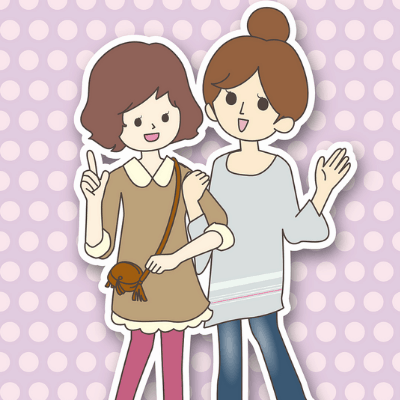
33 Effective Social Skills Activities and Games for Kids (Young Children, Teens, Autism & Group Activities)
Looking for fun social skills activities to boost your kid’s socio-emotional development.
Social skills are an important part of kids’ socio-emotional development. Every day, we use our social skills to communicate and interact in society.
Children learn about norms and acceptable behaviors through their social interaction with parents, teachers and, later in childhood, peers. There are also a number of social skills activities for kids that will help us support this learning process.
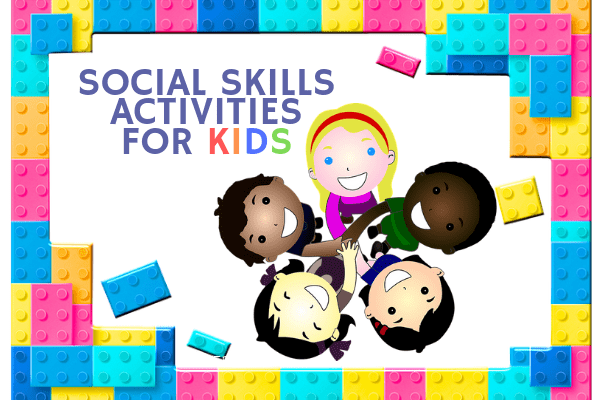
(Disclosure: We are a participant in the Amazon Services LLC Associates Program, an affiliate advertising program designed to provide a means for us to earn fees by linking to Amazon.com and affiliated sites. You can also read our Disclosure & Disclaimer policy here )
33 Social Skills Activities for Kids
The following social activities are great for fun family game nights and for classroom activities. They are also great tools to help you work with kids on their social skills.
I’ve organized them into broad categories, following this social skills checklist .
- Communicating
- Recognizing and Expressing Emotions
- Participating
- Taking Care of Themselves & Others
- Problem-Solving
For each social skill mentioned above, you will find different activities that may help with the developmen t of interpersonal skills.
This is the list of social skills games and activities that we will explore below (🎁 you can also download one of our suggested social skills activities at the end of the post:)
COMMUNICATION SKILLS ACTIVITIES
- Conversation Role-Playing
- Self-Introduction for Kids
- Would you Rather Questions
- Giving & Receiving Compliments
- Puppet Show
- Assertive Communication Role-Play / Worksheets
- Personal Space Circle
- Personal Space Worksheets
- Recognizing Emotions / Emotions Flashcards Games & Activities
- Emotions & Facial Expressions (Worksheets)
LISTENING SKILLS ACTIVITIES
- Continue my Story
- Guess what I’m Describing
- Whole Body Listening Worksheets
EXPRESSING AND RECOGNIZING EMOTIONS
- Drama Workshop
- A Feelings Journal
- Expressing Feelings with Emotion Cards
PARTICIPATING IN SOCIAL SITUATIONS
- Conversation Ball
- The Talking Stick
CARING AND SPEAKING UP FOR THEMSELVES
- What Makes a Good Friend (Group Activity)
- Things We Have In Common
- Showing Interest: Questions about Others
- Guess Fake or Real Apology
- Write an Apology Letter
- How Others Feel / Perspective-Taking
- A Week of Kindness
- Respect Charades (🎁 PDF download included)
PROBLEM-SOLVING IN SOCIAL SITUATIONS
- Conflict Resolution Worksheet
- Social Skills Board Game
SOCIAL SKILLS ACTIVITIES FOR AUTISTIC KIDS AND KIDS WITH DISABILITIES
- Social Skills Groups
- Social Clubs
- Social Stories
- Hidden Rules with Friends
Communication Skills Activities
VERBAL COMMUNICATION ACTIVITIES
Skill: Starting, maintaining, and finishing a conversation
Activity 1: Role-playing conversations
What is role-playing? It is acting out a particular person, character or situation. It is a technique used often when training new skills and in psychotherapy.
It works really well when you are training kids in social skills, as it allows them to practice a new skill in a safe environment before they expose themselves to real-life situations. Consequently, you will see it mentioned in several suggested social skills activities.
In this activity, you will be role-playing with your kids or students different everyday communication situations like:
- starting a conversation with the kid sitting next to you
- wrapping up a conversation so the kid agrees on meeting / playing again.
Just a few examples that you can use:
- Conversation starters Give them a few lines that they can use at school:
- What did you do this weekend?
- What games do you play at home?
- What is your favorite food / game / place?
- Should we play this again sometime?
If you run out of ideas, or would like to make it a bit more fun, you can download our free printable conversation cubes (it includes 5 different topics and a blank template for you to explore any area of interest)
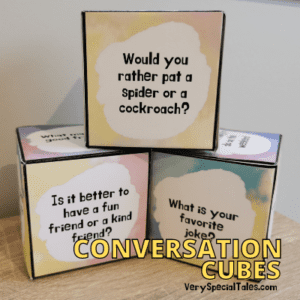
Alternatively, you can also consider these foam conversation cubes (36 engaging questions and an activity guide)
Activity 2: Role-playing self-introductions
Being able to introduce themselves is an essential skill that helps kids feel confident, and provides opportunities to make friends and meet new people.
There are many situations when children may need to introduce themselves to a group, most likely their classroom or an activity group.
Activity: Create a list of introductory questions and ask them to introduce themselves Write a list of things for them to answer about themselves (favorite food, sport, names of their friends, how old they are). They can write down or draw depending on their age / writing ability
Related Reading: Self-Introduction Activities and Worksheets for Kids
Activity 3: Would you rather
“Would you rather” is a fun conversation game that offers a choice between two answers.
This games is so fun that even a quiet child can turn into a chatterbox.
Do you need some ideas? -> Check out our 114 Would you Rather questions for kids
Skill: Giving and receiving compliments
Activity 4: Role-playing giving and receiving compliments
In groups of two, each kid takes a turn saying something nice to the other person (e.g. I like your t-shirt, You did great today at maths), and the child that receives the compliment responds “Thank you very much”.
Activity 5: Puppet show
This is just a variation of a role-playing situation. You may use the puppet show idea for any of the previous social situations that we have mentioned (conversation starters, giving and receiving compliments).
Just as an example. I sometimes use my kid’s favorite soft toys (Puppy Dog Pals) and represent conversations in which Bingo is having problems controlling his emotions and Rolly helps him through some of the calming strategies that we use at home.
Activity 6: Communicating Assertively
Assertiveness is an important communication skill that will improve your child’s social interactions and low self-esteem.
Assertive communication is not just about what we say. Nonverbal communication is just as important: making eye contact, keeping calm while speaking, and using a confident tone of voice.
Role-play how to communicate assertively in real-life situations. These assertive communication worksheets include tips and examples of assertive communication.
⇒ More info on assertive communication for kids
⇒ Other assertive communication resources: I-statements examples
NON-VERBAL COMMUNICATION SKILLS
Skill: Respecting personal space
Activity 7: The personal space circle
Draw a circle on a big sheet of paper. The inner circle will be the intimate space (1.5 feet radius), surrounded by personal space (4 feet radius) and the area outside will be the social space.
Put that paper on the floor. Take turns to role play conversations where kids speak to each other without trespassing in their personal spaces. (You may also use a string to create the circle or a hula hoop )
Activity 8: Personal space activities (worksheets)
This activity features personal space worksheets designed to help kids understand and respect boundaries in social interactions. It includes:
- Social Story (Social Narrative) (two versions, with illustrations and a blank option)
- 20 Gorgeous Discussion Cards (two versions, with and without illustrations)
- 15 Role-Play Situations (two versions, list and cards)
- My Personal Space Worksheet (Friends vs. Strangers)
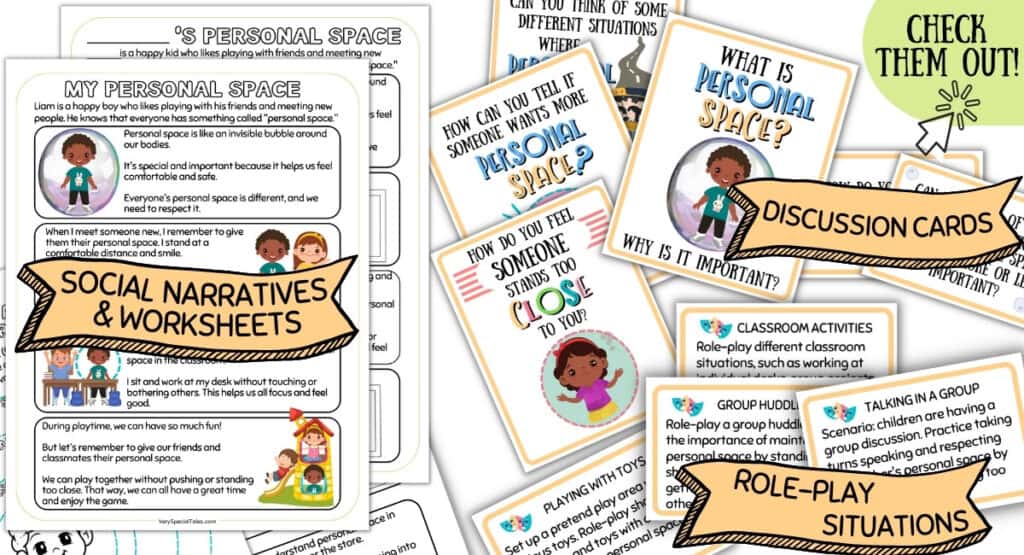
NON-VERBAL COMMUNICATION & EMOTIONS /FEELINGS
Skill: Learning about facial expressions and body language
Activity 9 : Identifying facial expression and body language in Emotion Cards
You can use emotion cards to work on emotion recognition.
This is a set emotions flashcards with of 24 emotion labels and definitions. It also comes with useful suggestions on how to use them.
Activity 10: Emotions & Facial Expressions Workbook This Emotions & Facial Expressions workbook can be a great activity for younger kids, too (we developed this one ❤️)
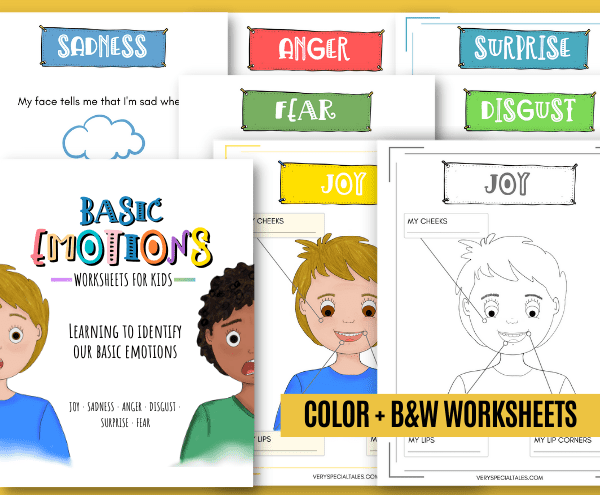
Listening Skills Activities
Skill: Listening with complete attention
Activity 11 : Continue my story
We love storytelling at home. I make up new stories every single day for my child.
Stories can also be used for a fun activity that involves listening attentively.
One person in the group starts a story, and at some point of time stops and chooses who will continue the plot. The next person will take the story from there and will pass it to another one in due course.
Everybody needs to listen with full attention because they don’t know when their turn will come up.
Activity 12: Guess what I’m describing
Choose something that you will describe, for example, a lion. Then, share clues, one at a time, till somebody guesses what you are describing
“It is an animal / It has four legs / It lives in the wild / etc.”
Activity 13: Whole Body Listening Worksheets
“Whole Body Listening”, developed by Susanne Marie Poulette , is one of the most popular tools to teach younger kids active listening .
You can download this social development tool from this post: Listening Games and Activities for Kids (18 ideas!)
Expressing and Recognizing Emotions / Feelings
Skill: Expressing and recognizing feelings
Activity 14: Drama workshop.
Write down different emotions on slips of paper and put them in a bag. Taking turns each of you will take a slip of paper and role-play the emotion written on it.
The person role-playing practices the skill of expressing feelings
The people guessing are practicing emotion recognition.
Activity 15 : Keeping a feelings journal
Some kids may find expressing their feelings a bit difficult. A good way to get comfortable reflecting about feeling could be writing a feelings journal. This one is a great one for girls. And this one could be a nice guided journal for teens , with prompts and fun design.
Skill: Expressing feelings
Activity 16 : Emotion cards and real-life situations
With a set of cards portraying different situations, take turns to explain how would do you feel when you are in that specific situation.
These ones here are great.
The set includes 80 cards. Half of them are faces on white background (different ages, genders, and ethnicities) showing five different emotions (happy, sad, angry, disgusted and scared). The other 40 cards are real-life emotion-provoking situations. It also includes an activities booklet that provides instructions and ideas on how to build emotional awareness and social skills.
Tip: This option is a good idea if you want to work on different facial expressions on real people (the ones I mentioned in activity 7 are illustrations)
Participating (Social Skills Activity)
Taking turns
The beauty of this skill is that it can be practiced with any game you have at home. But just to give you another idea:
Activity 17: Answer the question when you get the ball
Conversation balls are great tools to help kids know about each other.
These balls have printed conversations prompts. There are several ways to play with them. You usually toss the ball and check under your thumb the question you need to answer.
You can also choose one of the questions and toss the ball around so that the kids wait for their turn to answer that question.
Conversation balls encourage the use of interpersonal skills (taking turns, eye contact, listening, responding).
Activity 18: The Talking Stick
The turn-taking stick (or talking stick) is literally just a little stick decorated in a cute way. Only the student holding the stick is able to talk. After they have spoken they can pass the stick to another student
Related Reading: 25 Fun Turn-Taking Activities for Kids
Caring / Speaking Up for Themselves
Skill: Making friends
Group Activity 19 : Brainstorming what makes a good friend
Some ideas to mention: kind, helpful, talk nicely to people, don’t exclude others, don’t say ugly things about others.
Activity 20: Things We Have In Common
This friendship activity is a great activity for breaking down barriers.
Kids are organized in small groups, ideally with a mix of kids that they aren’t already all friends. The group has to find a certain number of things that they all have in common.
Kids not only learn a lot about each other but become aware of how many things they may have in common with kids from different social groups.
Skill: Showing interest in others
Activity 21: Ask questions about the other person.
Organize the kids in pairs, and ask them to take turns asking questions about each other.
If the kids run out of ideas you can use conversation cards like these ones (120 questions divided into three kids’ theme topics)
Skill: Learning to Say I’m Sorry
Group Activity 22: Guess Fake or Real Apology
Play a guessing game where they need to figure out if an apology is real or fake.
Present different scenarios where an apology is necessary. Have the kids come up with various real and fake apologies.
Then, go in a circle and have them read their apologies for lots of laughs. Each time a kid reads an apology, the others need to guess if it was real or not, and what gave them the clues.
Activity 23: Write an Apology Letter
An apology letter allows your kid to put their feelings in writing and reflect on their actions and how they affect others.
Related Reading: Teaching Kids to Apologize (worksheets included)
Skill: Teach Empathy
Activity 24: Help kids take other people’s perspectives.
Perspective-taking activities may be quite enlightening and help them reflect on how others feel about a situation.
Select a set of situations your kids or students may encounter:
- Joe makes a joke about how Tim’s hair looks. What is Tim thinking? How is Tim feeling?
- Anna invites Emma and Lilly for a playdate but leaves out Kathy. Why do you think Anna left Kathy out. How did Kathy feel?
Related Reading: 21 Perspective-Taking Activities for Kids
Activity 25: A Week of Kindness
Create a kindness challenge. Choose a kindness activity to complete each day of the week.
Related Reading: 23 Fun Empathy Activities for Kids
Skill: Showing Respect
Activity 26: Respect Charades (PDF Download available)
Write down different examples of respectful behaviors on slips of paper and put them in a bowl. Students take turns drawing a slip of paper and acting out the behavior while others guess what it is. (!Be sure to download this fun social skill group activity at the end of this post)
Problem-Solving Activities
Skill: Problem Solving in Social / Group Context
Activity 27: Conflict Resolution Worksheet (Conflict-Handling Modes)
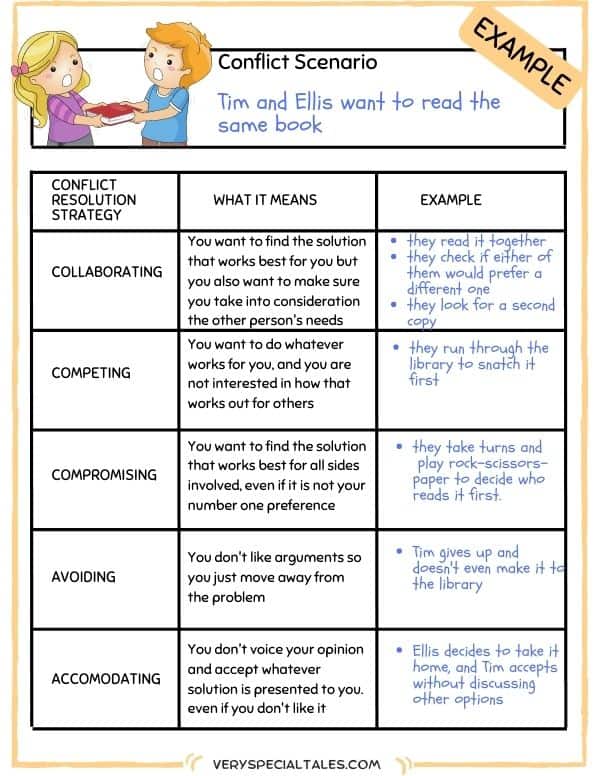
This conflict resolution worksheet will enable work on the different conflict-handling modes:
- collaborating
- compromising
- accommodating.
Identify a conflict scenario, and ask your students to write examples for each conflict resolution strategy.
You can download this worksheet from the following article:
- 20 Fun Conflict-Resolution Activities for Kids
Activity 28: Social Skills Board Games
Board games are a fun way to learn important social skills in a safe space with a small group of peers or with family members.
So, let’s add an example of a social skills board game to our list:
- Social Skills Group Activities (6 Board Games)
The games target: morals, good manners, empathy, friendship, and emotional skills (showing emotions and managing emotions)
Related Reading:
- Social Skills Games for Kids
- 25 Fun Problem-Solving Activities for Kids
Social Skills Activities for Autistic Kids / Kids with Disabilities
One of the diagnostic criteria in Autism Spectrum Disorder is persistent deficits in social communication and social interaction across multiple contexts:
- Deficits in social-emotional reciprocity
- Deficits in nonverbal communicative behaviors used for social interaction
- Deficits in developing, maintaining, and understanding relationships
Autistic kids, kids with ADHD, and those with certain disabilities may experience unique challenges in developing social skills and understanding social cues.
Since social skills deficits often accompany these diagnoses, helping our kids with autism develop these skills is an important part of our work as parents, educators, and health professionals.
Apart from the activities that you have already gone through, you may also consider helping your kid with the following activities:
Activity 29: Joining a Social Skills Group run by professional therapists
Check out if this type of activity is available in your community. We were really happy to discover that this was an actual possibility for us.
Activity 30: Joining a Social Club for Kids with Autism
Activity 31: Organize Play Dates at Home (guided play if your kid needs help in social interactions)
Activity 32: Social stories
Social stories, social scripts, or social narratives are short descriptions of a situation or event that also indicate the expected social behavior.
These stories assist kids who struggle with reading social cues (body language, voice tone, facial expression) or with understanding commonly accepted social rules.
Any social situation can be transformed into a social narrative.
An example of a social story (the stories often include visuals to help understand / reinforce the message) :
Paying at the supermarket checkout
- First, I put all the items in my list in my supermarket trolley. Then I go to the check-out.
- I place my items on the counter and the cashier scans them and puts them in my grocery bags.
- The cashier tells my how much I need to pay and I use my credit card to pay for my shopping
Activity 33: Hidden Rules with Friends
We have used this card game with my son, but we don’t play it following the game’s suggested rules. My son loves us to explore and untangle whatever social problem the card presents:
- What do you do if a friend invites you over for lunch and you don’t like the veggies?
- What happens if you burp in public?
Tip: some people find the designs in these cards too simple. It has many blank cards to fill with other social situations that I don’t use. For us, they work as flashcards to explore social challenges in everyday situations.
If you are looking for lots of activities ideas, make sure you check this book below:
Social Skills Activities Ideas in Books
These books come with lots of ideas and activities to practice social skills at home, at school or in therapy setting:
- The Shoulds and Should Nots: Photo Cards to Help Children Develop Social & Communication Skills
A picture book with 64 scenarios that build social-emotional learning, critical thinking, mindfulness, self-confidence, empathy, executive function, and critical consciousness.
- 50 Fun Exercises for Making Friends, Talking and Listening, and Understanding Social Rules
- Over 75 Fun Games & Activities for Building Better Relationships, Problem Solving & Improving Communication
Other Social Skills Resources for Kids
- A comprehensive list of Social Skills for Kids ( FREE poster included in that post).
- Fun Social Skills Games for Kids
- Empathy Activities for Kids
- Conversation Starters
- Roll the Question Dice Activity
- Self-Introduction Worksheets for Kids
- Conflict Resolution Activities for Kids
- 30 Activities to Teach Kids about Respect
- 32 Activities to Teach Kids Sharing Skills
Social Skill Activity (Download)
Other coping skills activities in this blog.
- Anger management activities for kids
- Self-esteem activities for teens & kids
- Anxiety tips and activities
33 Social Skills Activities for Kids (Young Children, Teens & Kids with Autism)

Briar Jones
Love this, such an informative post! I’m not a parent myself, but am a Nanny to three little ones- so this has given me lots of fun ideas. Thank you! ?✨
Have you consider chess as one of the social skills activities? A child who realizes that one does not always win but also loses, learns humility and respect for other people. In addition to aiding analytical and developmental skills of the mind, playing chess is also a great excuse for socializing with other chess amateurs. Chess gives children the opportunity to make many new friends by participating in chess schools or local amateur tournaments. There are many advantages of playing chess from a young age. One thing your child will appreciate most is that playing chess is also great fun. With proper approach and proper tools, you can interest your kid in this marvelous game. One of the tool is to creat some interesting background stories, other tool is to practice specific movements and strategies, using special diagrams. In this case, I can recommend this book: chess-puzzles-for-kids-by-maksim-aksanov
Thank you for all your wonderful resources!
What a wonderful article for us mothers groping in the dark. You’re wonderful ! Many happy returns to your generosity in helping us. Feel blessed finding this post. ❤️
Great post! I absolutely love the idea of using games and activities to teach social skills to kids. As a teacher, I’ve found that incorporating fun and interactive activities into my lesson plans can help my students learn and retain information much better. I’m definitely going to try out some of these ideas with my students. Thanks for sharing!
Leave a Reply Cancel reply
Your email address will not be published. Required fields are marked *

71+ Free Social Problem-Solving Scenarios
Do you have kiddos who struggle with their social problem-solving skills? Teach your students the simple process of how to solve a problem along with having them review how well their solution worked or didn’t work.
Why Teach Problem Solving Skills?
Learning to problem solve is an essential skill that is used not only throughout childhood but also into adulthood. Social problem solving is the ability to change or adapt to undesirable situations that arise throughout our day.
On a daily basis, a child will encounter social problems that they will need to solve.
Anything from:
- arguing with another student
- to hurting a friend’s feelings
- to having a difficult conversation
- working with others
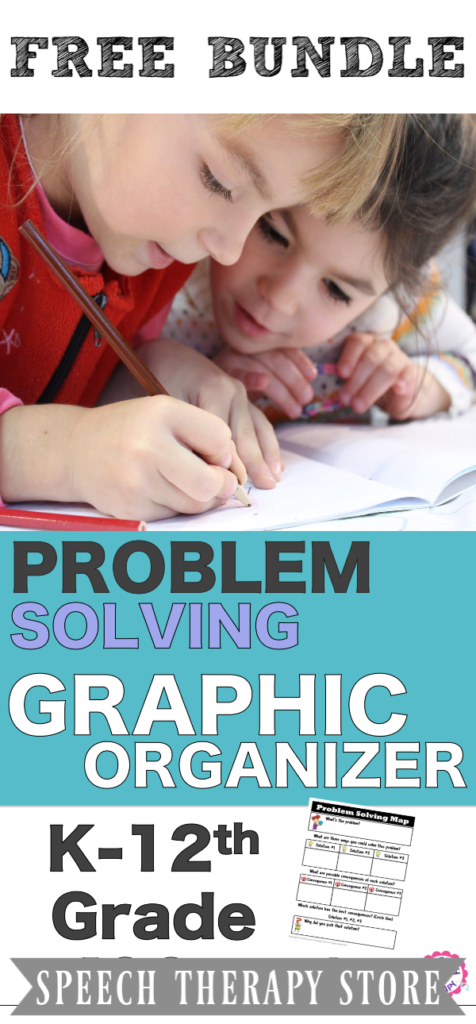
Start with Small Problems
Many of the “problems” children encounter are often small problems which the child may be over-reacting to, such as wanting a different coloring crayon or wanting to be first in line, however, these small problems are still very real to the child.
Practicing problem-solving with these small problems can be a great learning opportunity. Children can practice problem-solving with a small problem which can help them learn how to handle bigger problems in the future.
Problem Solving Importance
Social problem-solving skills are critical to a child’s social interactions, personal and professional relationships. A child’s ability to handle change, cope with stress, and handle challenges improves with a child’s ability to successfully solve social problems.
The ultimate goal is that the child will be able to solve social problems all on their own, but until they can independently solve a problem they will need to learn how to communicate and self-advocate to positively solve their problems.
Steps to Problem Solving
Children can be taught how to problem solve through a guided process of breaking down the problem and using simple steps to solve the problem.
Learning specific steps to problem-solving can allow children to remember how to solve a problem when they become overwhelmed or stressed.
Although learning to solve a problem independently can take some time and practice it is well worth the investment to have a child who can eventually solve most social situations in a positive manner on their own.
What we learnt about solving problems is don't freak out, if one thing doesn't work , try something else out. And work together as a team. #melthammathsweek #MELTHAMPUPILVOICE @problemsolveit pic.twitter.com/iVm1Im4Aue — yr6melthamce (@yr6melthamce) February 4, 2019
Problem Solving Form
Teach your students the 4 steps to becoming a social problem-solver.
- Identify the problem. For instance, start by having your student identify the social problem.
- Create three solutions. Also, have your student come up with three different solutions that they could use to solve the problem that they identified.
- Identify the consequences. Then, identify the consequence for each individual solution.
- Pick the best solution. Lastly, have your student identify which of their three solutions is the best choice Then have your student put into words why they think that solution is the best solution.
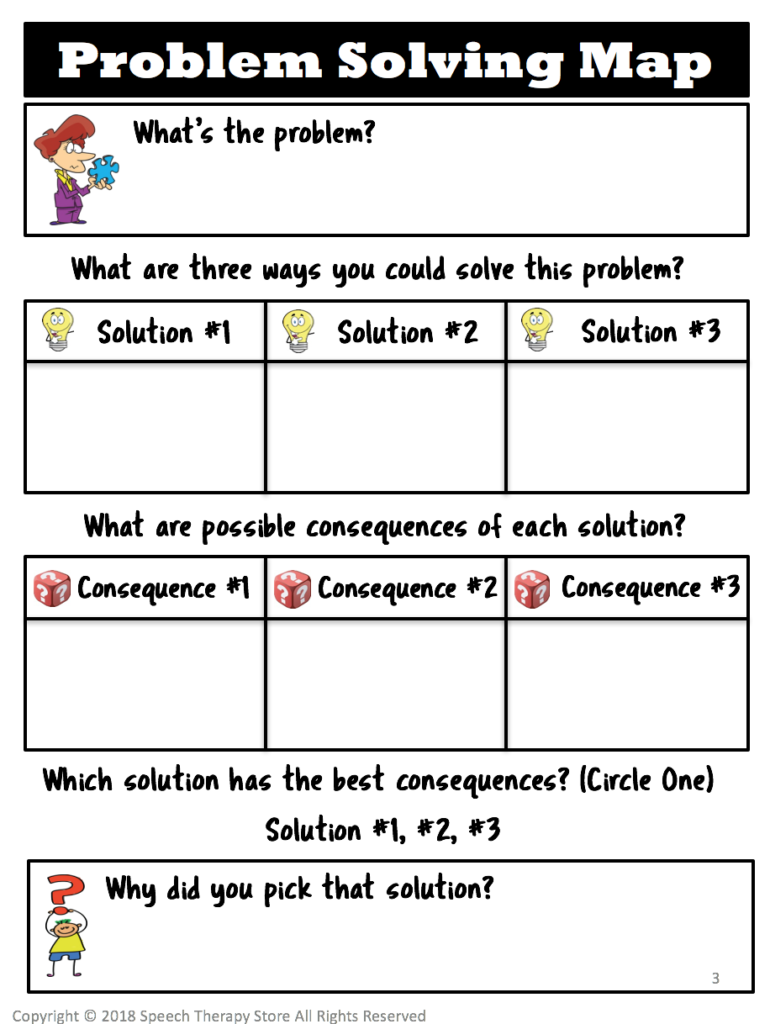
Problem Solving Review Form
After your students go through the social problem-solver have them use the social problem-solving review form.
- What happened. For instance, after your student tried their solution have them explain what happened next.
- Review the results. Also, have your student identify whether or not their solution got them the results they wanted.
- Use this solution again. Furthermore, have your student identify whether or not they would use this solution again in the future to solve the same or similar problem.
- What would you do differently? Finally, have your student explain what they would do differently if they didn’t get the results they wanted or if they wouldn’t use that solution again in the future.
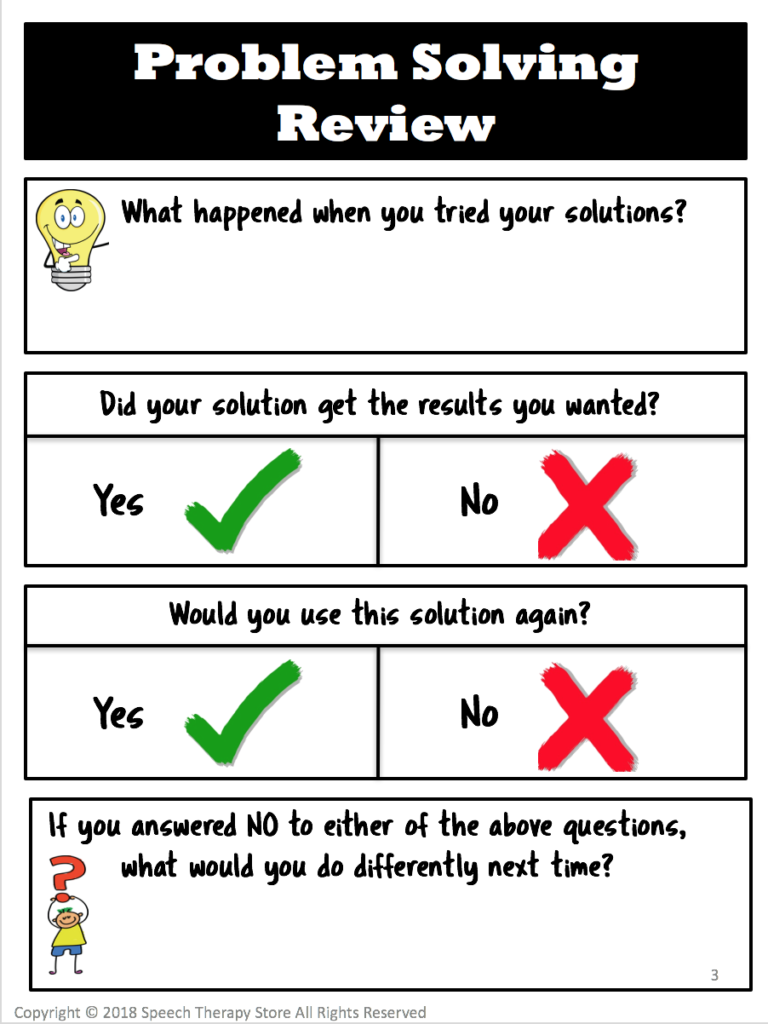
71+ Social Problem Scenarios + 6 Blank Scenarios
Use the 71 social problem-solving scenarios to have your students get great experience practicing how to solve a social problem.
Also, included are 6 blank scenarios. Then laminate them so you can use them over and over again. Therefore, create social problems that the student experiences and needs help solving.
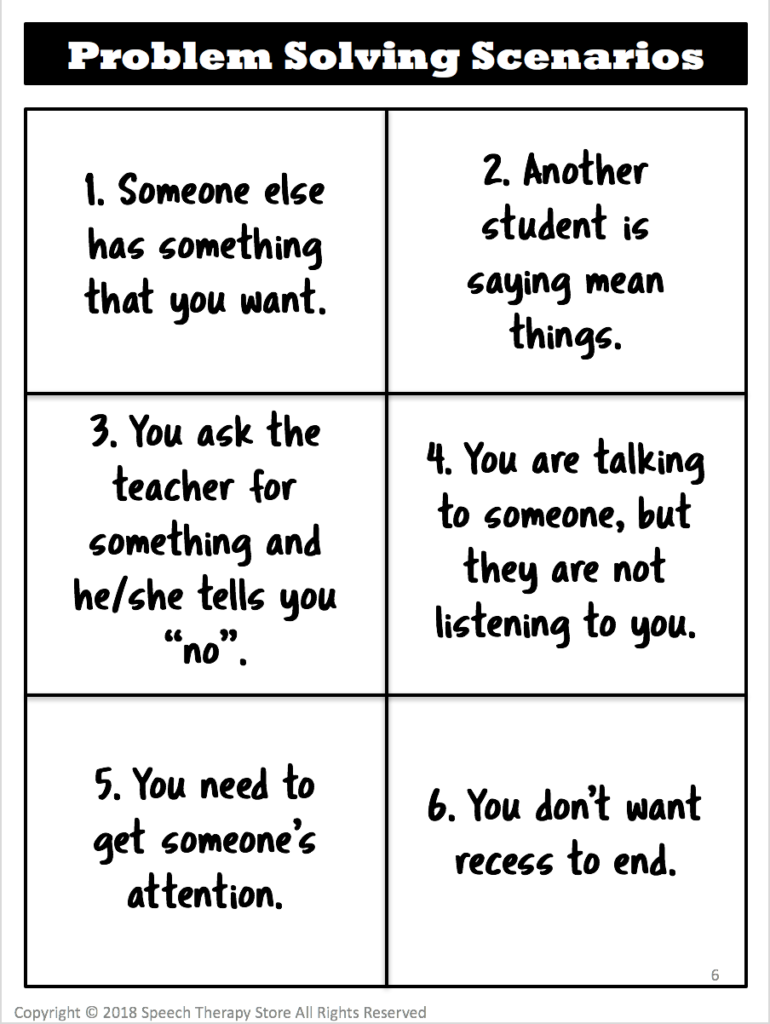
Wordless Video teaching Problem Solving
Watch this super cute wordless animation with your students and have them discuss the problem they see and how to best solve the problem.
Use this as a fun practice example to get your students started towards learning how to problem-solve.
Demonstrate Through Modeling
Model and discuss empathy.
First and foremost, children need to understand how another person might be feeling in a given situation in order to become a good social problem solver. The student needs to learn how to “stand in someone else’s shoes” for a little bit.
One way you can work on this skill is during the reading time you can focus on how a particular character in the story might be feeling.
Ask questions, such as:
- “How do they feel right now?”
- “How would you feel in that same situation?”
- “Why do you think they feel that way?”
Model Problem-Solving Skills as the Teacher
When you are faced with a problem you can solve the problem by thinking aloud for the students to hear how you solve a problem.
You can state the problem, then come up with possible solutions, then identify the possible consequences to each solution, then pick and explain why a solution is the best option.
For example, you could say, “I was hoping to take the class outside for a stress walk around the track before the reading test, but the problem is that it is raining outside. I could still take you outside, but then you will get wet, or we could walk the halls, but then we’d have to be really quiet because there are other classes learning, or we could just skip the walk and take the reading test, but then you might not do as well on the test. I think based on all of those solutions the best solution will be to walk the hallway, but you guys will have to promise to be quiet so that we don’t disrupt other classes.
Modeling the problem-solving process can be very helpful for the students to watch, observe, and later implement themselves.
Teach Communication
Have students communicate how they are feeling.
Teaching your students to share their emotions in a respectful way can improve their ability to problem-solve.
Have students use an “I” sentence frame, such as, “I feel _____ (insert feeling word) when _____ (identify what made you feel that way).”
For example, “I felt sad when Jackson broke my favorite pencil” or “I was mad when I wasn’t picked to be first in line.”
This way students can communicate how they are feeling using honest and open communication. Teaching students to appropriately communicate their emotions can help solve some social problems from the beginning.
Encourage Independency
Encourage your student to problem solve.
If your student is struggling to problem solve independently encourage them to do so using open-ended questions.
- “How could you fix this problem?”
- “What would be a fair solution?”
- “What would happen if you used that solution?”
Let the Student try to Problem Solve Independently
Give your students the space to try and solve their own problems using the guided strategies. Try not to come running to their rescue for every little problem.
Some problems are small and a great opportunity for the student to learn and practice. If an adult does all of the problem solving for a student then what are they really learning?
Give your students the time and space they need to practice solving small problems on their own. Of course, if it is a bigger or more serious problem then have an adult help guide the problem-solving process.
Tell an Adult
Remind your students that there are still some problems that are too big for them to solve on their own and that it is okay to get help from an adult to solve big problems.
For example, if the student doesn’t feel safe, someone is being hurt physically or emotionally, or if they tried to solve a problem independently but it didn’t work and they need help. Let them know that it’s okay to tell an adult.
Teach How to Disagree and How to Make Up
Discuss how to disagree respectfully.
Remind your student that they won’t always agree with their teacher, friends, classmate, or parents and that’s okay. Even the people we like might have different opinions, interests, and likes than we do.
However, even if we disagree with someone we should still treat them with respect. Treating someone with respect means to not call them names, ignore them, yell or hit them. It means that you do try to create solutions that both parties can agree with and to apologize when we hurt others’ feelings.
Role-Play How to Make Up
Practice in everyday life how to make up after a social problem .
Students are really having to stretch their brains today. It's @NSPCC #NumberDay and @problemsolveit are challenging Y9 and 10 to solve the escape room boxes. It's not as easy as it looks! The promise of a few sweet treats for the winners seems to be helping though! pic.twitter.com/AxRRJnJIv2 — CongletonHS (@CongletonHS) February 2, 2018
Be sure to get your free social problem solver today below! I hope you and your students love this freebie.
Have your students use task card scenarios to help them identify how they and others might feel in different social scenarios. Be sure to discuss the problem, identify possible solutions, identify the consequences of those possible solutions, and then based on those consequences pick the best solution.
Make social problem-solving a game by telling the students that they are social detectives and that it is their job to use what they know about social rules to help them identify the possible and best solutions.
Start practicing today with 71+ free social problem social task cards! Do your students need more practice?
Be sure to check out my other freebie for 31 wordless animated videos to teach problem-solving and so much more.
Make Problem Solving Easier with this Freebie!
Download yours today to get started.
Get More Problem Solving Time Saving Materials
Next, be sure to check out the following time-saving materials to continue to teach your students how to solve their social problems in addition to this freebie.
Weekly Social Pragmatics Homework
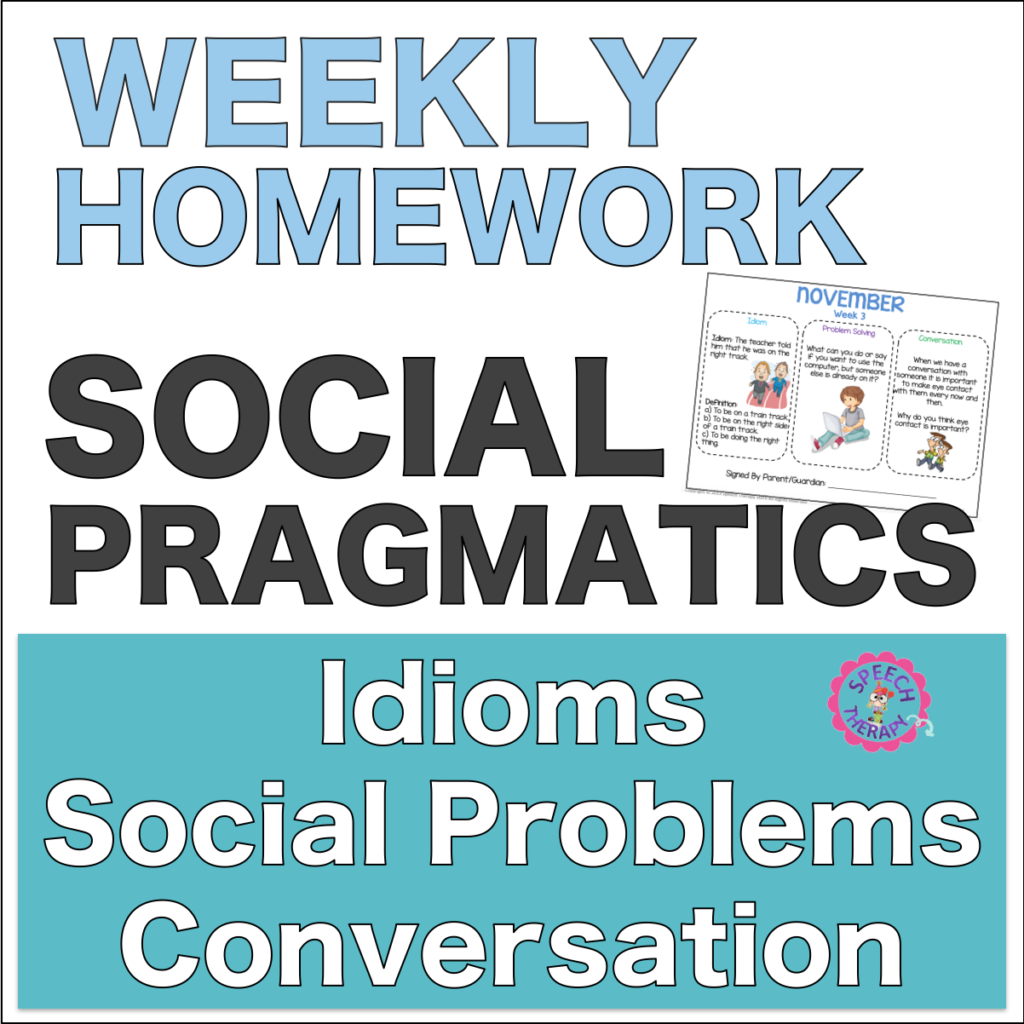
- Weekly problem-solving. Send home a weekly homework page that includes a problem-solving scenario plus an idiom and a conversational practice scenario.
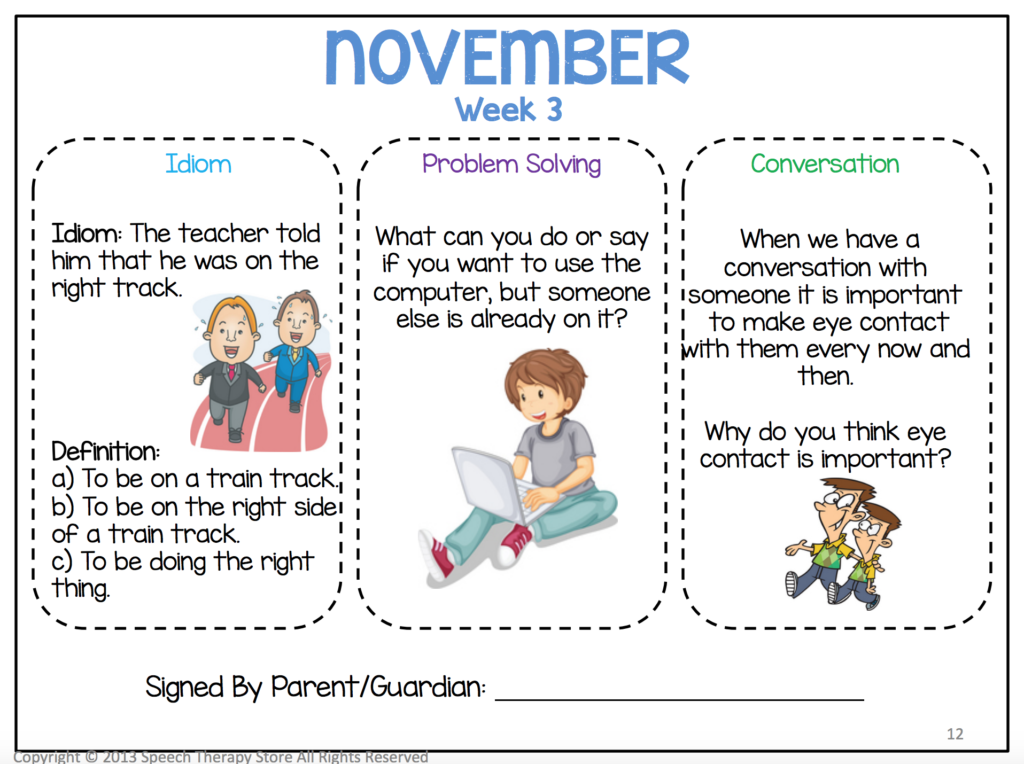
Restorative Justice Problem Solving Flip Book
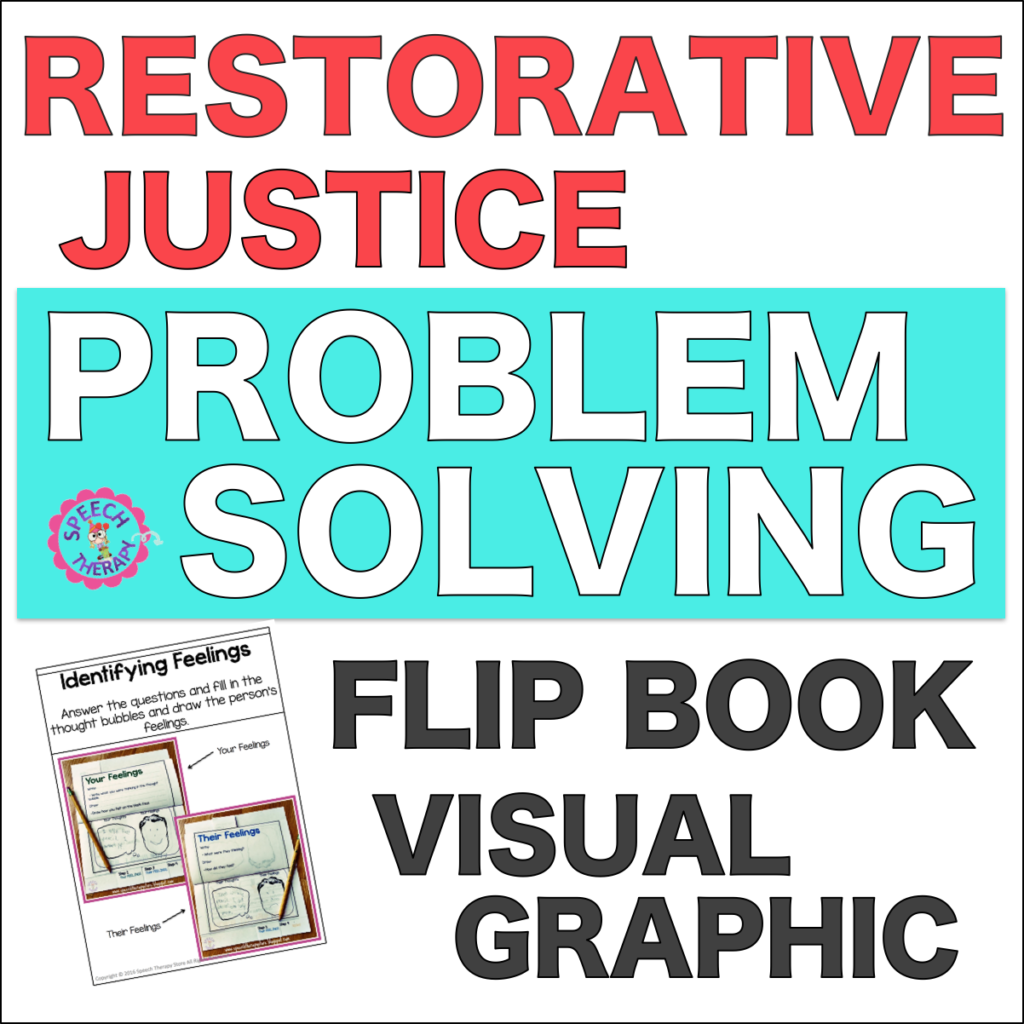
- Restorative justice graphic visual. Use this graphic visual to help your student restore a social relationship after a social problem.
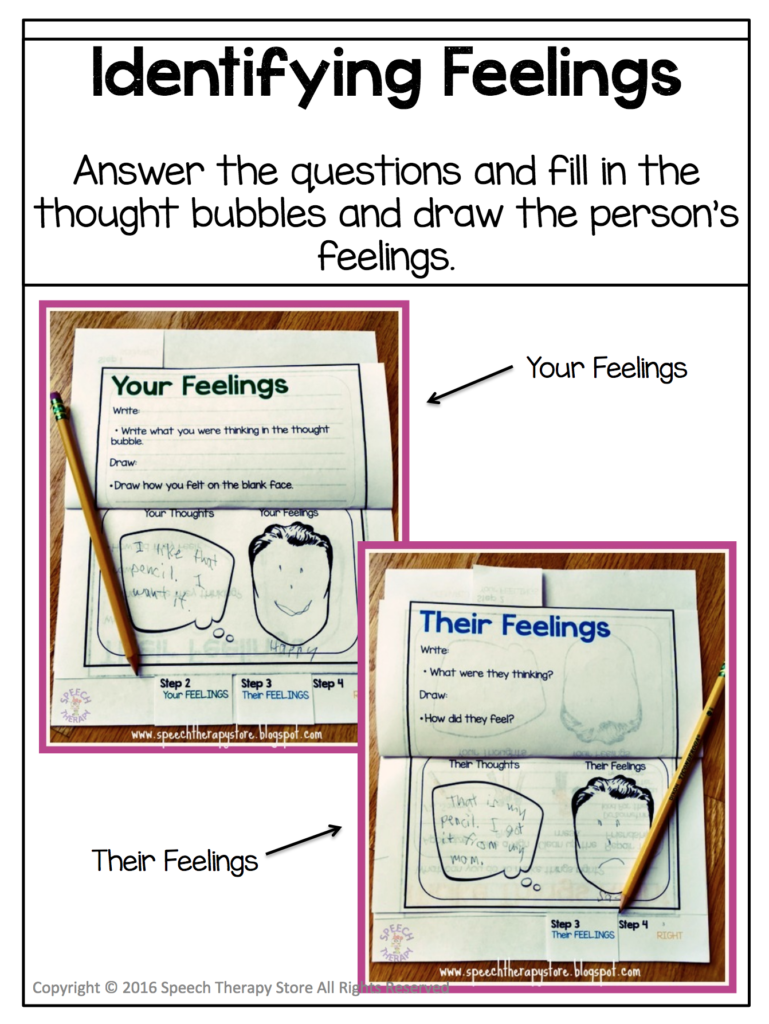
Self-Advocating Role-Play Scenarios
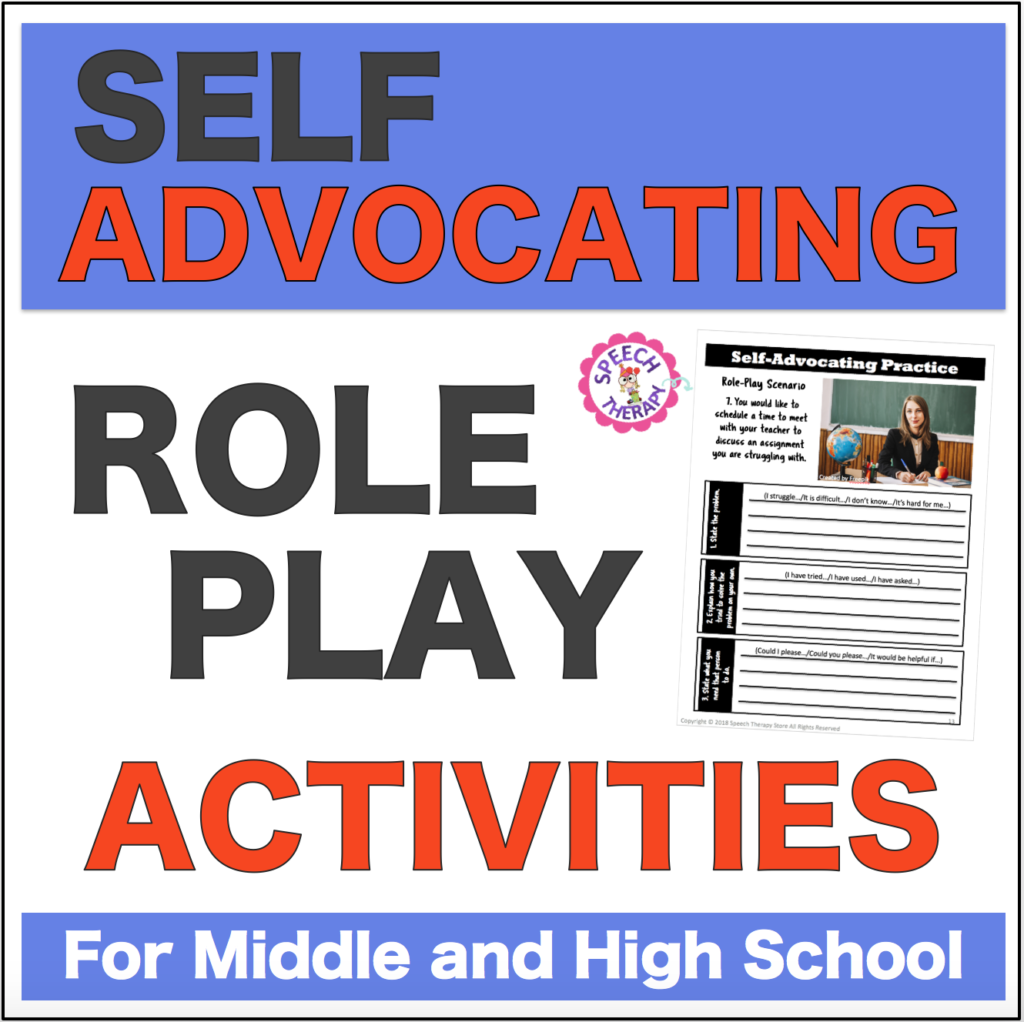
- Self-advocating in high school. Teach your high schoolers the process to self-advocate for what they need.
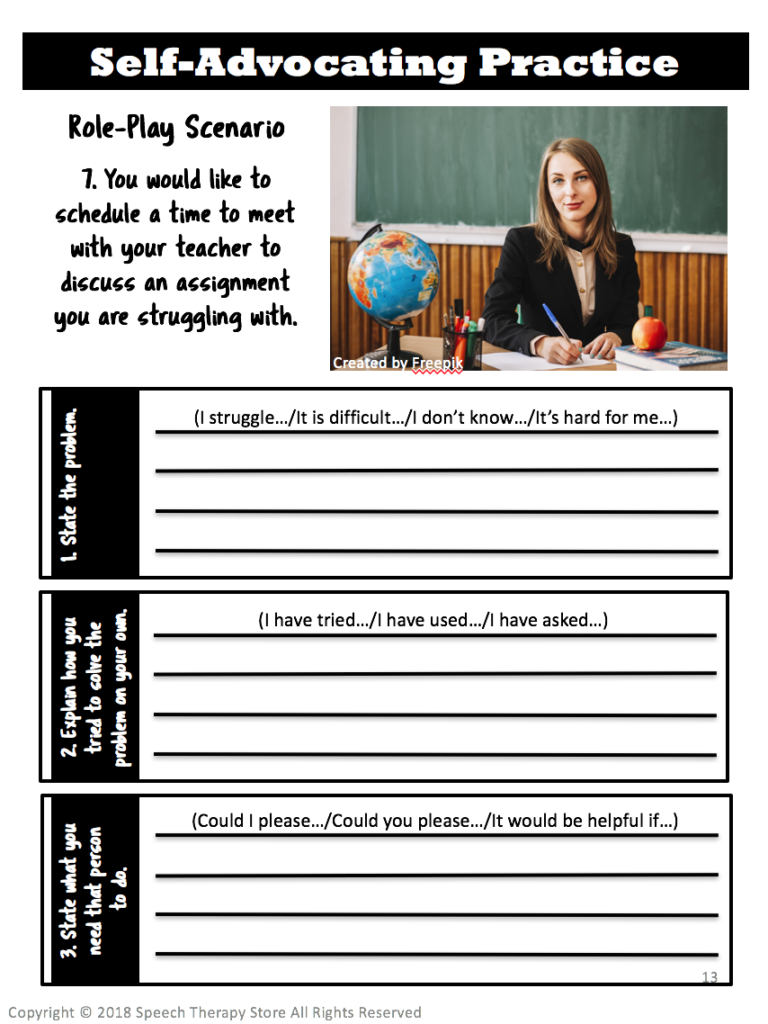
5th-12th Grade Life Skills Problem Solving
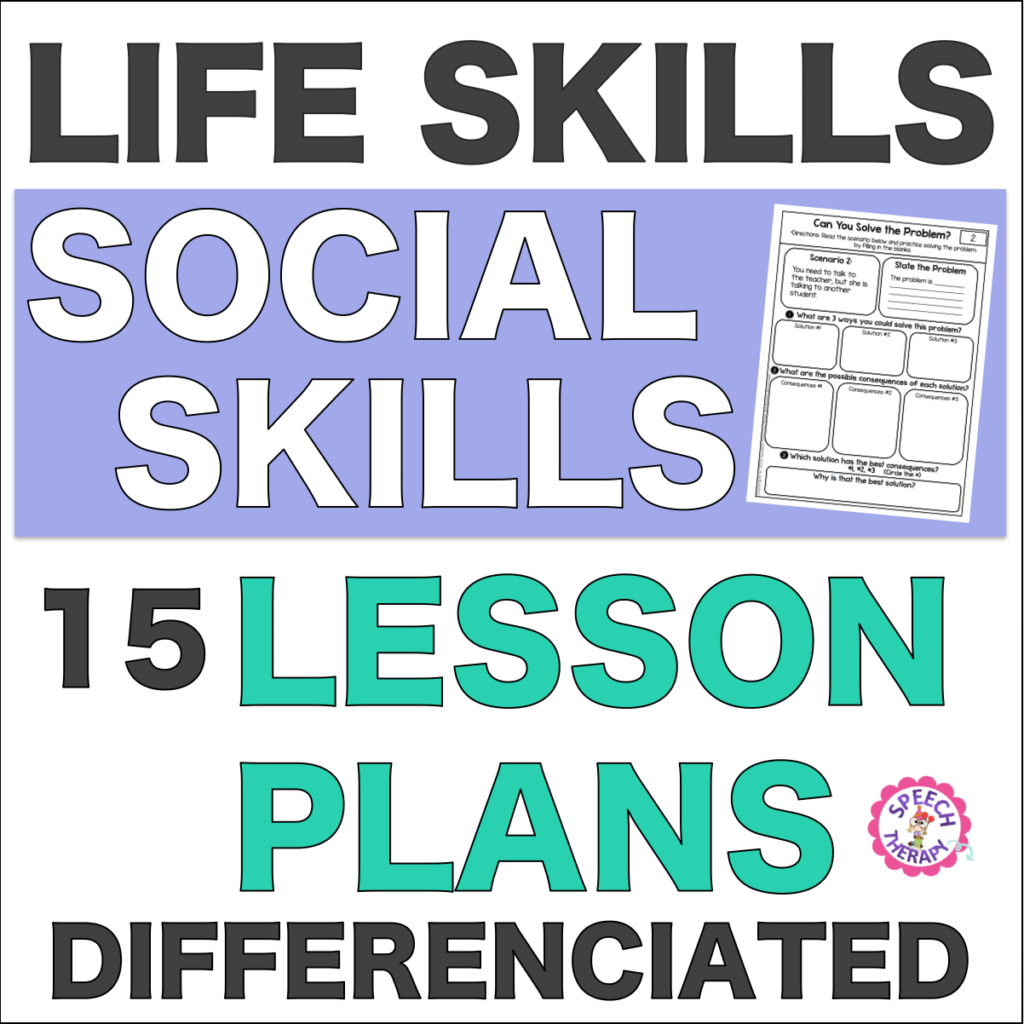
- Life skills problem-solving. In addition, this life skills differentiated bundle includes a problem-solving lesson plan.
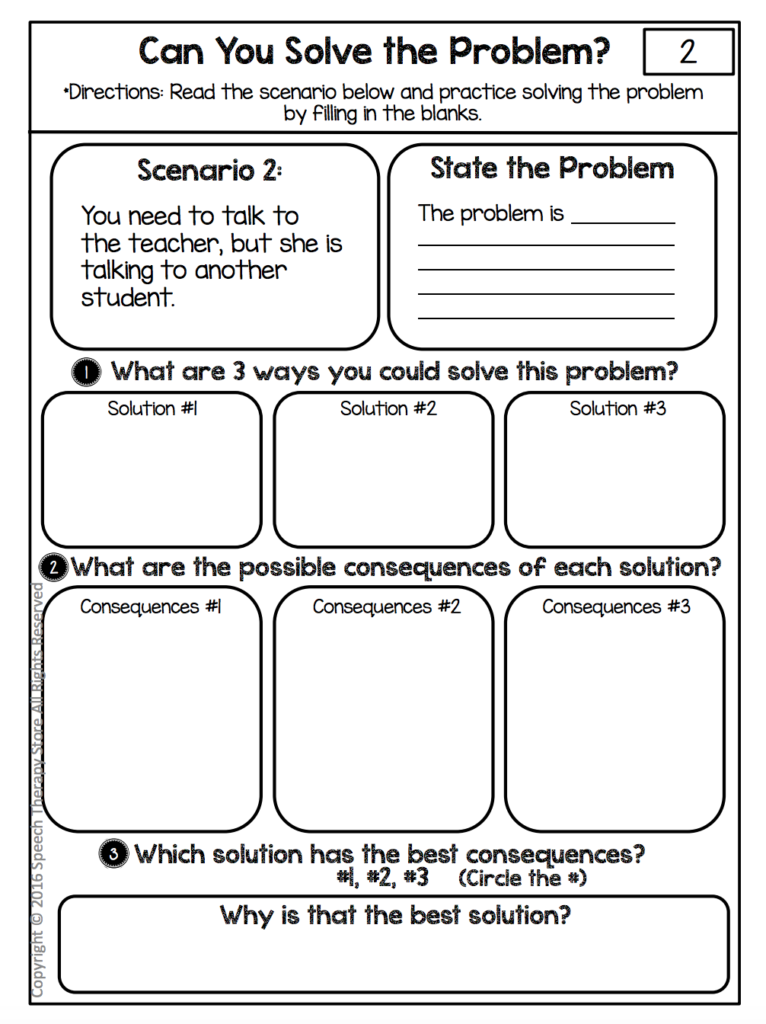
I recommend you read Problem Solving Wheel: Help Kids Solve Their Own Problems , 61+ Free Fillable SLP Planner Pages 2020-2021 , 430+ Free Multisyllabic Words List Activity Bundle , or 432+ Free IEP Goal Bank to Save You Time posts because they include freebies as well and who doesn’t want more freebies!
Got questions? Leave a comment. Let’s chat!
Monday 30th of January 2023
Hello! I have entered my name and email twice (yesterday & today) to receive to 71+ Free Social Problem-Solving Senarios, but I have not received anything yet. Not even an email back to mine in order to subcribe. Thanks for your help! Tracy
Melissa Berg
Tuesday 31st of January 2023
Hi Tracy, Thanks so much for reaching out! Sorry about that. We went ahead and sent you an email with the PDF attached. Wishing you all my best, Melissa
Problem Solving Skills
Tuesday 30th of August 2022
I truly love your site. Excellent colors, theme and writing. Thanks for sharing.
Laura Ricca
Monday 11th of April 2022
Tuesday 12th of April 2022
Hi Laura, I'm glad you found this resource helpful. Melissa
Modified Mental Health and Suicide Prevention - Speech Therapy Store
Monday 11th of May 2020
[…] 71+ FREE SOCIAL PROBLEM-SOLVING SCENARIOS […]
Problem Solving Wheel: Help Kids Solve Their Own Problems - Speech Therapy Store
Monday 4th of May 2020
[…] 71+ Free Social Problem Solving Task Cards Scenarios […]
The Pathway 2 Success
Solutions for Social Emotional Learning & Executive Functioning
Using Games to Teach Social Emotional Skills
November 18, 2018 by pathway2success 6 Comments
- Facebook 100

Games can be the perfect tool to introduce and teach social emotional learning skills to kids and young adults. These are the skills that help kids become more self-aware, develop positive relationships, show empathy towards others, manage emotions, use self-control, resolve conflicts, and make positive decisions. If you need more background on SEL, make sure you read up on the basics of social emotional learning .
So often, educators are so busy teaching our curriculum and content that we sometimes leave these skills behind. It’s so important to make real time for them and incorporate them into many of the activities you already do! For kids who struggle with some of these skills, learning them can be real work. With that said, it’s important to make learning these skills meaningful, interactive, hands-on, and fun. That’s why teaching social emotional skills in the form of a game just makes so much sense!
Here are several games (some I’ve purchase and some I’ve developed myself) that target these critical social emotional learning skills:
1. Social Problem Solving Board Game
Why It’s Important: Social problem-solving is our ability to understand a social situation and use reasoning to deal with it in the most socially appropriate way. We really use these skills every single day. At school, kids might have to problem-solve what to do when someone isn’t nice to them or when they see someone else breaking a rule and aren’t sure what to do. At home, they might use them when an adult tells them to clean their room but they don’t feel like it at the moment.
How It Works: This game focuses on considering a social problem, thinking about what it matters, considering choices and consequences, and ultimately making a decision that is best in the moment. Kids will roll a dice and work through a game board, picking up a situation card for each spot they land on. My favorite part is that kids will also act out scenarios which can help them to generalize the social skills over time.

2. Team Pictionary
Why It’s Important: Teamwork is a critical skill for all ages. This is a skill kids and young adults use throughout the school day, but also outside of school, whether it is during a sports game or playing a game with friends at home. While learning to work together as a team, kids also learn other valuable skills including assertive communication, how to listen, turn-taking, doing a fair share of the work, and how to respectfully disagree with each other. These are not only school skills, but life skills.
How It Works: Split up into two teams. Let each team pick an artist who will draw for their team. Let the artists pick a card with a phrase they will have to illustrate on paper or on the board. Let both artists draw at the same time, while their team tries to guess the correct phrase they are drawing. The catch is that the artist can only draw images and not words, so team members must work together to come up with what the artist is drawing. The team that guesses the phrase first wins! The game can continue again and again, as different artists from the group should be chosen.
3. Social Communication Board Game
Why It’s Important: Simply put, kids need to be able to communicate well with others. That includes having small talk with a classmate in the hallway, understanding nonverbal cues, holding a full conversation with peers at lunch, and using our social filter before we speak. Our communication skills have a huge impact on how we get along with others and develop relationships over time.
How It Works: This game is ideal for all kids, but especially those with social language challenges. Depending on which space kids fall on, they will have to decipher social cues from a real life photo, discuss what they would do or say in a situation, identify how they should think before they speak, or say a specific phrase in a variety of different tones. Since there are over 150 unique cards, kids can just play again and again while practicing these skills.

4. Empathy Board Game
Why It’s Important: Considering and understanding the feelings of others is a foundational skill that supports social success. In order to know the “right” or socially appropriate response to situations, we must first really understand how others feel. Developing empathy isn’t easy for all kids, especially those with social challenges and autism. It’s important to highlight situations by stopping to think how someone else might feel or think. While thinking about how you might feel in a situation is a good start, t’s critical to target how someone else might feel. That’s because true empathy is really about understanding someone else’s thoughts and feelings, which can often be different from our own.
How It Works: Students will work in partners and small groups to get through an empathy game board. For a person’s turn, they will roll the dice and spin the spinner. Their spot on the game board and the spinner will tell them how to answer each card. For example, they might have to answer: Why does it matter? How might they feel? What might they be thinking? What might you do? Students might also have to act out what they would do in that situation. There are over 150 unique situations that help kids discuss and build empathy over real-life scenarios.

5. Social Charades
Why It’s Important: A huge component to social awareness is learning to identify and understand the social cues of others. These social cues, including our body language and facial expressions, often inform others how we’re feeling, what we’re thinking, and what our intentions are.
How It Works: Create a list of different actions or have the kids come up with them themselves. Any action will do! Some examples might be waiting at the bus stop, sharpening your pencil, listening to music, running in a race, taking notes in class, and so on. The idea is that kids will randomly choose one action and act it out for the others to guess. By acting out these scenarios, students will need to consider what social cues would be aligned with that activity. Best of all, this is a quick activity you can do with just a few minutes of class time left that kids will love.
6. Roll & Spin a Coping Strategy
Why It’s Important: Being able to manage our emotions is a critical skill. We all experience tough emotions, setbacks, or challenges along the way. It’s just a natural part of life. How we handle those difficulties can make a big impact on our success. That’s why it’s so important to explicitly teach coping strategies and skills to manage our feelings on the spot. Sometimes, kids cannot self-soothe without being explicitly taught these strategies. Kids and young adults need to learn they can take a quick walk, write in a journal, take deep breaths, and use positive self-talk to calm themselves and feel better in moments of difficulty. Additionally, it’s important that kids practice these strategies when they are already calm so that they can really use them when they are emotionally overwhelmed.
How It Works: Using a one-page board, students will take turns rolling and spinning. Depending on what they roll and spin, they will fall on a space with a coping strategy that they will have to practice. Once they practice that strategy, they can cover up the spot with a chip. Note that students can have their own boards or share if you have different colored chips. The first person to get one whole row across wins! Ultimately, the idea is that kids are practicing a wide variety of coping strategies, giving them access to more skills when they truly need them.

7. Feelings Uno
Why It’s Important: Self-awareness is a critical skill that helps individuals understand their own emotions. In this activity, students can improve their emotional vocabularies by discussing a variety of different feeling words and what they mean. It also helps to normalize talking about different emotions and being comfortable sharing how we are feeling in the moment. Getting kids talking about emotions is key.
How It Works: This game just adds a simple twist to your normal Uno game, which all kids absolutely LOVE! Using the Uno colors, discuss what each of the colors might mean. Blue can stand for feeling sad, tired, bored, or sick. Green stands for feeling happy, calm, focused, and in control. Yellow means feelings frustrated, worried, or nervous. Finally, red should stand for angry. Every time a student plays a color of a card, teach them to use an emotion word that matches the color, share a time they felt that way, or discuss when someone might feel that way.
8. Executive Functioning Challenge
Why It’s Important: Executive functioning skills are the processes in our brain that help us accomplish tasks. Sometimes we might think of these skills as only related to academics, but that’s actually not true. Our executive functioning skills help us use our self-control to stop and think before saying something inappropriate, our flexibility to consider different solutions for social problems, and our time management to make sure we meet a friend on time. When executive functioning skills are stronger, kids and young adults have greater chance for success in school and beyond.
How It Works: This game can actually be played two different ways: partners and small groups, or as a full class. The idea is that students work through a game board, answering a variety of executive functioning questions as they head towards the finish line. The game cards have students completing executive functioning challenges, acting out situations, naming executive functioning skills used in a situation, and proving their knowledge about the skills themselves. For the full class version, kids can work in teams, collaborating on the answers and getting “points” to win the challenge.

9. Guess Who?
Why It’s Important: This game builds on many different social skills. As kids find out more clues about the mystery person, they are learning skills for conversations, turn-taking, and problem-solving.
How It Works: Kids and teens can play the game just as it is intended. Each partner will have a mystery character. The idea is that the other partner will ask multiple questions in an effort to try and discover the character. For example, they might ask, “Does your person wear a hat?” and “Does your person have blue eyes?”. Students will take turns until one player is able to identify the correct mystery person.
10. Self-Control Speedway
Why It’s Important: Self-control is the skill that helps us stop, think, and make positive choices. Kids and teens need lots of practice with self-control in low-stress moments (like games and casual discussions) so that they can effectively use the skills when they need them the most.
How It Works: Students will play the game by taking turn rolling the dice and moving forward on the game board. When they land on a spot, they will use the picture to tell them which card to pick up and read. Students will read the card to discuss the question or act out the scenario. Practice involves reading through real-life scenarios, practicing calm-down strategies, and more.

11. Partner Scrabble
Why It’s Important: Learning to work with others is a critical skill. In this game, students will learn to work together in a collaborative way to build words for the game board.
How It Works: Have students get with a partner or small team to play Scrabble. Each team will start with 7 letters, working to build the highest-earning words on the board. This game also builds on turn-taking and cognitive flexibility.
If you love the games I’ve put together, you can save by getting them as a whole set! This Social Emotional Learning Games Bundle gives practice with empathy, perspective-taking, executive functioning skills, communication, and more.

Use these games during break times, small groups, as an end of the week reward, or just a fun brain break. Kids will have fun but you’ll know you’re working on serious SEL skills that make a difference!

Share this:

November 20, 2018 at 4:17 pm
I like the idea of using game as practical tool.how can i get this tool?
November 23, 2018 at 8:31 pm
So glad you like the ideas! You can find all the links to the games I’ve created on the pictures. Just click on the picture and it should take you right there! Let me know if you have questions or something isn’t working. -Kris
April 9, 2019 at 11:34 am
This looks like exactly what we need. I’m trying to be my sons homeschool teacher and therapist and OT and behaviorist. Love these game ideas.
April 9, 2019 at 10:29 pm
Thank you Becky! Hope you enjoy them!
November 7, 2019 at 4:59 pm
How can I get these games for my students? I teach Kindergarten ED and we get in social skills lessons everyday! I would love to surprise them with a game board!
November 7, 2019 at 5:30 pm
Hi Sam! Some of the games, like Pictionary and Uno, are things you can grab on Amazon or Target. Some of the other games are ones I created. You can find those by clicking on the links or pictures and heading to my TpT store. If you can’t find them, feel free to email me at [email protected] and I’ll help. I’m with you- I always loved surprising my kids with a game, too! It’s a great way to give them a fun reward while also working on important skills!
Leave a Reply Cancel reply
Your email address will not be published. Required fields are marked *
Save my name, email, and website in this browser for the next time I comment.
Find It Fast
- Privacy Policy
- Join Pathway 2 Success
- Social Emotional Learning Toolkit
- Self-Control Resources
pathway2success1
⭐ Kristina 💖 SEL & Executive Functioning 💻 Blogger at www.thepathway2success.com 👩🏫 Special Educator turned Curriculum Specialist Links here 👇


- Math for Kids
- Parenting Resources
- ELA for Kids
- Teaching Resources

15 Famous Mathematicians in History That Kids Should Know
11 Best Multiplication Apps for Kids
How to Teach Number Formation in 5 Easy Steps
13 Best Resources for Math Videos for Kids: Math Made Fun
How to Teach Skip Counting to Kids in 9 Easy Steps
6 Best Alternatives to Public Schooling: A Guide for Parents
How to Cope With Test Anxiety in 12 Easy Ways
Developmental Milestones for 4 Year Olds: The Ultimate Guide
Simple & Stress-Free After School Schedule for Kids of All Ages
When Do Kids Start Preschool: Age & Readiness Skills
How to Improve Reading Comprehension: Strategies & Tips
40 Best Summer Writing Prompts for Kids of All Ages
12 Best Ways to Teach Rhyming Words to Kids
How to Teach Letter Sound in 6 Easy Steps
How to Teach Letter Formation to Kids in 9 Easy Steps
12 Best Websites for English Teachers
10 Best Game-Based Learning Platforms for Kids
60 Fun Animal Facts for Kids
12 Best Behavior Management Techniques for the Classroom
13 Best Online Teaching Tips for Teachers

12 Best Social Skills Activities for Kids of All Ages
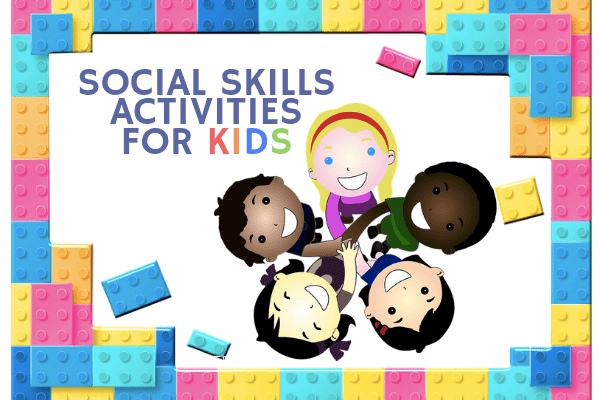
1. Online Social Skill Games
2. show and tell with a twist , 3. “would you rather” questions, 4. puppet role-playing, 5. building blocks, 6. “feeling faces” mirror game, 7. telephone tag with a twist, 8. story time with feeling discussion, 9. board games, 10. group art project.
Have you ever wondered how well your child gets along with other kids? Strong social skills are what help children make friends, do well in school, and feel happy and confident. In this blog, we’ll explore 12 fun and engaging social skills activities you can do with your child or students!
SplashLearn: Most Comprehensive Learning Program for PreK-5

SplashLearn inspires lifelong curiosity with its game-based PreK-5 learning program loved by over 40 million children. With over 4,000 fun games and activities, it’s the perfect balance of learning and play for your little one.
A. Polyword Game

Polyword game is an interactive online multiplayer game where kids can have fun while improving their vocabulary and spelling skills. Players take turns forming words using a set of given letters, competing against friends or other players. How it helps: With various difficulty levels and engaging gameplay, it’s a great way for kids to enhance their language and social skills.
B. Two of a Kind

In this fun game, the goal is simple: match pairs of cards with similar images or words. With colorful graphics and easy-to-understand rules, it’s perfect for fostering teamwork and cognitive skills in children. How it helps: Whether playing with siblings or classmates, Two of a Kind promises hours of fun and learning. Additionally, it enhances memory and concentration abilities, vital for socializing and learning in various settings.
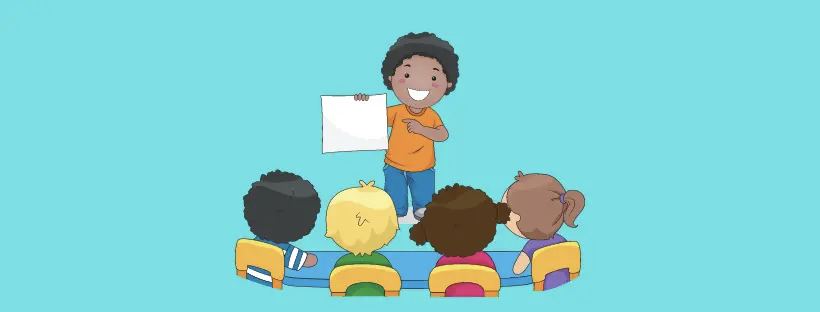
Looking for a more engaging way to practice communication in a group setting? In this twist on Show and Tell, children bring an object from home. However, they can’t reveal what it is! Instead, they must describe the object using its features, size, texture, or sound it makes. The other players ask questions to try and guess the object.
How it helps: Children learn to express themselves clearly using details, while others hone their listening and questioning skills.
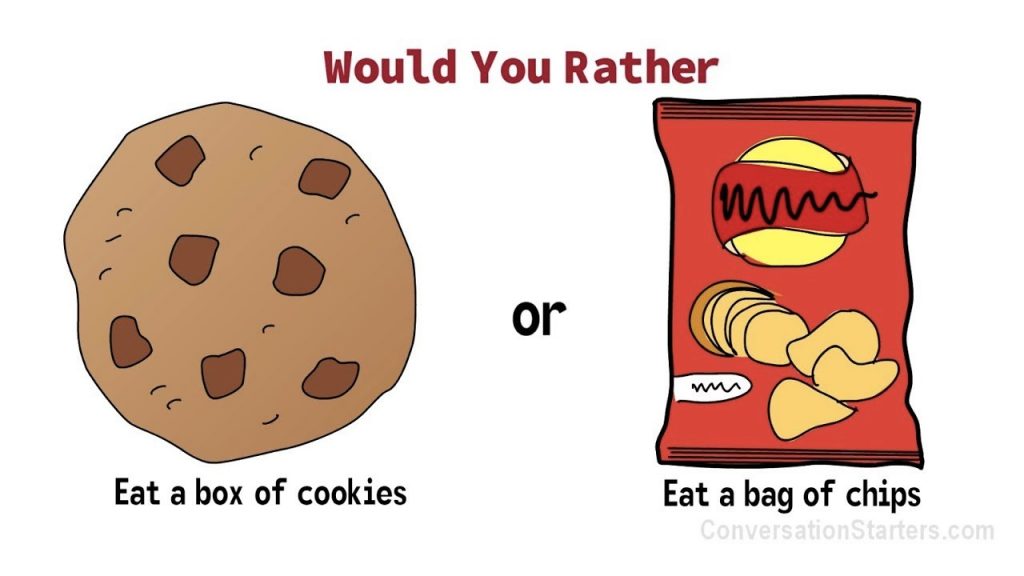
Would you rather game is one of the most thought-provoking social skills activities for kindergarteners to get them talking and considering different perspectives. Take turns asking each other “Would you rather…” questions that have two silly or interesting options. For example, “Would you rather fly or be invisible?” Encourage children to explain why they would choose one option over the other.
How it helps: Children practice expressing their opinions and reasoning while also learning to see things from another person’s perspective.
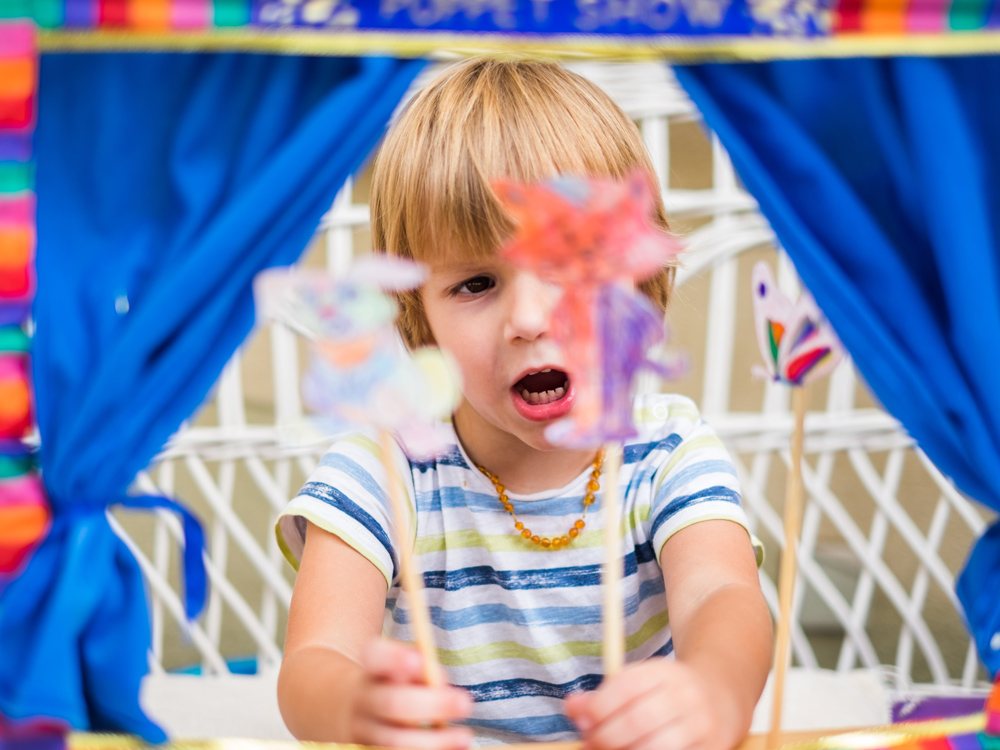
Help your child develop their conflict resolution skills with some fun puppet role-playing. Create scenarios with puppets where children need to resolve conflicts. This could involve sharing toys, taking turns on the playground, or dealing with hurt feelings. Encourage your child to act out different ways to handle the situation and discuss the outcome of each scenario.
How it helps: Puppet role-playing allows children to practice problem-solving and communication skills in a safe and controlled environment. By acting out different scenarios, they can explore various approaches to conflict resolution and learn valuable social skills.

Building blocks is one of the best social skills games for preschoolers. Kids can take turns choosing blocks and stacking them together to build anything they imagine. They can talk about their ideas and work together to make their creation!
How it helps: Building blocks encourage teamwork and sharing as kids work together to create. They also help improve communication skills as kids discuss their ideas and make decisions together.
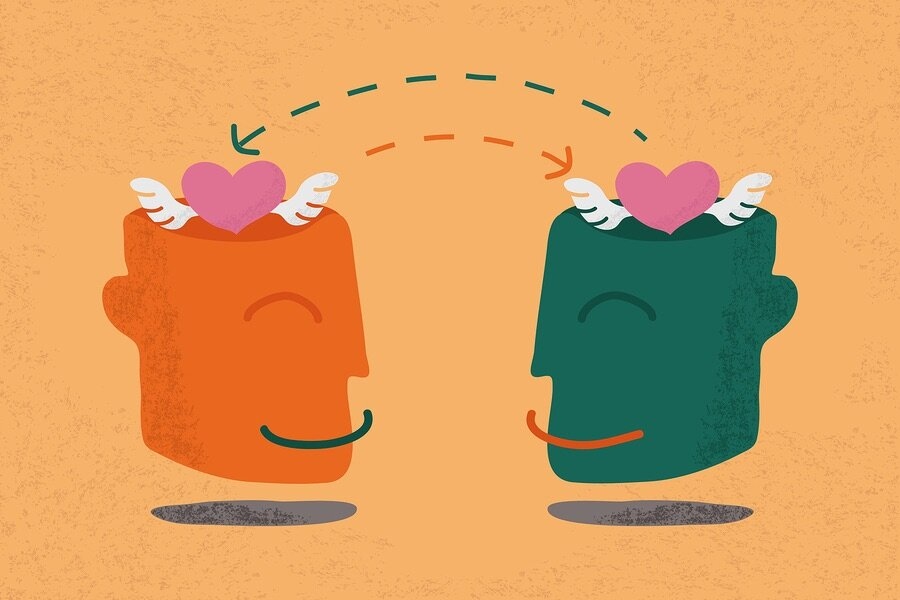
If you are looking for fun social skills activities for elementary students, here is a fun one. Make silly faces in a mirror together. Ask your child to name the emotions the faces might represent. For example, a furrowed brow could be “angry” while a big smile might be “happy.” You can also take turns making faces and have your child guess yours!
How it helps: This playful social skills activity for preschoolers helps them identify and label their own emotions, as well as recognize emotions in others. This is a foundational skill for building strong social relationships.
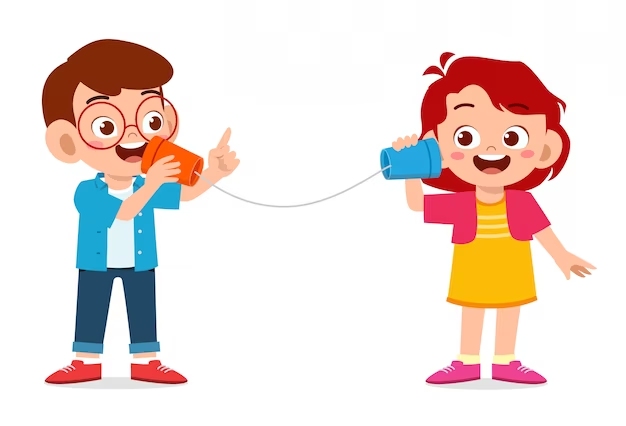
This classic game gets a makeover to focus on communication! Instead of whispering a message, have the first player describe an object in detail without saying its name. The next player listens carefully, then whispers their guess to the next person. Continue until the final player reveals the object.
How it helps: This is one of the best social skills activities for students to practice giving and receiving instructions and actively listening to understand the message.
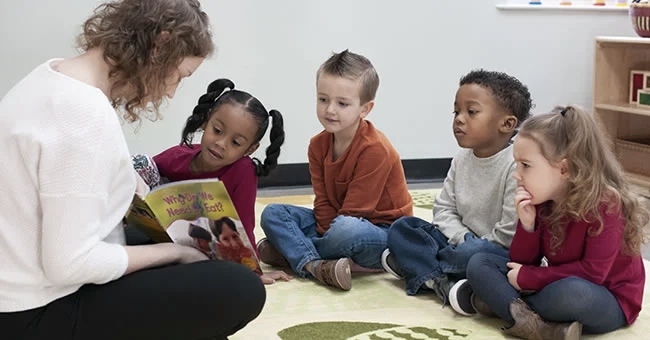
Reading stories together is a wonderful way to spark conversations about emotions. Choose books with characters who experience a range of emotions. As you read, pause to discuss how the characters might feel based on their actions and facial expressions. Ask your child questions like “Why do you think the character feels sad?” or “How would you feel if you were in that situation?”
How it helps: Engaging in discussions about emotions in stories allows young children to develop empathy and understand how their emotions and actions can impact others.
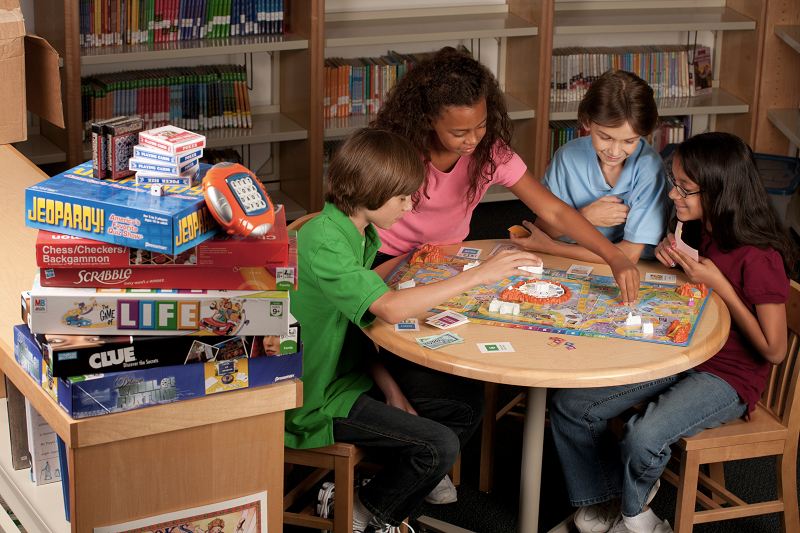
Board games are a classic way to have fun, but they can also be a fantastic tool for developing social skills! Choose games that emphasize turn-taking, sharing, and following rules. These are all fundamental aspects of social interaction. Many board games can be adapted for social skills group activities, making them a versatile tool for fostering positive social interactions.
How it helps: Board games provide a fun and engaging environment for children to practice turn-taking, sharing, and following rules, all of which are essential for building strong social skills.
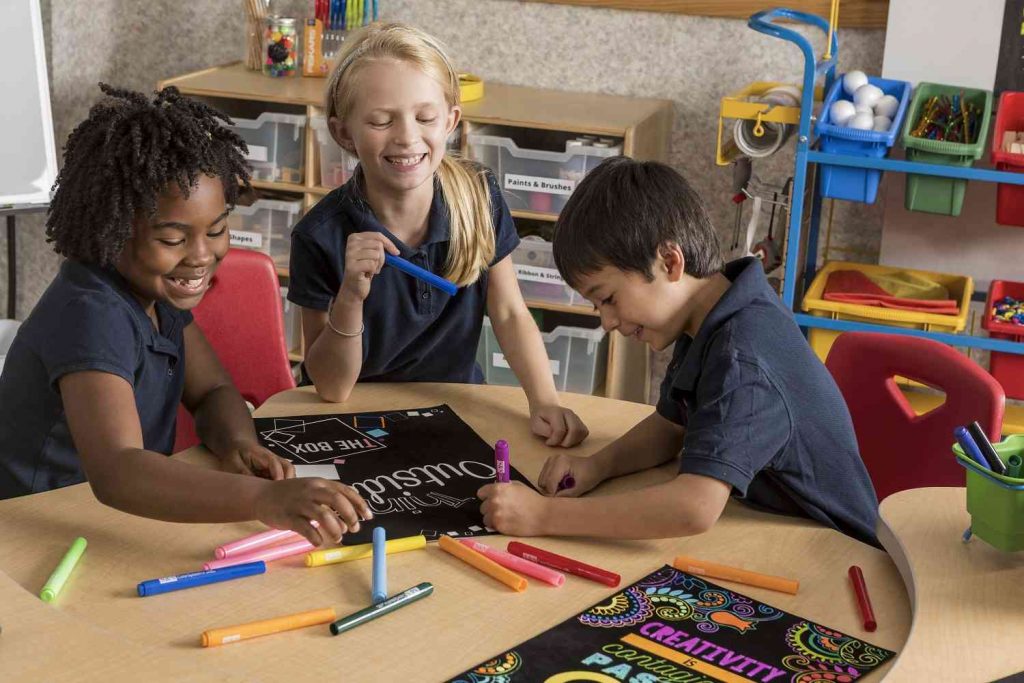
Gather some art supplies like paints, markers, or crayons and a large piece of paper or cardboard. Work together as a family or group to create a collaborative piece of art. Discuss ideas, take turns adding to the artwork, and encourage creative collaboration.
How it helps: This activity is a great way for children to learn to work together towards a common goal and communicate their ideas effectively.
11. The Fort Building Challenge
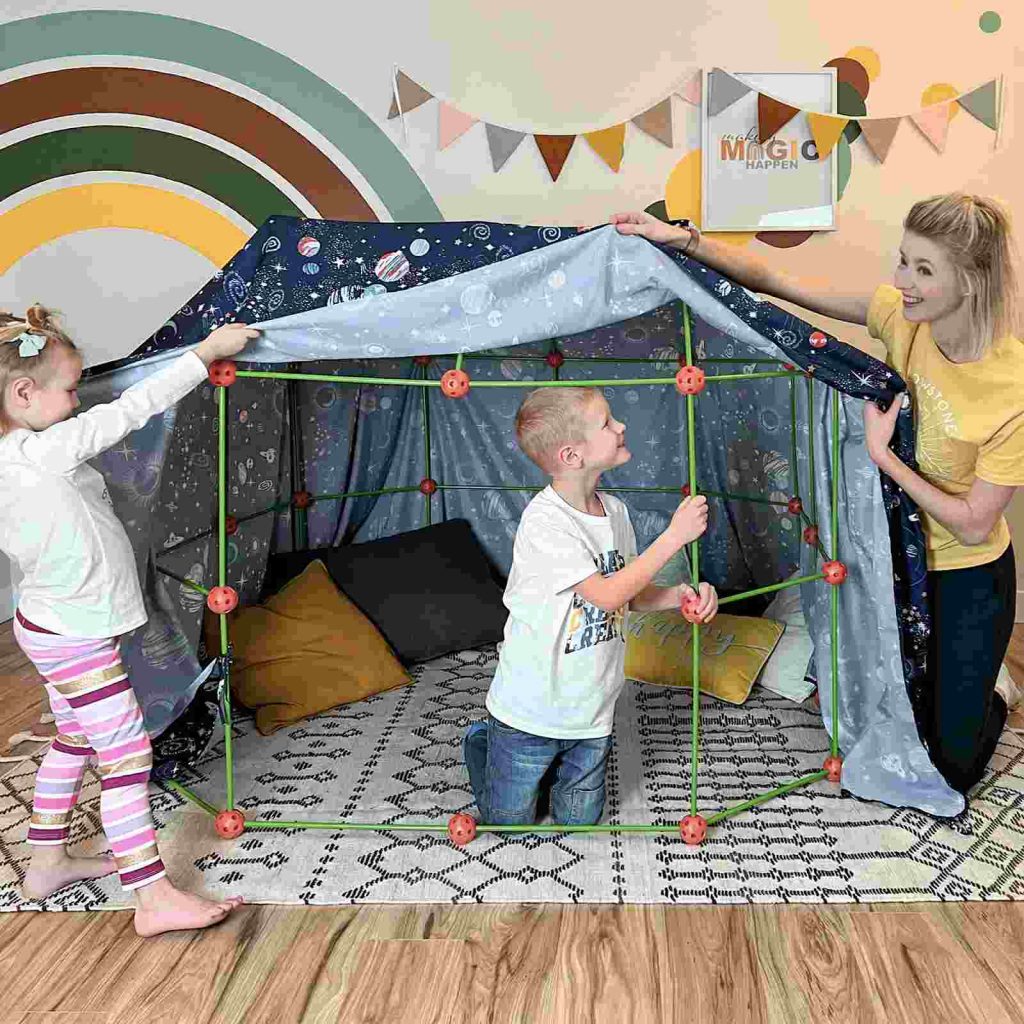
Get some blankets, pillows, and chairs, and prepare for a fun social skills challenge. The goal? To build the most epic fort together! This activity encourages collaboration and problem-solving as children work together to design and construct their fort. They’ll need to communicate their ideas, negotiate space usage, and solve any structural problems that arise.
How it helps: The fort-building challenge is fun for children to practice teamwork and problem-solving skills in a creative and engaging setting. These skills are essential for navigating social situations and working effectively with others.
12. “Simon Says” Gets Social
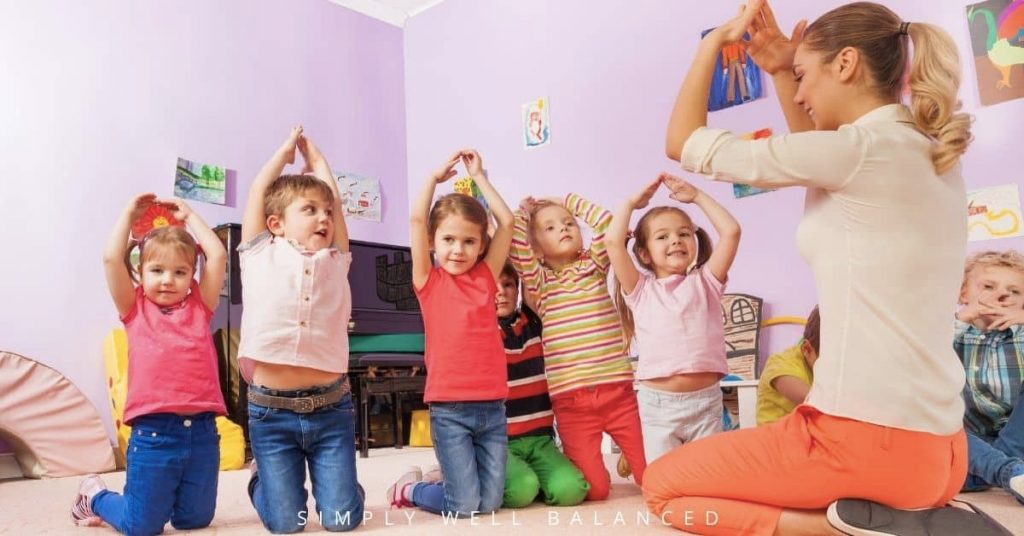
Give the classic game “Simon Says” a social twist to add a fun element to social development activities! Instead of just physical actions, incorporate social actions like “Simon Says give a compliment to someone” or “Simon Says introduce yourself to someone new.”
How it helps: This twist on “Simon Says” injects a dose of social interaction into a familiar game. It allows children to practice important social skills like giving compliments and introducing themselves in a safe and playful environment.
Helping your child develop strong social skills is an important part of their growth. By incorporating fun activities like these into your daily routines, you can equip them with the tools they need to navigate friendships, manage emotions, and build strong relationships. So have fun exploring these activities together and watch your child blossom!
12 Best Pattern Activities for Preschoolers in 2024
15 Best Movement Activities for Preschoolers in 2024
12 Best Activities for Kinesthetic Learners
- Pre-Kindergarten
- Kindergarten
Most Popular

15 Best Report Card Comments Samples

117 Best Riddles for Kids (With Answers)

40 Best Good Vibes Quotes to Brighten Your Day
Recent posts.

50 Best Father’s Day Quotes: Celebrate with Laughter & Love

Math & ELA | PreK To Grade 5
Kids see fun., you see real learning outcomes..
Watch your kids fall in love with math & reading through our scientifically designed curriculum.
Parents, try for free Teachers, use for free

- Games for Kids
- Worksheets for Kids
- Math Worksheets
- ELA Worksheets
- Math Vocabulary
- Number Games
- Addition Games
- Subtraction Games
- Multiplication Games
- Division Games
- Addition Worksheets
- Subtraction Worksheets
- Multiplication Worksheets
- Division Worksheets
- Times Tables Worksheets
- Reading Games
- Writing Games
- Phonics Games
- Sight Words Games
- Letter Tracing Games
- Reading Worksheets
- Writing Worksheets
- Phonics Worksheets
- Sight Words Worksheets
- Letter Tracing Worksheets
- Prime Number
- Order of Operations
- Long multiplication
- Place value
- Parallelogram
- SplashLearn Success Stories
- SplashLearn Apps
- [email protected]
© Copyright - SplashLearn

Make study-time fun with 14,000+ games & activities, 450+ lesson plans, and more—free forever.
Parents, Try for Free Teachers, Use for Free
Join Pilot Waitlist

Home » Blog » General » Effective Social Problem Solving: Free Worksheets and Resources

Effective Social Problem Solving: Free Worksheets and Resources
As a Speech Language Pathologist and Social Emotional Learning expert, I understand the importance of developing social problem solving skills in individuals of all ages. These skills not only help us navigate through various social situations, but also contribute to our overall emotional well-being. In this blog post, I will provide you with free worksheets and resources that can assist you in enhancing your social problem solving abilities.
Understanding Social Problem Solving
Social problem solving can be defined as the process of identifying, analyzing, and resolving social conflicts or challenges. It involves a set of cognitive and emotional skills that enable individuals to effectively navigate through social interactions and find appropriate solutions to problems. The key components of effective social problem solving include:
- Identifying the problem: Recognizing and understanding the social issue or conflict at hand.
- Generating possible solutions: Brainstorming and coming up with different options to address the problem.
- Evaluating and selecting the best solution: Assessing the pros and cons of each solution and choosing the most appropriate one.
- Implementing the chosen solution: Putting the selected solution into action.
- Reflecting on the outcome: Evaluating the effectiveness of the chosen solution and learning from the experience.
Developing social problem solving skills has numerous benefits. It enhances our ability to communicate effectively, resolve conflicts peacefully, and build positive relationships with others. It also promotes critical thinking, decision-making, and self-regulation skills.
Free Worksheets for Social Problem Solving
Worksheets are valuable tools in the development of social problem solving skills. They provide structured activities that guide individuals through the problem-solving process and encourage reflection and self-awareness. Here are some free social problem solving worksheets that you can utilize:
- Worksheet 1: Identifying the problem: This worksheet helps individuals identify and define the social problem they are facing. It prompts them to describe the situation, their feelings, and the impact of the problem on themselves and others.
- Worksheet 2: Generating possible solutions: This worksheet encourages individuals to brainstorm and list different solutions to the identified problem. It prompts them to think creatively and consider various perspectives.
- Worksheet 3: Evaluating and selecting the best solution: This worksheet guides individuals in evaluating the pros and cons of each solution generated in the previous step. It helps them weigh the potential outcomes and select the most suitable solution.
- Worksheet 4: Implementing the chosen solution: This worksheet assists individuals in planning and implementing the selected solution. It prompts them to outline the steps they need to take and consider any potential obstacles.
- Worksheet 5: Reflecting on the outcome: This worksheet encourages individuals to reflect on the effectiveness of the chosen solution. It prompts them to evaluate the outcome, identify any lessons learned, and consider alternative approaches for future situations.
Additional Resources for Social Problem Solving
In addition to worksheets, there are various other resources available to support the development of social problem solving skills. These include:
- Websites offering free social problem solving resources: There are several websites that provide free worksheets, activities, and games to enhance social problem solving skills. Some notable websites include EverydaySpeech, Social Thinking, and Teach Starter.
- Books and articles on social problem solving: Many books and articles have been written on the topic of social problem solving. These resources offer in-depth information, strategies, and real-life examples to help individuals improve their skills. Some recommended books include “Social Problem Solving: Theory, Research, and Training” by Norman A. Sprinthall and “The Social Skills Guidebook: Manage Shyness, Improve Your Conversations, and Make Friends, Without Giving Up Who You Are” by Chris MacLeod.
- Online courses and workshops: Online courses and workshops provide structured learning experiences that delve into the various aspects of social problem solving. These resources often include interactive activities, case studies, and expert guidance. EverydaySpeech offers a range of online courses and workshops on social emotional learning, including social problem solving.
Tips for Effective Use of Worksheets and Resources
To make the most of the worksheets and resources available, consider the following tips:
- Setting clear goals and objectives: Clearly define what you hope to achieve through the use of the worksheets and resources. Set specific goals and objectives that align with your needs and desired outcomes.
- Incorporating worksheets into daily routines: Integrate the worksheets into your daily routines and activities. This will help make social problem solving a regular practice and reinforce the skills learned.
- Providing guidance and support during worksheet activities: Offer guidance and support as individuals work through the worksheets. Encourage open discussions, provide feedback, and help individuals reflect on their experiences and learning.
Social problem solving skills are essential for navigating through various social situations and promoting positive relationships. By utilizing free worksheets and resources, you can enhance your social problem solving abilities and improve your overall emotional well-being. Start your EverydaySpeech free trial today to access a wide range of social emotional learning resources, including social problem solving worksheets and online courses. Remember, developing these skills is a lifelong journey, so keep exploring and learning!
Related Blog Posts:
Pragmatic language: enhancing social skills for meaningful interactions.
Pragmatic Language: Enhancing Social Skills for Meaningful Interactions Pragmatic Language: Enhancing Social Skills for Meaningful Interactions Introduction: Social skills play a crucial role in our daily interactions. They enable us to navigate social situations,...
Preparing for Success: Enhancing Social Communication in Grade 12
Preparing for Success: Enhancing Social Communication in Grade 12 Key Takeaways Strong social communication skills are crucial for academic success and building meaningful relationships in Grade 12. Social communication includes verbal and non-verbal communication,...
Preparing for Success: Enhancing Social Communication in Grade 12 Preparing for Success: Enhancing Social Communication in Grade 12 As students enter Grade 12, they are on the cusp of adulthood and preparing for the next chapter of their lives. While academic success...

FREE MATERIALS
Better doesn’t have to be harder, social skills lessons students actually enjoy.
Be the best educator you can be with no extra prep time needed. Sign up to get access to free samples from the best Social Skills and Social-Emotional educational platform.
Get Started Instantly for Free
Complete guided therapy.
The subscription associated with this email has been cancelled and is no longer active. To reactivate your subscription, please log in.
If you would like to make changes to your account, please log in using the button below and navigate to the settings page. If you’ve forgotten your password, you can reset it using the button below.
Unfortunately it looks like we’re not able to create your subscription at this time. Please contact support to have the issue resolved. We apologize for the inconvenience. Error: Web signup - customer email already exists
Welcome back! The subscription associated with this email was previously cancelled, but don’t fret! We make it easy to reactivate your subscription and pick up right where you left off. Note that subscription reactivations aren't eligible for free trials, but your purchase is protected by a 30 day money back guarantee. Let us know anytime within 30 days if you aren’t satisfied and we'll send you a full refund, no questions asked. Please press ‘Continue’ to enter your payment details and reactivate your subscription
Notice About Our SEL Curriculum
Our SEL Curriculum is currently in a soft product launch stage and is only available by Site License. A Site License is currently defined as a school-building minimum or a minimum cost of $3,000 for the first year of use. Individual SEL Curriculum licenses are not currently available based on the current version of this product.
By clicking continue below, you understand that access to our SEL curriculum is currently limited to the terms above.
- Virtual Experiences
- In-Person Experiences
- Hybrid Experiences
- Social Calendar [New]
- Experience FAQ
- Features & Benefits
- How Pricing Works
- Client Testimonials
- Happiness Guarantee
- Blog Articles
- Video Library
- View Experiences
Problem Solving Games, Activities & Exercises for Adults
By: Angela Robinson | Updated: February 13, 2024
Here is our list of the best problem solving games, activities and exercises for adults.
Problem solving games are activities that require players to use critical thinking skills to solve puzzles. Example activities include escape rooms, Sudoku, and murder mysteries. The purpose of these exercises is to sharpen reasoning and decision-making skills in group settings and to do team building with employees.
These activities are a subset of remote team games , found in problem solving books , and are similar to team puzzles , team building brain teasers and team riddles .

This article contains:
- team building problem solving activities for employees
- free problem solving games for adults
- virtual problem solving activities for students
- group problem solving activities
- problem solving team builders
Here we go!
List of problem solving games & activities
From word and number puzzles to role-playing games, here is a list of inexpensive and free problem solving team builders that help groups practice the art of critical thinking and compromise.
1. Espionage! (Team Favorite)

For an exciting game of social deduction, check out Espionage! This thrilling experience will put your team’s wits and instincts to the test.
Espionage! offers the following:
- a 90-minute session led by an experienced host
- undercover teams of agents and spies
- challenging puzzles, tasks, and maneuvers
- team conversations to help uncover secret identities
The best part is we will bring all the necessary game materials to your preferred location. If you are interested in boosting communication and critical-thinking skills within your team, then consider Espionage!
Learn more about Espionage!
2. Art Heist: The Vanishing of Van Gogh (Hosted)

You can turn your team into skilled detectives with Art Heist: The Vanishing of Van Gogh! In this captivating mystery, participants will locate the stolen artwork, The Bedroom .
Key features of this experience include:
- a 90-minute adventure led by a world-class host
- detailed puzzles, clues, and mysteries to unravel
- trails of evidence and hidden secrets
- group discussions to find the art
Additionally, you can include a cocktail kit to spice up your event. Through Art Heist, you will enhance your team’s ingenuity and problem-solving skills!
Learn more about Art Heist: The Vanishing of Van Gogh .
Get our free team building toolbox
- icebreaker games
- bingo cards

3. War of the Wizards (Popular)

With War of the Wizards, teams roleplay as minions of powerful wizards to vanquish forces of evil. Participants will play thrilling games and go on a quest to restore harmony to the realm!
War of the Wizards offers the following:
- a 90-minute journey guided by a distinguished host
- immersive storytelling that transports players into a magical realm
- engaging activities like world-building, role-playing games, and storytelling
- opportunities for forming alliances, facing challenges, and going on quests
Through the power of imagination and teamwork, your team can overcome tasks and participate in an epic fantasy battle. To improve communication and bonds, include War of the Wizards in your agenda!
Learn more about War of the Wizards .
Sudoku is one of the most popular free problem solving games for adults. The objective of this game is to fill each box of a 9×9 grid so that every row, column, and letter contains each number from one to nine. The puzzle makes a great team challenge. To play Sudoku on Zoom, screen share the game board. Then, turn on the annotation features. Using the add text functions, participants can fill in the numbers on the grid.
We made a starter puzzle you can use in your next meeting or virtual team bonding session:

Here are more online Sudoku puzzles .
5. Crossword puzzles
Crossword puzzles are word games that ask players to fill in words based on clues. Words interconnect, and players must think critically about the surrounding words to select the right phrase for the space.
You can use an online crossword puzzle maker to create a custom puzzle. Here are a few themes you may want to consider:
- teammates’ tastes and interests
- company knowledge and history
- industry terms and trends
Or, create a miscellaneous puzzle just for fun.
We made a sample puzzle you can use for your game:

To complete puzzles during online meetings, you can use the share screen function and add text through annotations.
Or, subscribers can play the New York Times’ daily crossword puzzle virtually . Dictionary.com also offers a free daily online crossword puzzle .
Check out more vocabulary games .
6. Online Escape Rooms
Escape rooms are timed games that get groups working together to solve puzzles. Traditionally, players enter a locked room and must complete all puzzles in an hour or two to unlock the door. However, groups can also play escape rooms online.
Digital escape rooms typically come in one of two forms: in a Zoom room and led by a host, or in a choose-your-own adventure format via Google Forms or websites. To play escape rooms virtually, enter a video meeting and follow the prompts, or screen share the Google Form and work out the puzzles together.
Check out our full list of online escape rooms .
7. Murder Mysteries
Murder Mysteries are story-based games that ask players to take on the roles of suspects or detectives while trying to identify a killer. These games often involve reading lines from a script, searching for clues, and occasionally solving puzzles to get hints.
These games make participants pay attention to conversations, analyze other characters’ behavior, and search for hidden meaning in the script. Players must use their powers of observation and logic to unravel the mystery.
Check out our list of Zoom murder mystery games .
8. Treasure Hunts
Treasure hunts are scavenger hunts with intention. While virtual scavenger hunts often ask players to collect random items, treasure hunts require participants to locate clues that lead to other prompts and hints. The game typically ends with players finding a treasure or solving a mystery, sometimes both.
The treasure hunt can have a specific theme such as secret agent missions or a hunt for pirate treasure, or you can run a more general hunt. Teammates can either compete simultaneously via Zoom call, or can play the hunt on an app individually and compete to beat each other’s scores.
Check out our list of treasure hunt apps .
9. Poem or story challenge
Most team building problem solving activities for employees revolve around science, math, and logic. Poem/story challenges rely on writing skills and are sure to appeal to the language lovers on your team.
Each player receives a limited word bank to use to create a story or poem. Then, players have a few minutes to craft their pieces. Afterward, everyone reads out or screen shares their creations.
Here are a few word challenge activities you can do remotely:
- Found poems or stories : Participants make poems or stories out of words they find by visiting websites, searching emails, glancing out the window, or taking a walk or drive around the neighborhood.
- Random word generators : Teammates use a random word generator to populate a word bank, and must use each word in the poem or story.
- Poetry magnets : Group members make poems using poetry magnets. You can send poetry magnet sets to employees and assemble the verses on a cookie pan during a Zoom call. Or, teammates can play with poetry magnets online .
- Page poems: Participants receive one page of a book or magazine, and must make a poem or story by blocking out other words so only the chosen text remains visible. This activity is part storytelling, part art, since story crafters can illustrate the pages as part of the design.
- Ransom note stories or poems : Players cut out letters from magazines and must form new words to make poems and stories. Or, players can receive a mix of random letters, form words, and run the text through a ransom note generator .
These activities are suitable for teams and individual players.
10. Moral challenge
Some problems are ethical rather than factual. Moral judgment plays just as important a role in the decision-making process as technical prowess. Players can flex their moral problem-solving skills by tackling ethical dilemmas or social puzzles.
Here are some social problem solving games online:
- Moral machine
- Scruples – the game of moral dilemmas
- Morality play
To play these games, either download the apps, or pull up the website and then screen share the prompts. These games are best played when discussed as a group, because the more belief systems and opinions, the harder an issue is to resolve. These exercises provide practice for real-life conflict resolution.
You can find similar challenges on our list of online personality tests .
11. Frostbite
Frostbite is a group game that hones team leaders’ communication skills while sharpening teammates’ listening and cooperation skills. The premise behind the game is that a group of explorers gets caught in a snowstorm and must build a shelter. Frostbite has paralyzed the leaders’ hands and snow-blinded the rest of the team. The leader must give the team instructions to build a tent that can resist arctic winds.
To play Frostbite, each teammate wears a blindfold. Then, the leader gives directions. Once the structures are complete, players turn on a fan to test whether tents can withstand the wind.
Frostbite is usually an in-person game, however you can also play virtually. In the remote version of the game, teammates construct tents out of cards and tape, while the leader surveys the scene on screen.
This exercise demonstrates the challenges of leading remotely, as teams need to operate with minimal oversight or supervisor observation. Therefore, instructions need to be clear and direct to be effective.
Check out more team building games .
12. Virtual Hackathons
Hackathons are events where participants have a set amount of time to design and pitch a new product or solution. This type of event originated in the programming world and is often used to create new apps, however you can apply the game to any industry or school subject.
Virtual hackathons are online versions of the event. Teams enter the competition, then work with each other via virtual meeting software or remote work communication platforms to design the solution. At the end of the competition, teams pitch ideas to a panel of judges and a winner is decided.
To run a virtual hackathon, first announce the theme of the event and collect sign-ups. So that no teams work ahead, hint at the general idea of the issue, and only explain the precise problem when the event begins. Then, give teams anywhere from a few hours to a few days to complete the project.
Discover more virtual hackathon ideas .
13. Improv games
Improv games are excellent problem solving activities. These exercises force participants to think and respond quickly to keep scenes moving in a logical and entertaining way.
Here are some good problem solving improv games:
Banned words : Performers cannot say certain words. Scene partners will conceive of situations that encourage the actors to use those words, and the actors must find alternatives, such as using synonyms or taking the scene in a new direction.
Scenes from a chat : Audience gives a suggestion for a scene, and players act the scene out. Though it’s a fictional and often ridiculous scenario, actors must react to the situation and solve the problem in order for the scene to end.
Miracle cure : Miracle cure is a quick-moving exercise that follows a simple format. One player declares, “I have a problem.” Another player responds, “I have a….[random object.]” The first player then replies, “great! I can use the [random object] to….” and describes how they will solve the problem.
Check out more problem-solving improv games .
14. Spaghetti Tower
The spaghetti tower is a classic team building game. Participants gather uncooked spaghetti and marshmallows, and must construct the tallest freestanding tower.
During the in-person version, players must construct one tall freestanding tower. However, for the virtual version of the game, players construct individual towers. You can send groups to breakout rooms for the build, then reconvene in the main room for judging. Teams are judged on three main factors: number of towers, height, and uniformity.
This version of the game not only tests the structural integrity of the tower, but also consistency and quality control. This exercise teaches teams to align and collaborate remotely, and produce a consistent product even when far apart.
15. What Would You Do?
What Would You Do? is a simple situational game that challenges participants to react to different circumstances. To play this game, read prompts one by one, and then ask participants to respond with gameplans. You can use the polling or raise hand feature to vote for the best option.
Here are some problem solving scenarios for adults or kids to use in the game:
- Zombies attack and you have to find a place to hide.
- You are at the zoo and the animals escape. Which one do you try to corral back into the pen first?
- After waiting in line for hours, someone cuts in front of you last minute. The person appears to be visually and hearing impaired, and doesn’t notice your protests. An official announces that due to diminishing supply, this individual will be the last in line to be served.
- You are eating a meal with important clients and/or your partner’s parents, and you want to impress. The individuals make you a dish that does not fit within your dietary restrictions, but you do not speak the same language and cannot explain why you do not want to eat.
- An imposter has infiltrated the organization, who looks, speaks, and behaves exactly like you. How do you convince your peers that you are the original?
For similar dilemmas, check out this list of Would You Rather? questions.
16. Desert Island Survival
Desert Island Survival is a game that challenges players to prioritize. The premise is that players have been stranded on an island, and must decide what order to perform survival steps.
Here are the possible actions:
- Set up shelter
- Explore the island
- Try to signal for help
- Make weapons for self-defense
- Build a raft to escape the island
- Start a fire
- Choose a group leader
- Search for other survivors
All group members must agree on the order of the steps. Players should explain the reasoning for the order of each step while ranking the actions.
Another version of the game involves players receiving a list of 15 to 20 items, and selecting five or so to bring to the island. You can also vary the location of the game, substituting remote islands for destinations like outer space or the distant past.
17. Choose Your Own Adventure
Choose Your Own Adventure stories enable readers to determine the outcome of the story by making decisions. Each action has a consequence that takes the tale in a different direction. Participants can try to guess how the story may unfold by talking through the different choices. When completing the activity in a group setting, the majority of the team must agree on an action before moving forward in the story.
There are a few ways to facilitate these activities online:
- Play an online role playing video game
- Watch an interactive movie like Black Mirror: Bandersnatch
- Read from a Choose Your Own Adventure book on Zoom
- Click through a Choose Your Own Adventure platform
- Create your own story using a Google Form
Whichever way you choose to do the exercise, you can use the screen share feature in your virtual meeting software so that listeners can more easily follow along.
18. MacGyver
MacGyver is a show where the hero escapes sticky situations by improvising tools out of unlikely materials. For example, in one episode the hero makes a telescope out of a newspaper, magnifying lens, and a watch crystal.
To play MacGyver, you can either list three to five objects participants can use, or challenge players to use items that are within arms reach.
Simply state a desired end result, such as “a way to open a locked door,” or “a getaway vehicle,” and then ask teams to explain what they will build and how they will build it. To make the activity more collaborative, you can give teams five or ten minutes in breakout rooms to strategize and design a prototype.
19. Dungeons & Dragons
Dungeons & Dragons is a roleplaying game where players pretend to be magical figures and creatures. One player serves as the dungeon master, who guides the game, while the other players pick characters and make decisions to move the story forward. Upon choosing a course of action, players roll a twenty-sided die to determine whether or not the plan succeeds. The game is story-based, the possibilities are nearly limitless, and truly creative problem solving options arise. Also, since gameplay is mostly verbal, Dungeons & Dragons is an easy activity to do over Zoom.
Here are the basic rules for Dungeons & Dragons .
20. Pandemic
Pandemic is a game that pits players against the forces of nature in a race to contain and control disease outbreaks. At the beginning of the game, each player receives a role such as containment specialist or operations expert. Participants must carry out the duties of their roles by choosing appropriate actions. Pandemic is a great game for groups because each team member has a clear part to play, and players must collaborate and work together instead of competing against each other.
To play the game online, you can use a Pandemic game app , or talk through the exercise while one attendee moves and displays pieces on the board.
Note: The subject of this game might hit too close to home for some players, considering recent history. You can find games with similar mechanics that deal with different subject matter, such as Forbidden Island.
Check out more team building board games .
21. Model UN
Model UN is one of the best virtual problem solving activities for students. This exercise casts participants in the role of international diplomats who must negotiate to solve realistic problems. Each player assumes the role of a country ambassador and must form alliances and propose solutions to solve crises.
Here are some sample Model UN scenarios:
- Human rights violation by powerful country
- Food shortage
- Disease epidemic
- Technology privacy violations
- Civil war branching into surrounding countries
- Natural disasters
Depending on the size of the group, participants either take on the part of an entire government of a country, or play a certain role within the government. To carry out the activity on Zoom, players can take turns giving speeches, message other countries privately via the chat, meet in breakout rooms to form alliances or have more intimate discussions, and use the polling feature to vote on propositions.
If politics does not resonate with your group, then you can alter the exercise by applying the same activity structure to a different theme, such as the Justice League, movie characters, business board members, or reality TV stars.
The main purpose of the exercise is to research, talk through problems, and compromise. As long as these elements are present, then the specifics of the setup do not matter.
There are many types of problem solving activities for adults. You can do online problem solving games, which require a different skill set than in-person problem solving. For instance, communication must be much clearer and more abundant when group members are far apart and unable to demonstrate or pick up physical cues.
Though many problem solving games include props and in-person elements, there are many games you can play together online. These exercises work well as educational tools as well as team bonding accelerators. Upon completion, participants are likely to feel a sense of accomplishment and increased confidence. These games are also great practice for real life conflict resolution, creative thinking and team building.
Next check out this list of connection games , this collection of crime-solving games , and this post with conflict resolution games .
We also have a list of the best decision making books and a list of team building problems for work .
Book wildly fun team building events with expert hosts

FAQ: Problem solving activities
Here are common answers to questions about group problem solving activities.
What are problem solving games?
Problem solving games are challenges that ask players to think critically and use logic to overcome issues or answer riddles. Examples include sudoku, murder mysteries, and spaghetti towers. These games are also known as “problem solving exercises”, “problem and solution games” and “group problem solving activities.”
What are the best problem solving games for groups?
The best problem solving games for groups include online escape rooms, moral challenges, and improv games.
What are some good problem solving team building activities for students?
Some good problem solving activities for students include crossword puzzles, choose your own adventure stories, and model UN.
How do you play problem solving games online?
The best way to play problem solving games online is to join a video call meeting to talk through the issue. Using the screen sharing and digital whiteboard features helps participants visualize the problem more clearly. Breakout rooms give teams the chance to discuss the issue more intimately.

Author: Angela Robinson
Marketing Coordinator at teambuilding.com. Angela has a Master of Fine Arts in Creative Writing and worked as a community manager with Yelp to plan events for businesses.
You missed chess… Now that’s problematic!
Leave a Reply Cancel
Your email address will not be published.

Marketing Coordinator at teambuilding.com.
Angela has a Master of Fine Arts in Creative Writing and worked as a community manager with Yelp to plan events for businesses.
- 45,000+ clients including Apple, Amazon, Google and NASA
- 50,225+ five star reviews on Google
- #15 on Inc 5000's List of Fastest Growing Private Companies in America for 2022
- 80+ happy remote employees
We lead wildly fun experiences for teams with 1,000,000+ players to date.

4.96 / 5.0 rating on
50,225 Google Reviews
Get our free team building tool box
$49 value at no cost..
- May as well check it out?
- 100+ tested icebreaker questions
- 24+ themed Bingo generators
- 5+ PDFs (including the 8% Rule)
- 2024 team building calendar and more...

Enter your email for instant access

- ELEMENTARY TEACHING , SOCIAL EMOTIONAL LEARNING IN THE CLASSROOM

SEL Problem Solving: How to Teach Students to be Problem Solvers in 2024
If you are an elementary teacher looking to learn how to help your students solve problems independently, then you found the right place! Problem solving skills prepare kids to face dilemmas and obstacles with confidence. Students who have problem solving skills are more independent than students who do not. In this post, we’ll go into detail about what problem solving skills are and why they are important. In addition, we’ll share tips and ideas for how to teach problem solving skills in an elementary classroom setting. Read all about helping students solve problems in and out of the classroom below!
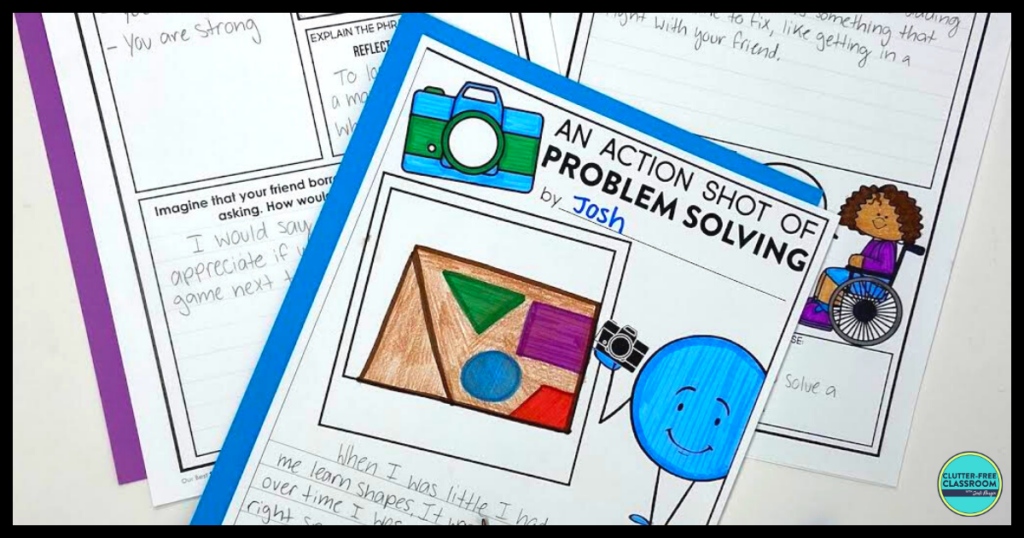
What Does Solving Problems Mean?
Solving problems means brainstorming solutions to the problem after identifying and analyzing the problem and why it occurred. It is important to brainstorm different solutions by looking at all angles of the problem and creating a list of possible solutions. Then you can pick the solution that fits the best.
Why is it Important for Kids to Solve Problems?
It is important for kids to solve problems by brainstorming different solutions so that they can pick the best solution. This teaches them that there can be many different solutions to a problem and they vary in effectiveness. Teaching kids to solve problems helps them be independent in making choices.
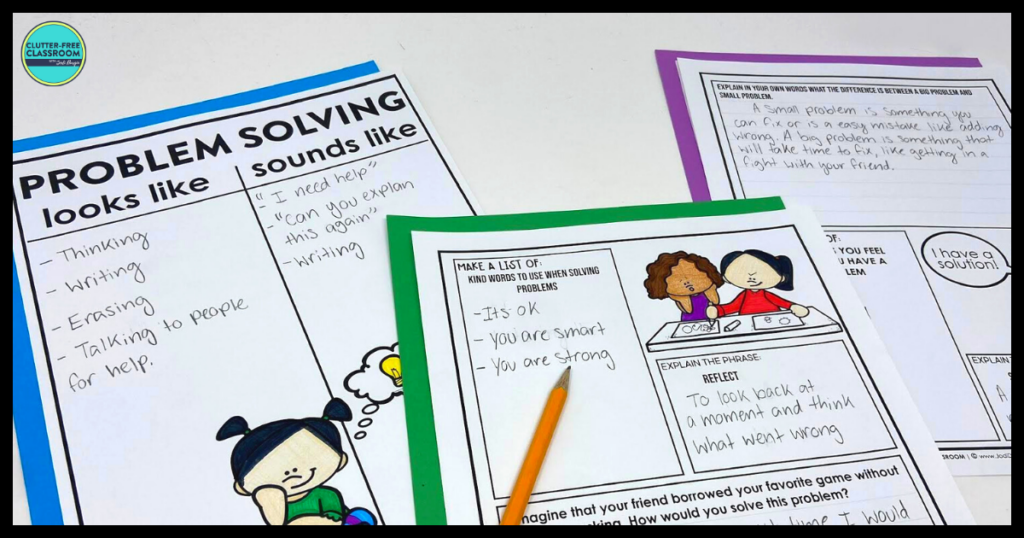
How Do I Know If I Need to Teach Problem Solving in My Classroom?
The students in your 1st, 2nd, 3rd, 4th or 5th grade classroom would benefit from problem solving lessons and activities if any of these statements are true:
- Student confidence is lacking.
- Students are getting into conflicts with each other.
- They come to you to solve problems they could have solved on their own.
- Students are becoming easily frustrated.
- Recess is a hard time for your class.
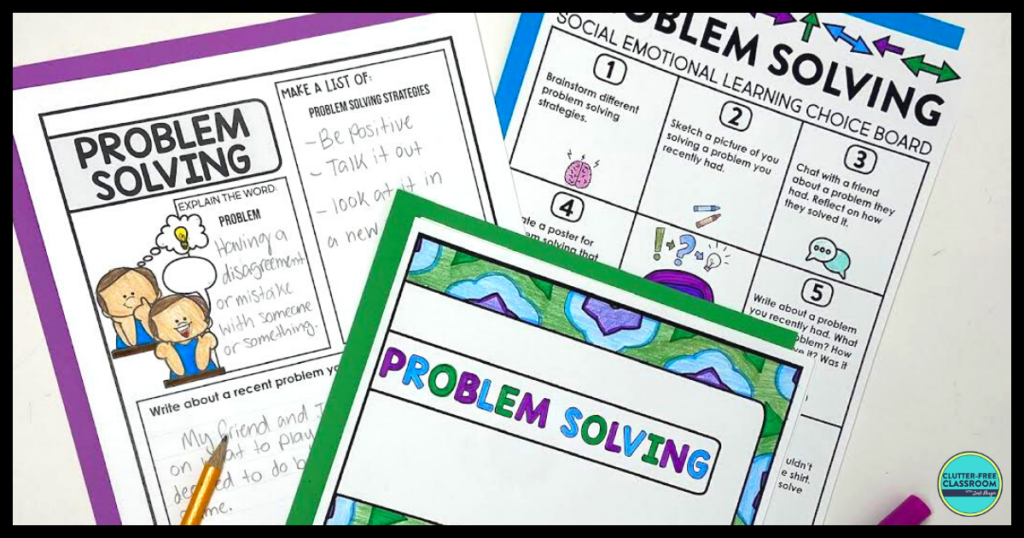
5 Reasons To Promote Problem Solving In Your Elementary Classroom
Below are 5 reasons to promote problem solving in your elementary classroom.
1. Problem solving builds confidence
Students’ confidence will grow as they learn problem solving skills because they will believe in their own abilities to solve problems. The more experience they have using their problem solving skills, the more confident they will become. Instead of going to others to solve problems for them, they will look inside themselves at their own abilities.
2. Problem solving creates stronger friendships
Students who can problem solve create stronger friendships because they won’t let arguments or running into issues stop them from being friends with a person. Instead they work with their friend to get through their problem together and get through the bump in the road, instead of giving up on the friendship.
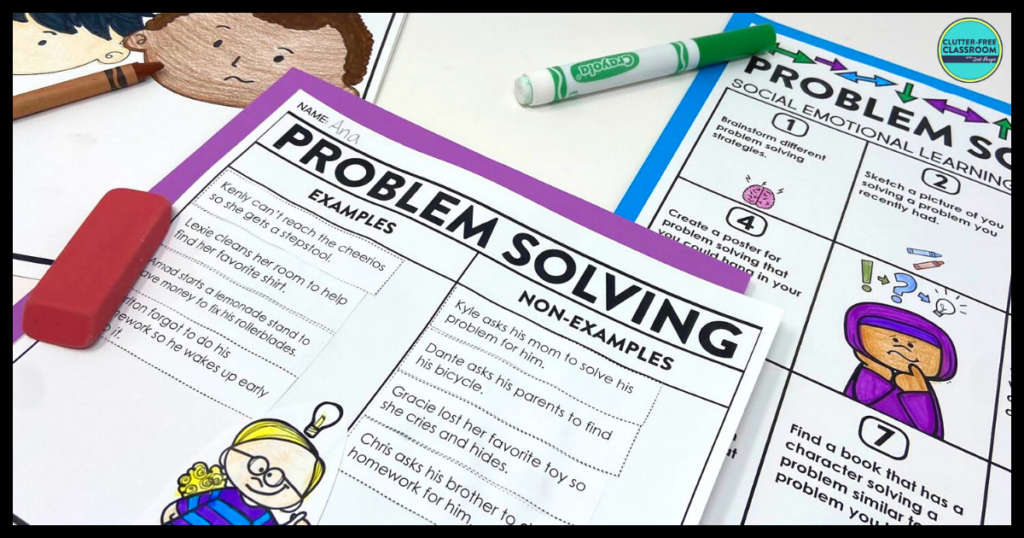
3. Problem solving skills increase emotional intelligence
Having emotional intelligence is incredibly helpful when solving problems. As students learn problem solving skills, they will use emotional intelligence to think about the feelings of others involved in the conflict. They will also think about how the problem is affecting others.
4. Problem solving skills create more independent kids
Students who can problem solve become more independent than kids who cannot because they will try to solve their problems first instead of going to an adult. They won’t look at adults as being the only people who can solve their problems. They will be equipped with the skill set to tackle the problems they are experiencing by themselves or with peers. However, it is important to make the distinction with kids between problems they can solve on their own and problems they need an adult for.
5. Teaching problem solving skills causes students to be more reflective
Reflecting is part of the problem solving process. Students need to reflect on the problem and what caused it when deciding how to solve the problem. Once students choose the best solution to their problem, they need to reflect on whether or not the solution was effective.
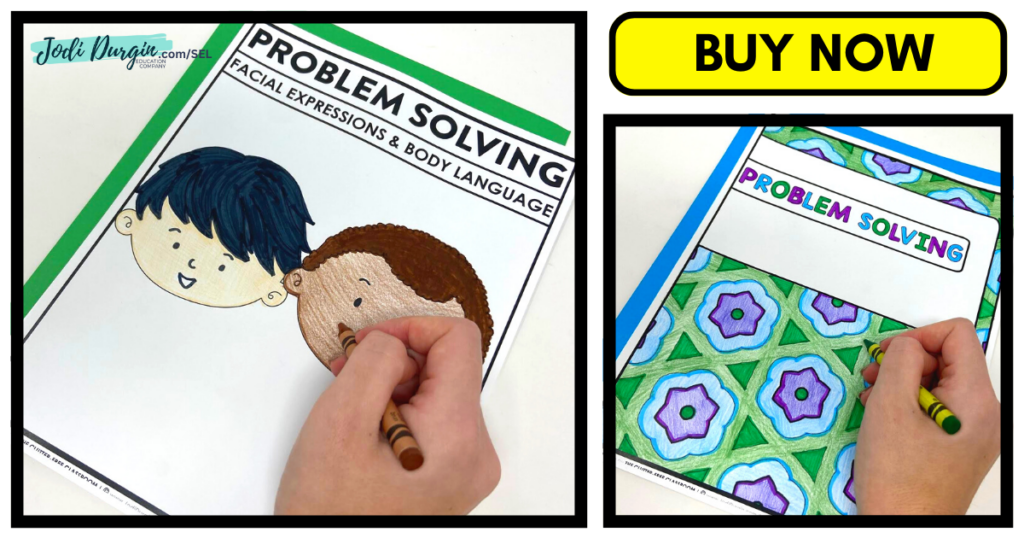
5 Tips and Ideas for Teaching Problem Solving Skills
Below are tips and ideas for teaching problem solving.
1. Read Aloud Picture Books about Problem Solving Skills
Picture books are a great way to introduce and teach an SEL topic. It gets students thinking about the topic and activating their background knowledge. Check out this list of picture books for teaching problem solving skills !
2. Watch Videos about Problem Solving Skills
There are tons of free online videos out there that promote social emotional learning. It’s a fun and engaging way to teach SEL skills that your students will enjoy. Check out these videos for teaching problem solving skills !
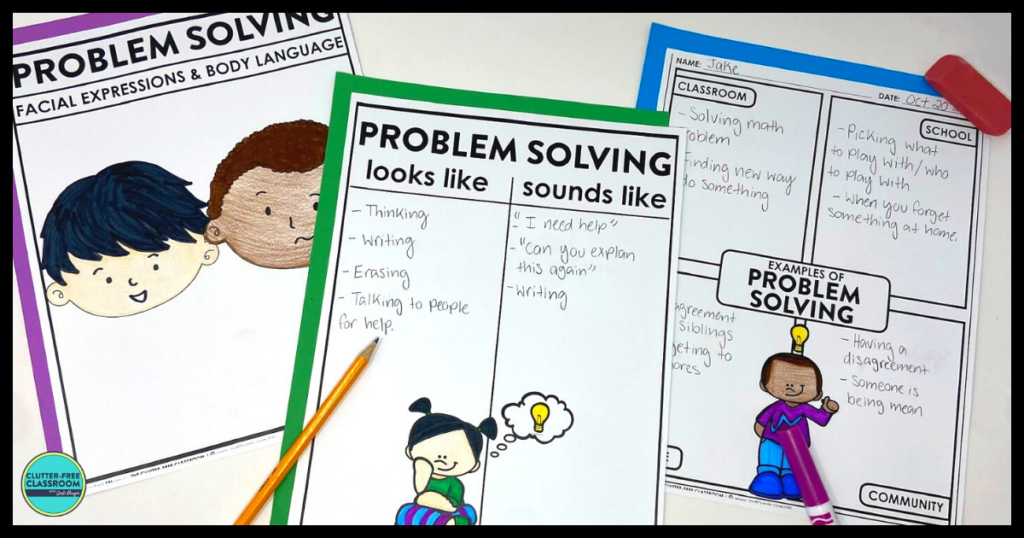
3. Explicitly Teach Vocabulary Related to Problem Solving Skills
Vocabulary words can help students develop understanding of problem solving and create connections through related words. Our problem solving SEL unit includes ten vocabulary cards with words related to the SEL topic. It is important for students to be able to see, hear, and use relevant vocabulary while learning. One idea for how to use them is to create an SEL word wall as students learn the words.
4. Provide Practice Opportunities
When learning any skill, students need time to practice. Social emotional learning skills are no different! Our problem solving SEL unit includes scenario cards, discussion cards, choice boards, games, and much more. These provide students with opportunities to practice the skills independently, with partners or small groups, or as a whole class.
5. Integrate Other Content Areas
Integrating other content areas with this topic is a great way to approach this SEL topic. Our problem solving SEL unit includes reading, writing, and art activities.
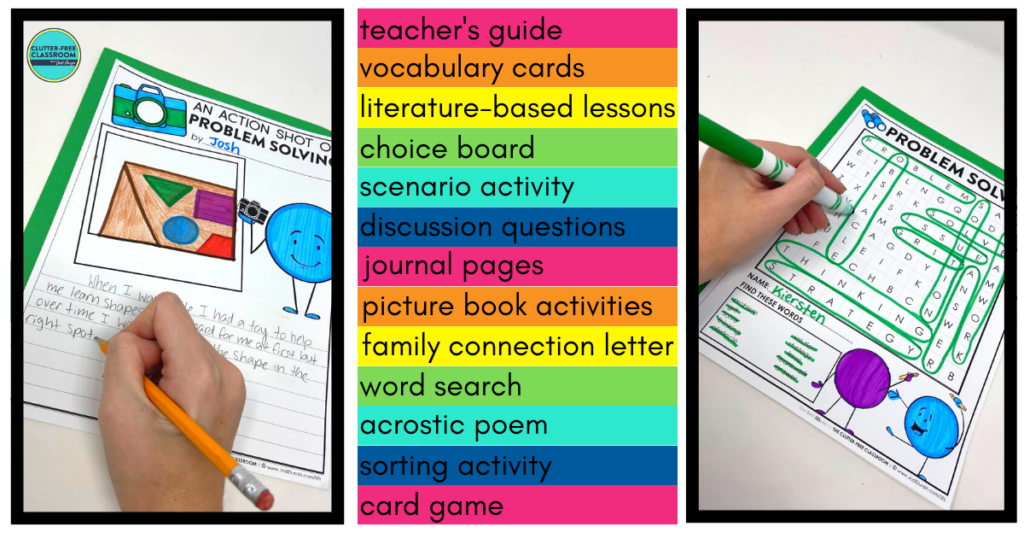
Skills Related to Problem Solving
Problem-solving, in the context of social emotional learning (SEL) or character education, refers to the process of identifying, analyzing, and resolving challenges or obstacles in a thoughtful and effective manner. While “problem-solving” is the commonly used term, there are other words and phrases that can convey a similar meaning. These alternative words highlight different aspects of finding solutions, critical thinking, and decision-making. Here are some other words used in the context of problem-solving:
- Troubleshooting: Identifying and resolving problems or difficulties by analyzing their root causes.
- Critical thinking: Applying logical and analytical reasoning to evaluate and solve problems.
- Decision-making: Considering options and making choices to address and solve problems effectively.
- Analytical problem-solving: Using data, evidence, and systematic thinking to address challenges and find solutions.
- Creative problem-solving: Generating innovative ideas and approaches to overcome obstacles and find solutions.
- Resourcefulness: Finding effective solutions using available resources and thinking outside the box.
- Solution-oriented: Focusing on identifying and implementing solutions rather than dwelling on problems.
- Adaptability: Adjusting strategies and approaches to fit changing circumstances and overcome challenges.
- Strategic thinking: Planning and organizing actions to achieve desired outcomes and resolve problems.
- Systems thinking: Considering the interconnectedness and relationships between different elements when solving problems.
These terms encompass the concept of problem-solving and reflect the qualities of critical thinking, decision-making, and finding effective solutions within the context of social emotional learning (SEL) or character education.
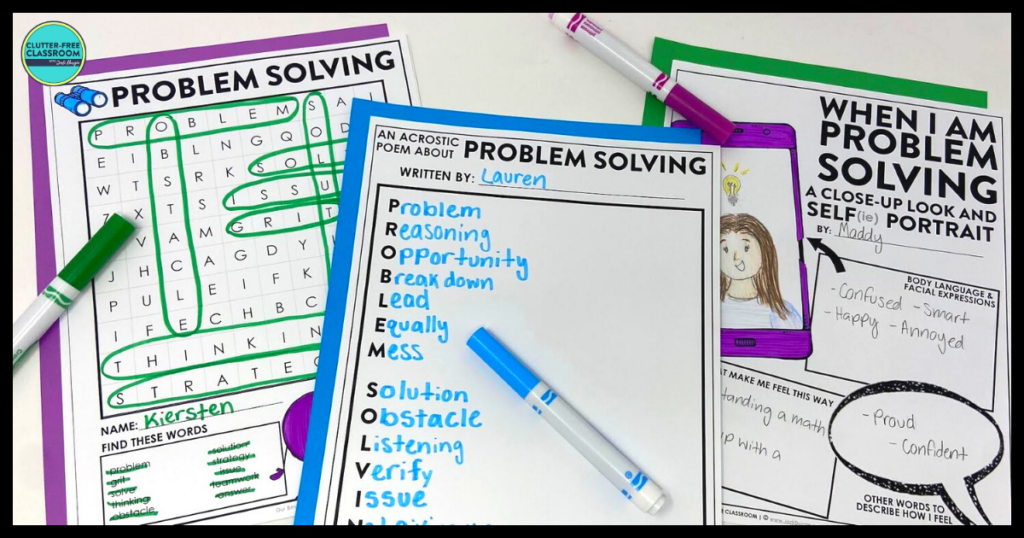
Download the SEL Activities
Click an image below to either get this individual problem solving unit or get ALL 30 SEL units
In closing, we hope you found this information about teaching problem solving skills helpful! If you did, then you may also be interested in these posts.
- SEL Best Practices for Elementary Teachers
- Social Emotional Learning Activities
- 75+ SEL Videos for Elementary Teachers
- Teaching SEL Skills with Picture Books
- How to Create a Social Emotional Learning Environment
You might also like...
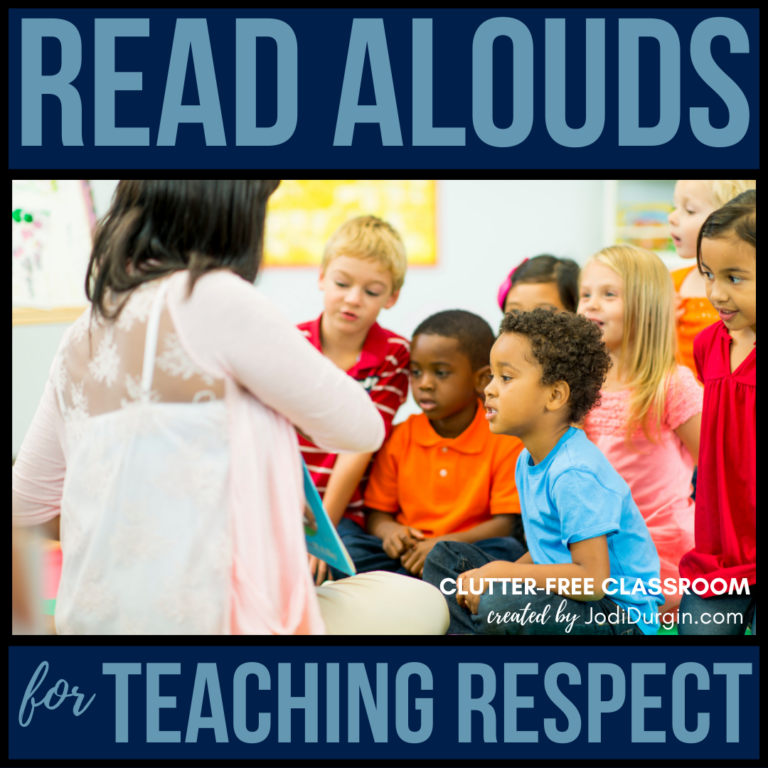
5 Read Alouds about Respect for Elementary Teachers in 2024
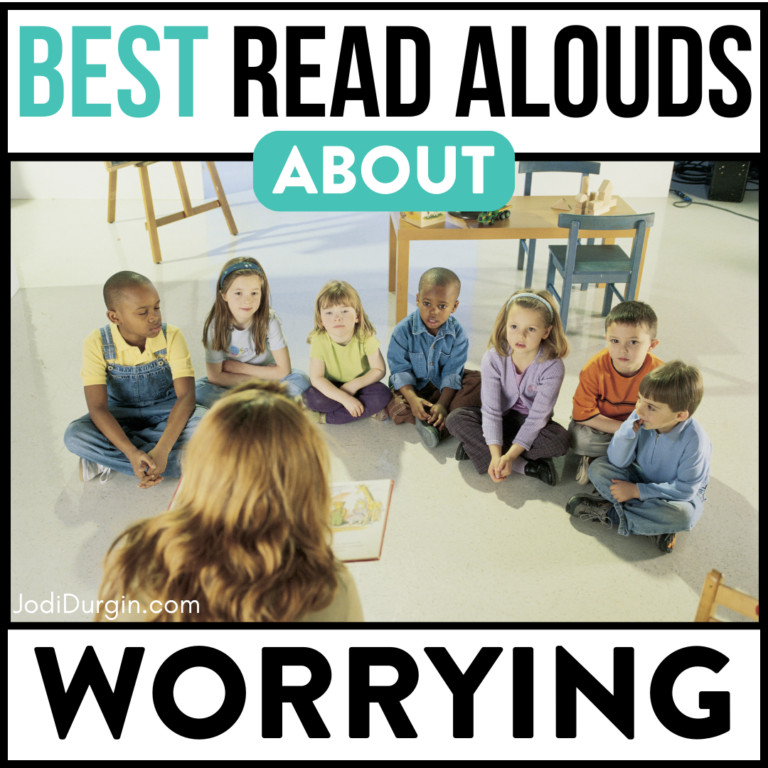
8 Children’s Books about Worrying for Elementary Teachers in 2024
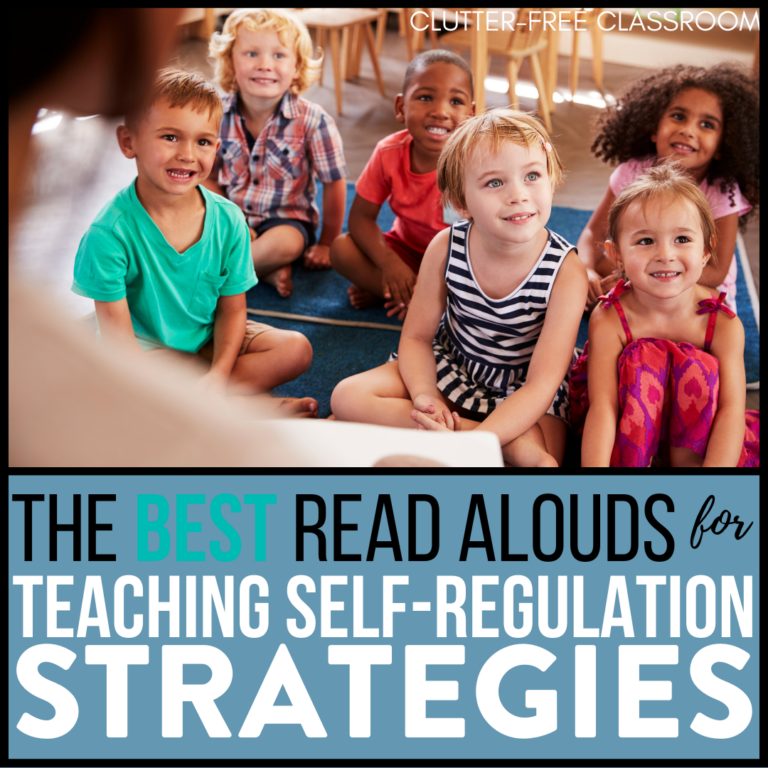
8 Self Regulation Books for Elementary Teachers – 2024
Join the newsletter.

- CLUTTER-FREE TEACHER CLUB
- FACEBOOK GROUPS
- EMAIL COMMUNITY
- OUR TEACHER STORE
- ALL-ACCESS MEMBERSHIPS
- OUR TPT SHOP
- JODI & COMPANY
- TERMS OF USE
- Privacy Policy

ChatGPT for Teachers
Trauma-informed practices in schools, teacher well-being, cultivating diversity, equity, & inclusion, integrating technology in the classroom, social-emotional development, covid-19 resources, invest in resilience: summer toolkit, civics & resilience, all toolkits, degree programs, trauma-informed professional development, teacher licensure & certification, how to become - career information, classroom management, instructional design, lifestyle & self-care, online higher ed teaching, current events, 5 problem-solving activities for the classroom.
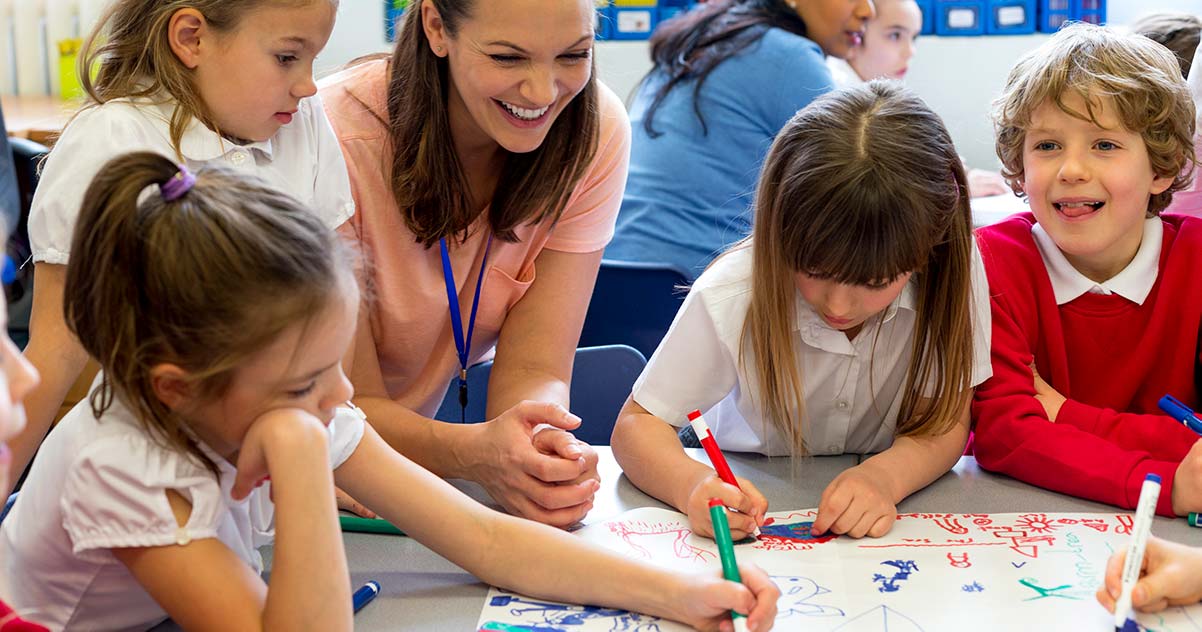
Problem-solving skills are necessary in all areas of life, and classroom problem solving activities can be a great way to get students prepped and ready to solve real problems in real life scenarios. Whether in school, work or in their social relationships, the ability to critically analyze a problem, map out all its elements and then prepare a workable solution is one of the most valuable skills one can acquire in life.
Educating your students about problem solving skills from an early age in school can be facilitated through classroom problem solving activities. Such endeavors encourage cognitive as well as social development, and can equip students with the tools they’ll need to address and solve problems throughout the rest of their lives. Here are five classroom problem solving activities your students are sure to benefit from as well as enjoy doing:
1. Brainstorm bonanza
Having your students create lists related to whatever you are currently studying can be a great way to help them to enrich their understanding of a topic while learning to problem-solve. For example, if you are studying a historical, current or fictional event that did not turn out favorably, have your students brainstorm ways that the protagonist or participants could have created a different, more positive outcome. They can brainstorm on paper individually or on a chalkboard or white board in front of the class.
2. Problem-solving as a group
Have your students create and decorate a medium-sized box with a slot in the top. Label the box “The Problem-Solving Box.” Invite students to anonymously write down and submit any problem or issue they might be having at school or at home, ones that they can’t seem to figure out on their own. Once or twice a week, have a student draw one of the items from the box and read it aloud. Then have the class as a group figure out the ideal way the student can address the issue and hopefully solve it.
3. Clue me in
This fun detective game encourages problem-solving, critical thinking and cognitive development. Collect a number of items that are associated with a specific profession, social trend, place, public figure, historical event, animal, etc. Assemble actual items (or pictures of items) that are commonly associated with the target answer. Place them all in a bag (five-10 clues should be sufficient.) Then have a student reach into the bag and one by one pull out clues. Choose a minimum number of clues they must draw out before making their first guess (two- three). After this, the student must venture a guess after each clue pulled until they guess correctly. See how quickly the student is able to solve the riddle.
4. Survivor scenarios
Create a pretend scenario for students that requires them to think creatively to make it through. An example might be getting stranded on an island, knowing that help will not arrive for three days. The group has a limited amount of food and water and must create shelter from items around the island. Encourage working together as a group and hearing out every child that has an idea about how to make it through the three days as safely and comfortably as possible.
5. Moral dilemma
Create a number of possible moral dilemmas your students might encounter in life, write them down, and place each item folded up in a bowl or bag. Some of the items might include things like, “I saw a good friend of mine shoplifting. What should I do?” or “The cashier gave me an extra $1.50 in change after I bought candy at the store. What should I do?” Have each student draw an item from the bag one by one, read it aloud, then tell the class their answer on the spot as to how they would handle the situation.
Classroom problem solving activities need not be dull and routine. Ideally, the problem solving activities you give your students will engage their senses and be genuinely fun to do. The activities and lessons learned will leave an impression on each child, increasing the likelihood that they will take the lesson forward into their everyday lives.
You may also like to read
- Classroom Activities for Introverted Students
- Activities for Teaching Tolerance in the Classroom
- 5 Problem-Solving Activities for Elementary Classrooms
- 10 Ways to Motivate Students Outside the Classroom
- Motivating Introverted Students to Excel in the Classroom
- How to Engage Gifted and Talented Students in the Classroom
Categorized as: Tips for Teachers and Classroom Resources
Tagged as: Assessment Tools , Engaging Activities
- Online & Campus Doctorate (EdD) in Higher Edu...
- Degrees and Certificates for Teachers & Educa...
- Programming Teacher: Job Description and Sala...
Learn how WRTS and MBRTS are helping with COVID-19. Read here .
Read Our Blog

Social Skills Activities that Teach Kids Problem-Solving
September 22 , 2021.
Social skills activities are important for children of all abilities. With this in mind, We Rock the Spectrum’s Social Skills Blog Series aims to provide insight into activities and practical tips that help instill social skills in children. In this article, we focus on the importance of problem-solving skills in children and introduce five fun and educational activities that can enhance their problem-solving skill set.
Autism Spectrum Disorder is a developmental disability in which children find it difficult to socialize and interact with others. Although autism comes in a variety of forms, many
kids have difficulty developing problem-solving skills. The combination of diminished communication, emotional, and self-regulation skills, all contribute to the child’s reduced skills. To be able to become well-rounded individuals, children of all abilities need to be given the opportunity and resources to learn proper problem-solving skills so that they can face challenges head-on later in life. With this in mind, we have put together a guide on the importance of problem-solving skills for both neurotypical children and children with autism.
Why is Problem-Solving Important?
Problem-solving deals with the ability to make decisions in tough or challenging situations. Children of all abilities need to learn how to properly handle each situation with problem-solving in order to become more independent and resilient. Having good problem-solving skills allow children to gain the patience and self-confidence they need to develop into capable individuals.

Problem-solving activities help children develop the skills they need to efficiently and effectively deal with complex issues and situations. In life, children will run into a variety of situations with differing contexts. Having the proper problem-solving skill set will allow children to learn how to handle every situation with ease. Once a child is able to effectively problem-solve, they will be able to better navigate their own personal problems and those of others as well. Additionally, a child will be able to identify a problem, develop different solutions, test different solutions, and analyze the results.
It is essential for parents or guardians to help boost problem-solving skills through a variety of sensory strategies. Here is a list of 5 fun activities that will teach children of all abilities how to build their problem-solving skills.
5 Activities that Teach Problem Solving
1. problems in a jar.
Problems in a Jar is a fun and creative way for children to explore different situations that can occur in the real world. This activity is designed to help kids generate solutions from one problem or circumstance. To begin, an adult will write one situation on a small sheet of paper, fold it, and place it in a jar. This continues until the jar is full. The child then picks a paper and reads off the problem. He/she must then come up with the best solution that solves the challenging scenario. This helps children think thoroughly about each possible solution independently.
2. Scavenger Hunt
Everyone loves a game of scavenger hunt! This group activity prompts children’s deduction skills based on clues and hints, which in turn, enhances their problem-solving skills. To start, divide children into groups of 2-3 and have them come up with a plan on which members look for which items. Children can also brainstorm together on where each item is located. This helps kids work together towards one goal while also nourishing their communication. Parents can also reward kids with small treats for every item they find on the scavenger hunt.
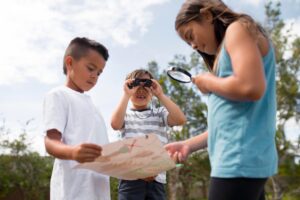
3. Impromptu Skits
Impromptu skits are a fun and engaging way for kids to think independently and with quick reactions. In this activity, children are given one situation wherein they have to reenact how the situation unfolds and how to solve the issue. This allows children to think about how to deal with each situation and see how it can be solved efficiently. After the skit, ask the children to explain their thought processes and correct them if there were any actions that were unnecessary. Children watching the skit will also be able to learn and understand how to best act in certain circumstances.
Puzzles are one of the best ways a child can stimulate their mind. Puzzles have multiple pieces that are all jumbled together. To solve a puzzle, children need to sort the pieces out and place them in their proper areas to be able to put the puzzle back together. This helps children develop memory recall and thought organization. To start off easy, children can work on puzzles with fewer pieces. Once they get the hang of it, they can move on to more difficult and complex puzzles to build their skill set.
5. Play With A Purpose TM
Having a space where your children will feel safe experimenting is vital to developing problem-solving skills quickly. We Rock the Spectrum’s Play With A Purpose™ stimulates and exercises a child’s sight, smell, taste, hearing, touch, vestibular system, and proprioception through positive physical, emotional, and social development. At We Rock the Spectrum, kids are able to play and interact together through arts and crafts, classes, our sensory equipment , and more to strengthen their problem-solving skills in an inclusive, sensory-safe environment.
Key Takeaways
Equipping all children with the proper problem-solving tools and resources at an early age will ensure they develop the skills they need to become versatile individuals. Children who are able to hone their problem-solving skills at their most important phase of development will be able to become more independent and know how to acclimate best to a multitude of situations in the long run. We Rock the Spectrum is a kids gym franchise that offers a wide range of fun and inclusive problem-solving activities through its specialized sensory equipment and Play With A Purpose™ program. Discover more about our mission by getting in touch with us today !
Autism Awareness
Autism resources, birthday parties, classes for kids, dream with dina, our partners, parent's corner, resources team, rockin' events, schools out program, social skills groups, uncategorized, we recommend, we rock care, we rock tarzana, why we rock, may (2023) 1, february (2023) 1, october (2022) 2, september (2022) 15, august (2022) 12, june (2022) 1, february (2022) 1, september (2021) 1, july (2021) 1, march (2021) 1, february (2021) 11, december (2020) 2, june (2020) 1, may (2020) 1, april (2020) 3, march (2020) 4, february (2020) 3, january (2020) 2, december (2019) 2, september (2019) 1, july (2019) 1, may (2019) 1, march (2019) 2, february (2019) 2, august (2018) 1, july (2018) 2, may (2018) 1, february (2018) 1, december (2017) 1, october (2017) 5, august (2017) 2, july (2017) 7, june (2017) 3, may (2017) 3, march (2017) 3, february (2017) 1, january (2017) 2, december (2016) 4, november (2016) 3, july (2016) 1, april (2016) 2, march (2016) 2, february (2016) 2, january (2016) 1, october (2015) 4, september (2015) 4, august (2015) 4, may (2015) 2, january (2015) 1, december (2014) 3, november (2014) 34, october (2014) 4.
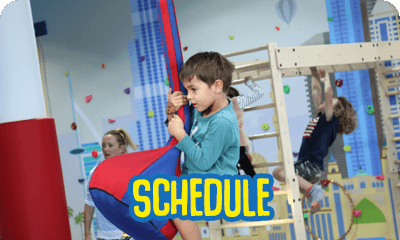
Social Skills Support Groups: 10 Helpful Activities & Games

Social skills can be like second nature, performed effortlessly by some. Other people struggle and feel awkward and out of place, with even basic skills.
This article will explain how well-planned group work can enhance social skills through games and role-play. Practice makes perfect.
Repeated exposure to these activities can support your clients to lead a more positive and fulfilling life in all life domains.
In this article, we will explain the advantages of social skills training in a group setting, ideas of how to support such a group, and various games and role-play activities.
Before you continue, we thought you might like to download our three Positive Relationships Exercises for free . These detailed, science-based exercises will help you or your clients build healthy, life-enriching relationships.
This Article Contains:
Social skills training in groups explained, lesson plans & ideas for support groups, 5 helpful games & activities, 5 role-play activities, positivepsychology.com’s useful tools, a take-home message.
Social skills training (SST) helps individuals improve their social behavior and interactions with others. These interventions focus on both verbal and nonverbal communication (Reichow & Volkmar, 2010).
SST is used in special education, Cognitive-Behavioral Therapy, and even relationship therapy (Beidel et al., 2014). Since SST is also often offered in groups, it begs the question:
How are these groups run precisely?
Key components of SST groups
There is not a standardized format for these training groups. They may comprise between two to six individuals. The groups can be focused on children, adolescents, or adults.
SST tends to last around 12 weeks but may be shorter or longer (Reichow, Steiner, & Volkmar, 2012).
SST groups have several facilitators, which may be psychologists, youth workers, counselors, therapists, or teaching staff. Parents or caregivers can also receive appropriate training to deliver skills to a younger group of children and adolescents (Reichow et al., 2012).
SST groups aim to teach positive social behaviors, verbal and nonverbal communication , interactions, and skills. The groups provide a caring environment where people can learn from encouragement, experience, and practice (Harrell, Mercer, & Derosier, 2009).
Social skills can be developed in the group sessions but should be practiced between sessions to enable success. Those attending the groups need to be willing participants.
SST involves many tasks and activities. There is often work around social competence, problem solving, perspective taking, discussion, friendship skills, theory of mind, and recognizing emotions (Dubreucq, Haesebaert, Plasse, Dubreucq, & Franck, 2021).
Setting up the group
Participants.
The participants of an SST group can be anyone who is negatively affected by feeling different from others, such as an adult with mental health difficulties or a child with autism.
Group members need to be matched in terms of emotional, social, and behavioral needs. If the group members have individual areas of strength, they can act as positive models for other group members.
The group needs to meet at a convenient day and time for all to attend. This should be on the same day each week. Routine helps to cement the importance of the group with a definite time and place in the weekly calendar.
Meeting place
The group needs to meet in a space solely for them, not shared with other activities. The venue should provide confidentiality and security, where the group must not be interrupted, watched by others, or overheard.
Setting up the room
The room needs to be set up in the same manner each time to avoid wasted time and distractions.
A circle of chairs should be organized for the group participants to sit. This enables a safe permeable space with an inside and an outside, allowing focus to shift from person to person.
A poster of the group rules should be displayed each week. Group members must decide on the rules so they feel they have ownership of them.
The consequences of breaking the rules should also be discussed and agreed upon with group members so they do not feel discriminated against if rules are applied.

Each session of an SST group needs to be planned to ensure the group runs well and has a focus. If lessons are not well structured and don’t have a well-planned outline, then members may drop out.
Lessons plans and ideas can incorporate the following topics.
Importance of social skills
This lesson could outline how strong social skills can improve confidence, relationships, and friendships. Improved engagement in education, work, and recreational activities should also be shared in discussion.
The group can also discuss mental and physical health improvements. A short video can help the group understand the importance of good interpersonal skills.
A lesson plan for learning how to share can be based on a brainstorming session on sharing. What does it look like or not look like? The group organizers can demonstrate real-life examples. This may include scenarios about sharing food, ideas, or books.
Scenarios about sharing passwords, revealing or embarrassing requests, and personal and sensitive information are also important. These will illustrate to group members what is not considered good sharing.
Taking turns
People who lack social skills may not understand appropriate turn taking. They may not know how to pay attention to what is going on.
This lesson plan can make use of a jigsaw puzzle and can be helpful for children and adolescents. Each person is given a piece of the puzzle, then they pay attention and wait their turn.
The same can be done with a question-and-answer debate for older groups. Each person is given a sticky note with a number indicating their turn to answer a question.
This lesson will emphasize manners, politeness, and eye contact. This can also be undertaken in role-play activities, discussed later.
Making friends
A lesson plan for teaching the concept of friendship can begin with a brainstorming session of good character traits valued in friends. Three small groups can be formed to do this. Their answers can be shared to note similarities and differences.
A discussion can take place about the role of friends in life. A good discussion point is also the importance of friends and why certain character traits in friends may not be good.
Group members can watch a video to highlight the importance of friendship.
Empathy has an essential role in improving social skills and relationships with others (Bellet & Maloney, 1991). This lesson can focus on differentiating empathy from sympathy using psychological definitions.
This can be followed by a discussion of emotions and their importance in relationships.
Improving eye contact
Eye contact is an important aspect of nonverbal communication (Bellet & Maloney, 1991). Good eye contact helps to build relationships and pick up on nonverbal communication from others. It helps to keep the attention of others, too.
A suitable method for promoting eye contact in group sessions is to place a colored sticker between the eyebrows. This can be undertaken for all group members, drawing attention to the eyes of others when talking.
Understanding body language
A lesson focused on body language activities can be beneficial in improving social skills. In this lesson, group members can learn about cues that they can later master themselves.
Body language uses subtle skills (Tipper, Signorini, & Grafton, 2015). When it is lacking, it gives a signal of being uncommunicative.
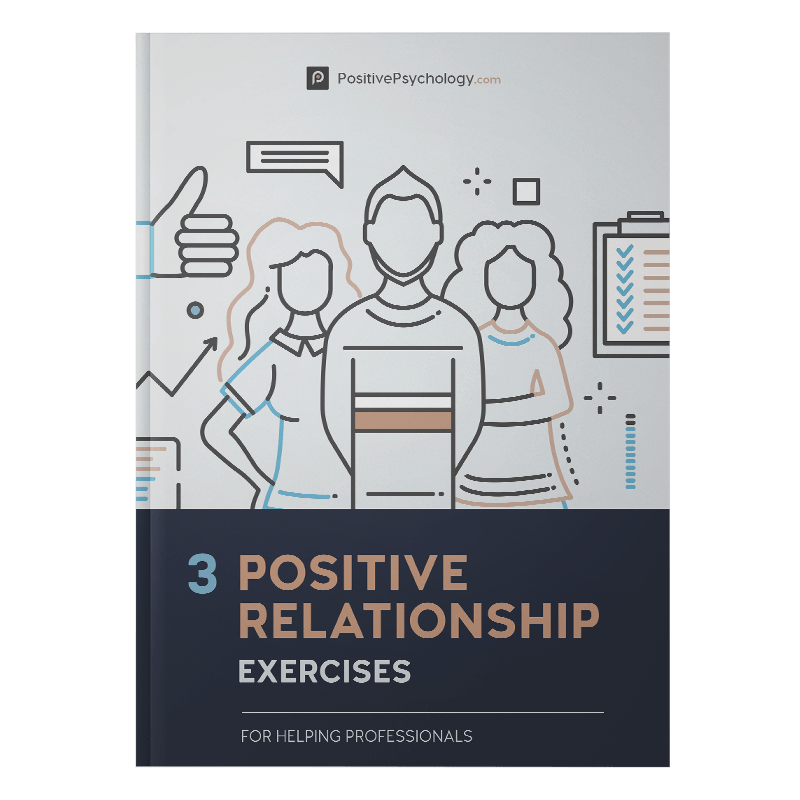
Download 3 Free Positive Relationships Exercises (PDF)
These detailed, science-based exercises will equip you or your clients to build healthy, life-enriching relationships.
Download 3 Positive Relationships Pack (PDF)
By filling out your name and email address below.
- Email Address *
- Your Expertise * Your expertise Therapy Coaching Education Counseling Business Healthcare Other
- Email This field is for validation purposes and should be left unchanged.
There are several fun therapy games and activities that can develop good social skills. These can be repeated again and again to improve your client’s confidence.
The blindfold walk
This is a fun game that can be played with all ages and groups. To do it, you’ll need a blindfold, several obstacles (chair, stool, table), open space to move in, and some musical instruments.
The group members work in pairs: a leader and a follower. The follower is blindfolded, and the leader guides them. The rest of the group makes noise with the instruments to guide the follower.
There should be no talking in this game. A different instrument sound will indicate a different way to walk (left, right, backward, or straight ahead). Adding a timing element to the task makes it even more exciting to see which couple finishes quicker.
As the couples have to work together, this game also promotes cooperation, active listening , problem solving, and trust in social interactions.
Introduction game
Introducing yourself to another person can be very anxiety provoking for someone with little confidence. People with poor social skills may not know how to do this. An introduction can be fun and build trust , a sense of identity, and belonging.
In the introduction game, all group members say their name followed by an action, such as two taps of the foot and a bow. Then the other members repeat the person’s name and the action. This continues (adding consecutive names and actions as you go, or not) until everyone has had a turn.
Two truths and a lie
Another easy group game involves each person telling two truths and one lie about themselves, such as ‘I was born in Germany; I love to eat spaghetti; I cycle 10 miles every week.’ Everyone else has to work out which statement is the lie.
Character analysis
The character analysis activity involves groups of three to four members discussing a character in a book or a movie. The group facilitator will provide the group with a book or a movie to watch and identify the character to discuss in smaller groups.
Group members will need to discuss the character’s traits, strengths, difficulties, and how the character changes over time. Each small group prepares a brief presentation that outlines how the character has demonstrated good and poor social skills and has (or hasn’t) improved.
You have something I would like
This activity involves requesting something. The activity can include group members being split into pairs.
One of the group members has an object, like a ball or a book. The other group member has to persuade the person with the object to give it to them. This activity focuses on using persuasion techniques, politeness, and compliments to gain the item. This activity allows group members to experience emotions involved in social interactions, such as pleasure, rejection, happiness, and sadness.

Role-play is undertaken in a neutral environment and allows group members to test out a situation. Group members can consider different perspectives, develop empathy, solve problems, and explore new ideas.
The following five role-play activities can be used within groups to promote social skills. These are adapted from the social skills training program from the Center for Clinical Interventions for people with mental health difficulties.
Walking your dog
In this role-play, one group member pretends they are walking their dog and bumps into another dog walker they do not know. The two dogs appear to like each other. The first dog walker has to play an active role and ask questions of the second dog walker.
The facilitator can intervene when needed and ask open-ended questions to draw the conversation out. This activity shows group members how to start a conversation with new people and allows friendships to develop from new encounters.
Meeting an old friend
This role-play involves a group member going into a restaurant and seeing someone they have not seen for a long time. The other person asks if they would like a coffee, and then the two sit down to catch up.
The group member needs to ask questions about what the old friend has been doing since they saw them last. There will be a mix of good and bad news. This will test the group members’ listening skills and ability to hold a conversation, respond appropriately with empathy if there is bad news, and use paraphrasing skills.
Ability to say no
People with poor social skills often lack assertiveness (Ames, Lee, & Wazlawek, 2017). This role-play tests the ability to say no. The group member pretends a persuasive seller approaches them. This role-play tests the group members’ ability to refuse politely, resist persuasion, assert themselves, and leave the situation.
Plans for Friday night
This role-play involves planning to go out on Friday night with a friend, coordinating plans and weighing options. This activity tests listening skills and compromise when reaching an agreement.
Making friends in a new job
Another role-play practices initiating conversation and communication skills with an unfamiliar person using the ARE method: anchor, reveal, and encourage (Fleming, 2013).
This role-play concerns starting a new job and wanting to get to know colleagues and make friends. The group member imagines walking into work one morning and initiating conversation with a new colleague. The group facilitator can intervene with additional questions to combat silence.
Social skills everyone should know – Science of People
At the core of improving social skills is building positive relationships and increasing emotional wellbeing.
The Positive Relationships Masterclass is a powerful tool to help others move toward increasing their life satisfaction. Through this masterclass, you will learn about the fundamental principles of relationships and how to help others establish the key skills of building supportive connections with others.
If you have enjoyed reading this article, you may wish to look at Social Skills Training for Adults , an article that also has strategies and training ideas for developing social skills in adults. The article contains interesting videos and podcasts that can demonstrate social skills being tested out in different situations.
The Social Skills Training for Kids article can be beneficial if you are working with toddlers, children, or teenagers. It includes several lesson plans, activities, and online and board games you can use to enhance their social skills.
If you’re looking for more science-based ways to help others build healthy relationships, this collection contains 17 validated positive relationships tools for practitioners. Use them to help others form healthier, more nurturing, and life-enriching relationships.
The following social skills worksheets are also useful for improving social skills:
- Starting a Conversation – The ARE Method Initiating conversations with new people can be difficult. The ARE method described earlier is a helpful way of doing this. This worksheet provides examples of how this method can be used to enhance a normal conversation. It can be incorporated into role-play and social skills lessons.
- Different Ways to Say ‘No’ Politely If you want to help clients who are struggling to assert themselves and say ‘no’, this is the ideal worksheet . It will help your clients practice setting boundaries and limits effectively.

17 Exercises for Positive, Fulfilling Relationships
Empower others with the skills to cultivate fulfilling, rewarding relationships and enhance their social wellbeing with these 17 Positive Relationships Exercises [PDF].
Created by experts. 100% Science-based.
We often take social skills for granted, but it certainly does not seem like second nature to some. You may have recognized this in some of your clients.
All is not lost. They can be trained to learn these skills again, and with practice, your clients can experience a more fulfilling life.
This article has shown you how the supportive nature of SST groups can work wonders to facilitate growth and development and improve interpersonal connections.
After reading this article, I hope you agree that these groups are packed full of fun ideas, activities, and role-play. Clients, whether they are young or old, will thoroughly enjoy taking part in these groups. They are theatrical, and clients may see them more like pleasure and recreation than hard work.
We encourage you to explore some of these activities together with your clients. The games, role-play, and exercises will go far to create interesting sessional work and enable your clients to improve their quality of life.
We hope you enjoyed reading this article. Don’t forget to download our three Positive Relationships Exercises for free .
- Ames, D., Lee, A., & Wazlawek, A. (2017). Interpersonal assertiveness: Inside the balancing act. Social and Personality Psychology Compass , 11 (6), 1–16.
- Beidel, D. C., Alfano, C. A., Kofler, M. J., Rao, P. A., Scharfstein, L., & Wong Sarver, N. (2014). The impact of social skills training for social anxiety disorder: A randomized controlled trial. Journal of Anxiety Disorders , 28 (8), 908–918.
- Bellet, P. S., & Maloney, M. J. (1991). The importance of empathy as an interviewing skill in medicine. JAMA , 266(13), 1831–1832.
- Dubreucq, J., Haesebaert, F., Plasse, J., Dubreucq, M., & Franck, N. (2021). A systematic review and meta-analysis of social skills training for adults with autism spectrum disorder. Journal of Autism Developmental Disorder . Advance online publication.
- Fleming, C. (2013). It’s the way you say it: Becoming articulate, well-spoken and clear (2nd ed.). Berrett-Koehler.
- Harrell, A., Mercer, S., & Derosier, M. (2009). Improving the social-behavioral adjustment of adolescents: The effectiveness of a social skills groups intervention. Journal of Child and Family Studies , 18 (4), 378–387.
- Reichow, B., Steiner, A. M., & Volkmar, F. (2012). Social skills groups for people aged 6 to 21 with autism spectrum disorders (ASD). Campbell Systematic Reviews , 8 (1), 1–76.
- Reichow, B., & Volkmar, F. (2010). Social skills interventions for individuals with autism: Evaluation for evidence-based practices within a best evidence synthesis framework. Journal of Autism Developmental Disorder , 40 , 149–166.
- Tipper, C. M., Signorini, G., & Grafton, S. T. (2015). Body language in the brain: Constructing meaning from expressive movement. Frontiers in Human Neuroscience , 9 , 450.
Share this article:
Article feedback
What our readers think.
My name is Huifang Xu, an associate professor (with Ph.D. degree) working for Faculty of Pre-school Education of Beijing Institute of Education, Beijing, China. Our college provides on-job training for teachers in Beijing (Please see my attached CV for more research background and skills..). My daily work is to provide professional support to kindergarten teachers for their professional development. In kindergarten activities, there are always some children with emotional and behavioral problems. Many children’s problems are related to their family rearing environment. Kindergarten teachers hope to help these children as well as to communicate with their parents to support them, but they are short of ways. After reading the therapy skills in your website, I feel that they are exactly the strategies and skills that kindergarten teachers and parents need. I wish I could visit your center for one year to learn more about the therapy. I am sure that my further studies under your guidance will help me achieve my goals. After I finish my study schedule in U.S., I’ll come back to my college to help more teachers and parents.
I will appreciate it very much if you could give me your advice and consideration , and other relevant information
I am looking forward to hearing from you soon.
Sincerely yours,
Hi Huifang,
Thank you so much for your interest in furthering your skills alongside us 🙂 I’d suggest checking out this blog post to learn more about what we do and to get in touch by email if you’re interested in connecting with us.
Look forward to hopefully hearing from you!
– Nicole | Community Manager
very good- informative and also creative aspects
Thank you Sudeesh. I am glad you enjoyed this article!
Let us know your thoughts Cancel reply
Your email address will not be published.
Save my name, email, and website in this browser for the next time I comment.
Related articles
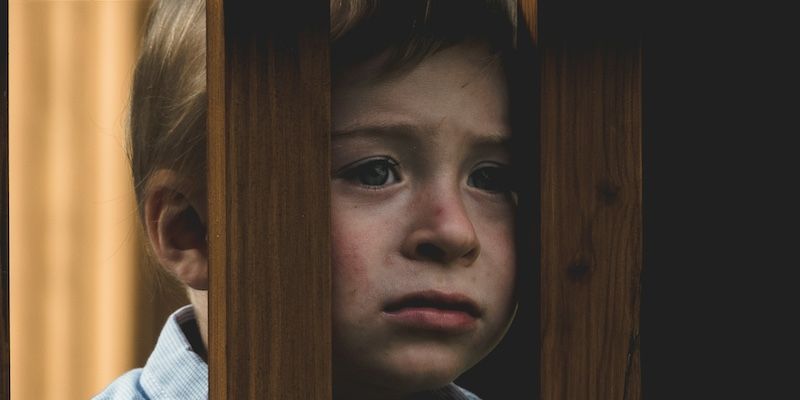
Can a Disorganized Attachment Style Be Overcome?
No individual needs to be defined by the actions or behavior of their parents. However, the attachment strategies we form early in our lives for [...]

Setting Boundaries: Quotes & Books for Healthy Relationships
Rather than being a “hot topic,” setting boundaries is more of a “boomerang topic” in that we keep coming back to it. This is partly [...]

14 Worksheets for Setting Healthy Boundaries
Setting healthy, unapologetic boundaries offers peace and freedom where life was previously overwhelming and chaotic. When combined with practicing assertiveness and self-discipline, boundary setting can [...]
Read other articles by their category
- Body & Brain (49)
- Coaching & Application (58)
- Compassion (25)
- Counseling (51)
- Emotional Intelligence (23)
- Gratitude (18)
- Grief & Bereavement (21)
- Happiness & SWB (40)
- Meaning & Values (26)
- Meditation (20)
- Mindfulness (44)
- Motivation & Goals (45)
- Optimism & Mindset (34)
- Positive CBT (30)
- Positive Communication (21)
- Positive Education (47)
- Positive Emotions (32)
- Positive Leadership (19)
- Positive Parenting (15)
- Positive Psychology (34)
- Positive Workplace (37)
- Productivity (17)
- Relationships (43)
- Resilience & Coping (38)
- Self Awareness (21)
- Self Esteem (38)
- Strengths & Virtues (32)
- Stress & Burnout Prevention (34)
- Theory & Books (46)
- Therapy Exercises (37)
- Types of Therapy (64)

- Phone This field is for validation purposes and should be left unchanged.
3 Positive Relationships Exercises Pack

Home / Programs / Games for social skills | Improve social skills online
social skills Training
Online social skills games.
These research-based games for social skills use animated interactive lessons from “Social Express”, addressing:
- Recognising and coping with feelings such as anger, frustration and sadness
- Participating in groups and conversations
- Respecting personal space
- Interpreting non-verbal communication
- Building friendships with others
- Dealing with peer pressure and teasing

Social Express (Level 1, 2 and 3)
Watch this guided demonstration to see how Social Express uses animated interactive training games to teach social skills, communication and problem solving.
Recommended participation time is at least 3 months per level.

Level 1 | Learn
26 interactive webisodes.
Learn basic social communication & conflict resolution skills Recommended participation time: 3 months

Level 2 | Connect

Level 3 | Engage
27 interactive webisodes.

Social Skills info pack
Everything you need to know about our Social Skills program and games for social skills in one easy package.
social skills Training – FAQs
Do you have a question? Chances are someone has asked it before!
What age are the online social skills games for?
Social Express is aimed at primary school students, although many older students have also enjoyed the content. If you are unsure about your child’s suitability for the program please book a free professional consult.
What does it look like?
Check out the video above to see what the games look like.
Is there a guarantee?
As health and education professionals, we adhere by relevant advertising standards which state we can’t guarantee a certain result (every brain is different!) What we do guarantee is to provide you with awesome, research-backed exercises and professional support to help you progress through the programs. We’re committed to helping you improve your skills and are always here to help throughout your program.
Can I use my NDIS funding?
We can provide NDIS-friendly billing for self-managed and plan-managed NDIS participants. You’ll need to enrol for one month at a time ($150) as this is the maximum we can bill at once. You can either enrol in the social skills program by itself, or add it onto our NDIS course . We typically bill under:
- Capacity Building – Improved Daily Living Other Therapy 15_056_0128_1_3;
- Core – Assistance with Daily Life – Other therapy 01_741_0128_1_3 designed for if CB Daily living budget is exhausted – may need to ask your NDIS planner to allow you to use this item
- Capacity Building – Increased Social and Community Participation – Innovative Community Participation 09_008_0116_6_3
- Capacity Building – Improved Relationships – Individual Social Skills Development 11_024_0117_7_3
Complete this form to set your program up . If you have questions, book a free professional consult to discuss everything first.
When does the course begin and end?
Your course will begin on the day that you choose on your enrolment form and end 1, 3, 6 or 12 months later (depending on your purchased subscription). Your Sonic Learning coach will monitor and adjust your program as needed. You will have unlimited access.
Can I pause my subscription?
Your subscription will begin on the day that you choose on your enrolment form and cannot be paused. If you miss a day don’t worry, you can make it up later on during your subscription. We recommend at least 15 minutes of training, 2 days per week, but you can do as much as you like.
How long will I need to complete the program?
What technology do i need.
You can use a computer with Windows 10 or higher, Mac OS High Sierra and above, or an iPad 4th generation and above via the Social Expresss II app.
How do I enrol in the online social skills games?
You can either enrol online below, or book a professional consult to enrol over the phone.
Enrol in Sonic Learning games for training social skills
What’s included in your course.
- Introductory videos
- You’ll learn everything you need to get started
- 24/7 access for one student
- Access all interactive webisodes in one level at once
- Flexible training protocol
- We recommend 15 minutes per day, 2 days per week
- PDF workbook
- Hundreds of discussion questions and activities to help you get the most out of each webisode
- Monthly coaching call
- Every month your coach will support you with a telephone call to discuss progress and strategies and adjust your program.
- Email support
- Email your coach any time you have a question

Enrolment fees
Choose one month at a time or purchase a 3 month block for a discount.
If you’re already enrolled in Fast ForWord or our NDIS program, contact us to add social skills at a discounted price.
Want to chat first? Book a free professional consult and we’ll help you begin your learning journey.

1 month subscription
$150 / month
$150 upfront payment (or NDIS invoice)
Best for students who would like to try the program before enrolling for longer.
NDIS participants must choose this option as NDIS billing is monthly.

3 month subscription
$125 / month (save $75)
$375 upfront payment
Best for students who would like to work through a whole level.
We recommend completing 2-3 webisodes per week, which will allow you to complete a level in 3 months.
1 month add-on
$90 / month (save $60/month)
$90 upfront payment per month
If you’re already enrolled in Fast ForWord or our NDIS program, you can add social skills for only $90 per month.
Contact us to arrange.
Free phone consultation with a professional
Have a question or want to know more?
Book a free telephone consultation with one of our experienced health professionals to get the advice you need.
Problem Solving Scenarios | Social Skills Activities for Teens

What educators are saying
Also included in.
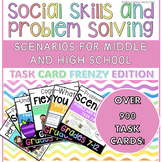
Description
This is an activity pack of 42 problem solving task cards providing difficult social scenarios that students can work through. Practice using and applying problem solving skills to determine what to do in an everyday problem scenario.
This activity can be used for therapy sessions, social skills online groups, teachers, special education teachers and home-schooling parents.
This resource will help students work through the ability to put themselves in a situation, identify (and justify) an appropriate response, and learn to draw upon their own past experiences to apply them to future situations.
Would you rather these cards be in BOOM card format? Click here for the BOOM version of these cards instead.
SAVE TIME SESSION PLANNING!
These task cards will help to take therapy session planning and brainstorming OUT of your hands and should last you several therapy sessions. When mixed with other task card decks or therapy activities , this deck alone should last months for a weekly student!!
Very low prep (print and go, or even just read from your laptop/tablet!). A quick and easy "go to" to pull out from your therapy tool bag!
WHAT'S INCLUDED?
- A printable PDF with 42x task cards 42x different problem solving scenarios
- Coloured AND black and white versions included
WHO IS THIS FOR?
Regular education teachers, special education teachers, SLPs, OTs and other support professionals could all benefit from using these task cards with their students!These cards are specifically designed for middle and high school aged students.
HOW DO I USE THEM?
*These task cards can be used for an individual, a small group or a class*
Individual ideas:
o Side activity during a board game or other therapy activity!
o A “break” between therapy activities if the other activities are worksheet-heavy or targeting another skill!
o Use these cards as a therapy activity itself (I absolutely do!)
o “Warm up cards” for the start of each session.
o Quick assessment of skills.
o Homework.
o Use them as conversation prompts/starters.
You can even use them to simultaneously target additional skills like expressive language, speech, reading comprehension/decoding.
Small group and/or classroom ideas:
o Put the task cards up in different parts of the room (or outside!) and have students walk around with the room with their answer sheets and clip boards.
o Have students get into pairs and talk about their answers and thoughts together.
o Use a card or two each morning as part of a guided class discussion.
o Use the cards as a guide for an open ended quiz. Use the flashcards to ask the class the questions, and get the students to write their answers on a sheet to hand up.
Want this resource, but for your younger students? I've got you covered!
WANT TO ADD MORE TO YOUR "GO TO" TOOL BAG?
The below resources pair very well with this resource!
You can use them together, or one after the other to work on problem solving skills using scenarios for months! No scenarios are the same!
- Is it a big or small problem?
- Predicting consequences
- Do I keep the secret ... or tell an adult?
- Everyday problem solving scenarios set 1 and set 2
WANT A FREEBIE?
First of all, thank you for supporting me and purchasing my resources from my store. As a huge thank you for your support, from me to you, here is a freebie resource just for you! A full, complete resource just for you :)
Let's connect!
Add me on Instagram!
Follow me on Pinterest!
Follow my store to get notifications for new products, sales and freebies!
***Don't forget to leave feedback! Leaving feedback will give you TPT credits that can be used on future purchases!***
Questions & Answers
Misty's speech world.
- We're hiring
- Help & FAQ
- Privacy policy
- Student privacy
- Terms of service
- Tell us what you think

Social Skills Activities For Autism
Unlock social growth through engaging activities! Discover therapeutic and fun ways to nurture autism social skills.

Understanding Autism and Social Skills
Individuals with autism often face unique challenges when it comes to social interactions. Understanding the importance of developing social skills in this population is crucial for their overall well-being and integration into society.
The Importance of Developing Social Skills for Individuals with Autism
Developing social skills is vital for individuals with autism as it helps them navigate social situations, form meaningful relationships, and engage in everyday interactions. Social skills encompass a wide range of abilities, including communication, understanding nonverbal cues, taking turns, and displaying empathy.
By enhancing social skills, individuals with autism can experience improved self-esteem, increased independence, and a greater sense of belonging. Learning to effectively communicate and interact with others opens doors to educational, vocational, and social opportunities.
Challenges Faced in Social Interactions
Individuals with autism often encounter specific challenges when it comes to social interactions. These challenges can vary depending on the individual's unique characteristics and the severity of their autism. Some common challenges include:
- Difficulty with Communication: Many individuals with autism struggle with verbal and nonverbal communication. They may have difficulties expressing their thoughts and feelings, understanding social cues, and engaging in reciprocal conversations.
- Sensory Sensitivities: Sensory sensitivities are common among individuals with autism. Certain sounds, textures, or crowded environments can be overwhelming and impact their ability to engage in social interactions comfortably.
- Social Anxiety: Social anxiety is prevalent among individuals with autism. The fear of judgment, uncertainty about social expectations, and difficulty interpreting social cues can lead to anxiety and avoidance of social situations.
- Limited Perspective-Taking: Individuals with autism often have challenges understanding others' perspectives and emotions. This can hinder their ability to empathize and respond appropriately in social situations.
- Rigid Thinking Patterns: Some individuals with autism display rigidity in their thinking and behavior, making it difficult for them to adapt to social norms and expectations.
Understanding these challenges allows for the development and implementation of targeted interventions and activities aimed at improving social skills and promoting social growth in individuals with autism.
By addressing these challenges and providing appropriate support, individuals with autism can develop and enhance their social skills, leading to more fulfilling and meaningful social interactions.
Therapeutic Activities for Autism Social Skills
Individuals with autism often benefit from therapeutic activities that focus on developing social skills. These activities provide structured and supportive environments for practicing social interactions. Here are three effective therapeutic activities for enhancing autism social skills: role-playing scenarios, social stories and scripts, and video modeling.
Role-Playing Scenarios
Role-playing scenarios involve creating hypothetical situations that individuals with autism may encounter in real-life social settings. These scenarios allow participants to practice social interactions, communication skills, and problem-solving in a safe and controlled environment. Role-playing scenarios can be tailored to specific social situations, such as initiating conversations, making eye contact, or taking turns in a group setting.
The table below provides examples of role-playing scenarios for autism social skills development:
Scenario and Objective
Social stories and scripts.
Social stories and scripts are narrative-based interventions that help individuals with autism understand and navigate social situations. Social stories are personalized short stories that describe specific social scenarios, while scripts provide pre-written dialogue for common social interactions. These resources outline appropriate behaviors, emotions, and expectations, helping individuals with autism learn and apply social skills in various situations.
The table below demonstrates examples of social stories and scripts for autism social skills development:
Social Story and Script Objectives
Video modeling.
Video modeling involves watching recorded videos of individuals engaging in targeted social behaviors and then imitating those behaviors. This technique provides visual cues and concrete examples for individuals with autism to learn and practice social skills. Videos can depict a wide range of social interactions, such as engaging in conversations, demonstrating good sportsmanship, or resolving conflicts.
The table below showcases examples of video modeling scenarios for autism social skills development:
Video Modeling Scenario and Objective
These therapeutic activities provide structured opportunities for individuals with autism to develop and enhance their social skills. By engaging in role-playing scenarios, utilizing social stories and scripts, and practicing video modeling, individuals with autism can gain confidence and competence in social interactions. These activities can be facilitated by parents, caregivers, educators, or therapists, tailoring them to the unique needs and abilities of each individual.
Fun Activities to Enhance Social Growth
Engaging in fun and interactive activities can play a significant role in enhancing social growth for individuals with autism. These activities provide opportunities to practice social skills in a supportive and enjoyable environment. Here are some fun activities that can help foster social development.
Board Games and Group Activities
Board games and group activities are excellent tools for promoting social interaction and communication skills. These activities encourage turn-taking, sharing, and collaboration. They also provide opportunities to practice following rules, expressing opinions, and engaging in friendly competition.
Activity and Skills Developed
Art and creative expression.
Art and creative activities provide a platform for self-expression and social interaction. These activities allow individuals with autism to explore their creativity while practicing important social skills.
Outdoor Play and Physical Activities
Engaging in outdoor play and physical activities not only promotes physical well-being but also provides opportunities for social interaction and skill development. These activities encourage teamwork, cooperation, and the development of social bonds.
By incorporating these fun activities into the lives of individuals with autism, we can create enjoyable learning experiences that nurture social growth. It's important to choose activities that match the individual's interests and abilities, ensuring that they feel motivated and engaged. Remember, every interaction and activity can make a positive impact on the development of social skills for individuals with autism.
Incorporating Technology for Social Skills Development
In today's digital age, technology can play a valuable role in helping individuals with autism develop and enhance their social skills. There are various technology-based tools and platforms available that create engaging and interactive environments for social skills development. In this section, we will explore two effective ways of incorporating technology for social skills development: social skills apps and games, and virtual social groups and platforms.
Social Skills Apps and Games
Social skills apps and games provide individuals with autism a fun and interactive way to practice and improve their social interactions. These apps and games often incorporate visual cues, animations, and scenarios that simulate real-life social situations. They allow individuals to learn and practice various social skills, such as turn-taking, conversation skills, and emotional recognition, in a safe and controlled environment.
Here are a few examples of social skills apps and games:
App/Game and Features
These apps and games can be easily accessed on smartphones, tablets, or computers, allowing individuals to practice social skills anytime and anywhere.
Virtual Social Groups and Platforms
Virtual social groups and platforms offer individuals with autism the opportunity to engage in social interactions in a virtual setting. These platforms provide a safe space for individuals to connect with peers, practice social skills, and build friendships. Virtual social groups often organize structured activities, such as group discussions, collaborative projects, and online events, to encourage social interaction and skill development.
Here are a few examples of virtual social groups and platforms:
Platform and Features
These virtual social environments can be particularly beneficial for individuals who may feel more comfortable or confident engaging in social interactions online.
By incorporating technology into social skills development, individuals with autism can access engaging and interactive tools that facilitate social learning and practice. While technology can be a valuable resource, it is important to remember that it should be used in conjunction with other support systems, such as family involvement and professional therapies, to ensure comprehensive and effective social skills development.
Support Systems for Building Social Skills
To help individuals with autism develop their social skills, it is essential to have a strong support system in place. This support system can consist of family involvement and support, as well as professional therapies and interventions.
Family Involvement and Support
Family involvement plays a crucial role in nurturing social growth for individuals with autism. By actively participating in their loved one's journey, family members can provide a safe and supportive environment for practicing social skills. Some ways in which families can support social skills development include:
- Communication and Understanding: Open and effective communication within the family can foster understanding and empathy. It is important for family members to educate themselves about autism and the specific social challenges their loved one may face.
- Modeling Social Behaviors: Family members can model appropriate social behaviors and communication skills, providing examples for the individual to observe and learn from. This can include demonstrating active listening, turn-taking, and using appropriate body language.
- Creating Social Opportunities: Families can actively create opportunities for social interactions, such as organizing playdates, outings, or joining community groups or clubs that align with the individual's interests. These experiences provide a chance for the individual to practice their social skills in a supportive and familiar setting.
Professional Therapies and Interventions
In addition to family support, professional therapies and interventions are essential for building social skills in individuals with autism. These interventions are often tailored to the specific needs of the individual and may include:
- Applied Behavior Analysis (ABA): ABA therapy focuses on teaching socially significant behaviors through positive reinforcement and systematic teaching methods. ABA therapists work closely with individuals with autism to address specific social skills deficits and help them develop appropriate social behaviors.
- Speech and Language Therapy: Speech and language therapy can be beneficial for individuals with autism who experience challenges in communication and social interactions. These therapists can provide strategies to improve verbal and nonverbal communication skills, such as understanding social cues, initiating conversations, and maintaining eye contact.
- Social Skills Groups: Social skills groups offer a structured and supportive environment for individuals with autism to learn and practice social skills. These groups provide opportunities for interaction with peers who may have similar challenges, allowing individuals to learn from one another and practice social skills in a controlled setting.
- Occupational Therapy: Occupational therapy can help individuals with autism develop the necessary sensory and motor skills required for social interactions. Occupational therapists may work on activities that promote body awareness, coordination, and self-regulation, which can positively impact social skills development.
While each individual with autism is unique, a combination of family involvement and professional therapies can provide a holistic approach to supporting social skills development. By working together, families and professionals can create a nurturing environment that fosters social growth and enhances the overall quality of life for individuals with autism.
https://otsimo.com/en/children-autism-sensory-social-activities
https://awcbehavioralhealth.com/social-skills-activities-for-autism
https://qbssocal.com/social-skills-activities-for-autism
https://www.medicoexperts.com/social-skills-activities-for-autism
Similar Articles
.jpg)
Top 12 ABA Therapy Activities
.jpg)
Are There Free ABA Therapy Services For My Child With Autism?
.jpg)
Ultimate Guide to Autism And Alternative Treatments
.jpg)
Understanding Autism And Biomedical Interventions
.jpg)
In-Depth Guide to Autism And Cognitive BehavioraL Therapy (cbt)
.jpg)
Is There Autism In Europe?
.jpg)
Can Sign Language Help With Autism?
.jpg)
Can You Join The Military With Autism?
.jpg)
Do Autistic People Know Theyre Autistic?

IMAGES
VIDEO
COMMENTS
Social skills activities aim to improve a child's ability to: Actively listen. Communicate. Problem-solve. Take care of themselves and others. Recognize and express their emotions. By engaging in these activities regularly, children improve their social competence and boost their confidence in social settings.
Here are 5 steps to help kids learn social problem solving skills: 1. Teach kids to communicate their feelings. Being able to openly and respectfully share emotions is a foundational element to social problem solving. Teaching I statements can be a simple and effective way to kids to share their feelings. With an I statement, kids will state ...
Social Problem-Solving Skills Games. What Should Danny Do? (3 years and up) Okay, this isn't a game in the traditional sense, but it is too good to be left out of my list. In this interactive book, you help Danny make the best choices for his day. With nine stories in one, you can try out different scenarios over and over to help you create ...
Social Skills Group Activities (6 Board Games) The games target: morals, good manners, empathy, friendship, and emotional skills (showing emotions and managing emotions) Related Reading: Social Skills Games for Kids; 25 Fun Problem-Solving Activities for Kids; Social Skills Activities for Autistic Kids / Kids with Disabilities
PROBLEM SOLVING. Social Problem Solving is the process of changing or adapting to undesirable situations that come up in our day to day life as we engage with others. For young children, the things they consider to be "problems" come up quite often in their interactions with peers and teachers. And even though we may feel that our students ...
71+ Social Problem Scenarios + 6 Blank Scenarios. Use the 71 social problem-solving scenarios to have your students get great experience practicing how to solve a social problem. Also, included are 6 blank scenarios. Then laminate them so you can use them over and over again. Therefore, create social problems that the student experiences and ...
Prior to starting social skills training or activities, the therapist and client should narrow down which areas need help. A therapist can do this by asking the client a series of questions, including: ... Social problem-solving skills for adults with mild intellectual disability: A multiple case study. Behaviour Change, 25(2), 97-108 ...
Embedding problem-solving activities in various subjects: Incorporate problem-solving tasks and discussions into subjects such as language arts, social studies, and science. Encouraging critical thinking and creativity: Promote critical thinking skills by challenging students to think outside the box and come up with innovative solutions.
Have students apply the social problem-solving process to problems that they encounter in school. Go through the social problem-solving steps with students to help them decide on the best solution. Include practice for social problem-solving skills by using activities, games, and role-plays throughout your school day.
Simon Says. Simon Says builds social skills for kids' self-control, listening, and impulse control as they copy their peers' movements and follow instructions. It also helps keep the attention on the game and rewards good behavior for those who follow the rules throughout the game. 11. Rhythm Games.
Here are several games (some I've purchase and some I've developed myself) that target these critical social emotional learning skills: 1. Social Problem Solving Board Game. Why It's Important: Social problem-solving is our ability to understand a social situation and use reasoning to deal with it in the most socially appropriate way. We ...
How it helps: Puppet role-playing allows children to practice problem-solving and communication skills in a safe and controlled environment. By acting out different scenarios, they can explore various approaches to conflict resolution and learn valuable social skills. 5. Building Blocks.
Build skills for social problem-solving by getting your students talking! Use these 100 task cards to highlight social scenarios and situations that teach social emotional skills at the very same time. Your students can discuss and identify how they would solve each situation. The cards are organized into five different sets that target different situations: With friends, with family, in the ...
Integrating social problem solving into everyday activities can help individuals generalize these skills and apply them in various contexts. Here are some examples: Classroom activities: Incorporate social problem solving into group projects, discussions, and conflict resolution exercises.
Free Worksheets for Social Problem Solving. Worksheets are valuable tools in the development of social problem solving skills. They provide structured activities that guide individuals through the problem-solving process and encourage reflection and self-awareness. Here are some free social problem solving worksheets that you can utilize:
4. Sudoku. Sudoku is one of the most popular free problem solving games for adults. The objective of this game is to fill each box of a 9×9 grid so that every row, column, and letter contains each number from one to nine. The puzzle makes a great team challenge. To play Sudoku on Zoom, screen share the game board.
Our problem solving SEL unit includes reading, writing, and art activities. Skills Related to Problem Solving. Problem-solving, in the context of social emotional learning (SEL) or character education, refers to the process of identifying, analyzing, and resolving challenges or obstacles in a thoughtful and effective manner. ...
They can brainstorm on paper individually or on a chalkboard or white board in front of the class. 2. Problem-solving as a group. Have your students create and decorate a medium-sized box with a slot in the top. Label the box "The Problem-Solving Box.". Invite students to anonymously write down and submit any problem or issue they might be ...
How to Help Your Seven-Year-Old Build Social Problem-Solving Skills. At age seven, kids develop stronger and more stable friendships and social conflict among friends becomes inevitable. In fact ...
Social skills activities are important for children of all abilities. With this in mind, We Rock the Spectrum's Social Skills Blog Series aims to provide insight into activities and practical tips that help instill social skills in children. In this article, we focus on the importance of problem-solving skills in children and introduce five fun […]</p>
This article will explain how well-planned group work can enhance social skills through games and role-play. Practice makes perfect. ... There is often work around social competence, problem solving, perspective taking, discussion, friendship skills, theory of mind, and recognizing emotions (Dubreucq, Haesebaert, Plasse, Dubreucq, & Franck ...
Communication Skills: Show children how to express their thoughts, feelings, and ideas clearly and effectively - a vital skill for problem-solving in social situations. Teamwork and Collaboration: Foster the spirit of cooperation by encouraging children to work together on group activities or projects, which helps develop problem-solving ...
These research-based games for social skills use animated interactive lessons from "Social Express", addressing: Recognising and coping with feelings such as anger, frustration and sadness. Participating in groups and conversations. Respecting personal space. Interpreting non-verbal communication.
This is an activity bundle of OVER 900 social scenario task cards providing PLENTY of social skills activities for middle school and high school students. Within this bundle you will target tonnes of different SEL, problem solving skills and general life skills with your older students!The expectat. 25. Products. $63.70 $87.50 Save $23.80.
These scenarios allow participants to practice social interactions, communication skills, and problem-solving in a safe and controlled environment. Role-playing scenarios can be tailored to specific social situations, such as initiating conversations, making eye contact, or taking turns in a group setting. ... Social Skills Apps and Games.
Team building activities are essential tools for enhancing problem-solving skills within a group. By working together on challenges, team members can develop trust, improve communication, and ...